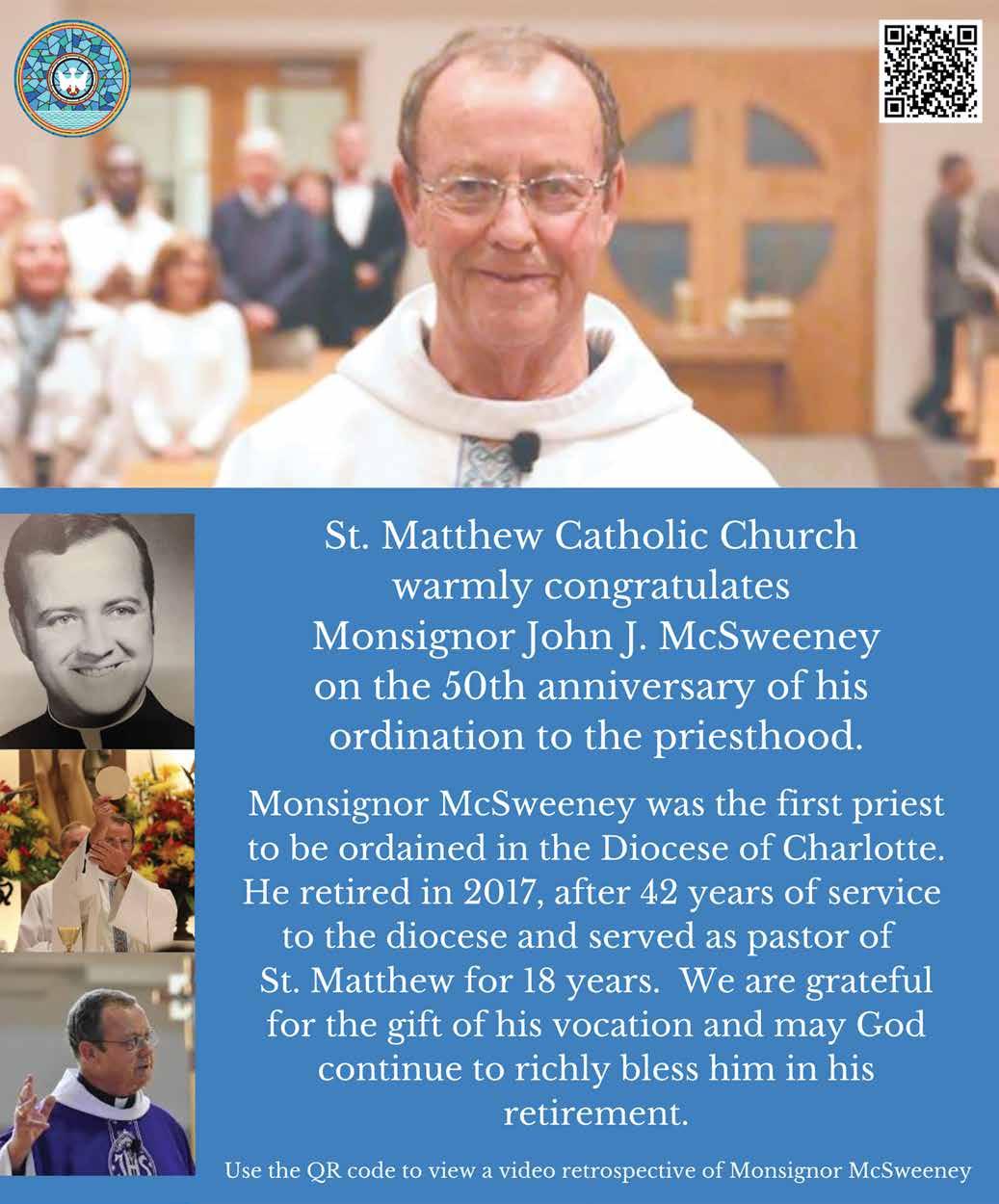


catholicnewsherald.com
charlottediocese.org








catholicnewsherald.com
charlottediocese.org




JUNE 21, 2024
Volume 33 • NUMBER 17
1123 S. CHURCH ST. CHARLOTTE, N.C. 28203-4003 catholicnews@charlottediocese.org
704-370-3333
The Most Reverend Michael T. Martin, OFM Conv. Bishop of Charlotte
INDEX
Arts & Entertainment 11A
Contact us 2A
Español 14-18A
Our Diocese 4-10A
Our Faith 3A
Scripture 3A,17A
U.S. news 19A
Viewpoints 22-23A World news 20-21A
STAFF
ADVERTISING MANAGER: Kevin Eagan
704-370-3332, keeagan@rcdoc.org
HISPANIC MEDIA MANAGER: César Hurtado 704-370-3375, rchurtado@rcdoc.org
MULTIMEDIA DESIGNER: David Puckett
704-808-4521, dwpuckett@rcdoc.org
EDITORIAL TEAM: Kimberly Bender 704-370-3394, kdbender@rcdoc.org Annie Ferguson 704-370-3404, arferguson@rcdoc.org
Troy C. Hull 704-370-3288, tchull@rcdoc.org
Christina Lee Knauss 704-370-0783, clknauss@rcdoc.org
COMMUNICATIONS ASSISTANT/CIRCULATION: Amelia Kudela 704-370-3333, catholicnews@rcdoc.org
COMMUNICATIONS DIRECTOR: Liz Chandler 704-370-3336, lchandler@rcdoc.org
ASSISTANT COMMUNICATIONS DIRECTOR: Patricia L. Guilfoyle 704-370-3334, plguilfoyle@rcdoc.org
THE CATHOLIC NEWS HERALD is published by the Roman Catholic Diocese of Charlotte 26 times a year.
NEWS: The Catholic News Herald welcomes your news and photos. Please e-mail information, attaching photos in JPG format with a recommended resolution of 150 dpi or higher, to catholicnews@rcdoc.org All submitted items become the property of the Catholic News Herald and are subject to reuse, in whole or in part, in print, electronic formats and archives.
ADVERTISING: Reach 165,000 Catholics across western North Carolina! For advertising rates and information, contact Advertising Manager Kevin Eagan at 704-370-3332 or keeagan@rcdoc.org. The Catholic News Herald reserves the right to reject or cancel advertising for any reason, and does not recommend or guarantee any product, service or benefit claimed by our advertisers.
SUBSCRIPTIONS: $16.75 per year for registered families of the Diocese of Charlotte and $25 per year for all others
POSTMASTER: Periodicals Class postage (USPC 007-393) paid at Charlotte, N.C. Send address corrections to the Catholic News Herald, 1123 S. Church St., Charlotte, N.C. 28203.
Day will soon be here, and it can be easy to let the festivities and fireworks distract us from pondering true freedom – the kind of freedom found only in Christ. Jesus told us the truth will set us free (Jn 8:32), and logic leads us to follow Him as the way, the truth and the life (Jn 14:6).

FIND FREEDOM IN HEALING
Scan the QR code for this week’s recommendations:

Attaining true freedom is difficult when wounds keep us from knowing Jesus better. It’s hard to move past these pains when we don’t understand their nature and cause. In “Finding Freedom in Christ: Healing Life’s Hurts,” Dr. Matthew Breuninger lays out six steps to identify and remove barriers to God’s healing grace –freeing us to love God and others. Find this title at the St. Paul Center and major booksellers.
EVENTS
BONFIRE TO DISPOSE OF SACRAMENTALS : 6:15-8 p.m. Saturday, June 22, front lawn of St. Mark Church, 14740 Stumptown Road, Huntersville. Bring your broken/unused sacramentals to be burned and learn more about their proper disposal with Deacon Nicholas Kramer. Bring your own camp chairs and supplies to roast marshmallows and make s’mores.
HOLY HOUR FOR LIFE & SOCIAL, ANNIVERSARY OF DOBBS : 7 p.m. Monday, June 24, St. Patrick Cathedral, 1621 Dilworth Road East, Charlotte. Join fellow Catholics for an hour of prayer commemorating the second anniversary of the Dobbs decision. Stay for a wine and cheese social afterward to celebrate pro-life progress and to be encouraged to continue the work! Families welcome! Cosponsored by the Office of Family Life and C-PLAN. Questions? Email FamilyLife@rcdoc.org.
COMMUNITY BLOOD DRIVE : 8 a.m.-1 p.m. Sunday, June 30, St. Mark Church, 14740 Stumptown Road, Huntersville. Sponsored by the Knights of Columbus. Sign up to donate at www.stmarknc.org/KofC.
CATHOLIC FAMILY DAY AT CAROWINDS Sunday, July 28. Come out for a day of worship, fellowship and fun on Catholic Family Day at Carowinds. Start the day with Mass offered by Bishop Michael Martin in the Carowinds
FIND FREEDOM IN GOD’S MERCY Peace and freedom are often found in forgiving others and seeking forgiveness for our own failings. However, it can be hard to take that first step toward the confessional where Jesus waits for us. Discover the richness of this sacrament of healing in “7 Secrets of Confession,” in which author Vinny Flynn shows how confession offers a true encounter with Christ. If you’re still feeling reluctant, read St. Augustine’s spiritual autobiography “Confessions,” in which he recounts feeling that being free meant doing whatever he wanted, then realizing that he had become a slave to his desires until he found freedom in Christ.
Theater at 9 a.m. before the park opens to the public. Enjoy the rides and all that the park has to offer, and enjoy fellowship with other Catholic families from across the Diocese of Charlotte. Take a break and refuel at an all-you-can-eat picnic lunch in the Grove Picnic Pavilion from noon to 1 p.m. For details and tickets, go to charlottediocese.org/events-calendar.
ST. PEREGRINE HEALING PRAYER SERVICE : 7 p.m. every fourth Thursday of the month, St. Matthew Church chapel, 8015 Ballantyne Commons Pkwy., Charlotte. Includes a blessing with the relic of St. Peregrine. For details, go to www.stmatthewcatholic.org/st-peregrine.
RACHEL RETREAT ‘HEALING AFTER ABORTION’ Are you or a loved one seeking healing from the effects of a past abortion? Find healing and support in a confidential, non-judgmental environment at a Rachel Retreat weekend. These retreats are offered by the Diocese of Charlotte’s Family Life Office for men and women, in English and Spanish. For details, contact Jessica Grabowski at jrgrabowski@rcdoc.org or 704-370-3229.
FIND FREEDOM IN SILENCE
The cacophony of our everyday lives can make it hard to find the freedom Jesus wants us to have. A personal retreat can often be just what the Divine Physician ordered. Allow the quiet to give your mind and heart the space to connect with God in His creation. Try Catholic retreat centers such as Living Waters in Maggie Valley and the Catholic Conference Center in Hickory. Learn more: www.charlottediocese.org/faith-life/retreatsconferences
— Annie Ferguson
Bishop Michael
will participate in the following events:
JUNE 23-25
Province Meeting of Bishops Diocese of Savannah
JUNE 25 – 7 P.M.
Duc In Altum Camp visit
Belmont Abbey College, Belmont
JUNE 26 – 7 P.M.
Confirmation
St. Joseph Church, Asheboro
JUNE 27 – 10 A.M.
St. Bernadette Church, Linville
‘He ascended into heaven’
We have reached the halfway point of our year-long exploration of the Apostles’ Creed with the sixth article: “He ascended into heaven and is seated at the right hand of the Father.”
As a new Christian, the ascension of Jesus often puzzled me. I understood the importance of the Resurrection. As St. Paul rightly says, if Christ is not raised, then our faith is in vain (1 Cor 15:17). But wouldn’t the truth of the Resurrection be easier to demonstrate if Jesus stuck around for future generations to witness? Imagine if our Lord kept office hours in Jerusalem! Wouldn’t it solve so many problems if the Son of God could be directly consulted any time doctrinal questions arose? I never denied the reality of Christ’s ascension, but I did wonder at times just why Jesus had to leave.
JESUS REMAINS WITH US
Of course Jesus didn’t leave – not really. He promised the disciples that He would be with us always, until the end of time (Mt 28:20). We see this promise fulfilled in the Church, and most especially in the Eucharist. In this sacrament Jesus is truly present with us at each Mass and in the tabernacles of every Catholic church on the planet. Jesus’ Presence is much more widespread now in the sacrament than when it was limited to a human body. As it is, I can spend time with Jesus in the Eucharist any time I like – whereas my chances, as one among 1.4 billion Catholics, of a personal meeting with a non-ascended Jesus in His Jerusalem headquarters would be minuscule. Still, it is tempting to think certain things would be easier if the human Jesus were still around to lead the Church directly. But this is a false assumption. The fact is that even if there were a 2,000-year-old Messiah walking the earth today, people would still disbelieve, just as they disbelieved after witnessing with their own eyes the multiplication of the loaves, the healing of the blind and lame, and even the raising of the dead. As Jesus foretold in the parable of Lazarus and the Rich Man: “If they will not listen to Moses and the prophets, neither will they be persuaded if someone should rise from the dead” (Lk 16:31). Jesus told His disciples, “It is better for you if I go” (Jn 16:7). After He said this, He promised to send an Advocate, the Holy Spirit. Nine days after His Ascension, Jesus made good on His promise by sending the Holy Spirit at Pentecost. We will speak more about the Holy Spirit later in this
JUNE 23-29
Sunday (Twelfth Sunday in Ordinary Time): Jb 38:1, 8-11, 2 Cor 5:14-17, Mk 4:35-41; Monday (Solemnity of the Nativity of St. John the Baptist): Is 49:1-6, Acts 13:22-26, Lk 1:57-66, 80; Tuesday: 2 Kgs 19:9B-11, 14-21, 31-35A, 36, Mt 7:6, 12-14; Wednesday: 2 Kgs 22:8-13, 23:1-3, Mt 7:15-20; Thursday: 2 Kgs 24:8-17, Mt 7:21-29; Friday (Memorial of St. Irenaeus, bishop and martyr): 2 Kgs 25:1-12, Mt 8:1-4; Saturday (Solemnity of Sts. Peter and Paul, Apostles): Acts 12:1-11, 2 Tm 4:6-8, 17-18, Mt 16:13-19
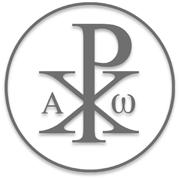
A 12-part series on the Creed
This article is Part 6 in a series exploring the Creed. Look for articles each month in the Catholic News Herald and online at www.catholicnewsherald.com. by Deacon Matthew Newsome
EDITOR’S NOTE
‘It is tempting to think things would be easier if the human Jesus were still around to lead the Church.’
series. For now, let us look at Christ’s Ascension itself.
The Ascension of the Lord is recorded in Mark’s and Luke’s gospels, as well as in the Acts of the Apostles, which says that Jesus “was lifted up and a cloud took him from their sight” (Acts 1:9). The only description the gospels offer is that Jesus was “taken up to heaven” (Mk 16:19 and Lk 24:51). Having risen from the dead, Jesus now rises even further to sit at God’s right hand (Mk 16:19). To sit at the ruler’s right is to sit in the place of honor and power. Thus
Jesus takes His rightful place as the eternal Son of the Almighty God.
The fundamental reason why Jesus didn’t take up long-term residence on this earth is that He doesn’t belong in this fallen world any more than He belonged in the tomb. He belongs in heaven! He descended from heaven for the same reason He descended into hell – for our benefit, out of sheer love for us. “For God so loved the world that He gave His only Son, so that everyone who believes in Him might not perish but might have eternal life” (Jn 3:16).
That same passage in John’s gospel tells us that “just as Moses lifted up the serpent in the desert (a reference to Numbers 21:9) so must the Son of Man be lifted up” (Jn 3:14). This “lifting up” refers not just to the Crucifixion, when Jesus was lifted up on the cross, but to His Ascension, when He is lifted up into heaven. In chapters eight and nine of the Letter to the Hebrews, the biblical author speaks of the high priest offering worship in the sanctuary of the Temple. This earthly sanctuary was but a symbol of heavenly realities. In Christ we have the fulfillment of this symbol. By taking “His seat at the right hand of the throne of the Majesty in heaven,” Christ our High Priest has taken His place as “a minister of the sanctuary and of the true tabernacle that the Lord, not man, set up,” where He lives forever as our intercessor.
HIS DESCENT, ASCENT ARE LINKED
The Ascension of Jesus and His Incarnation are inextricably connected. Scripture says that “no one has ascended into heaven, but he who descended from heaven, the Son of man” (Jn 3:13; Eph 4:8-10). These two events – Christ’s descent and ascent – are part of the same salvific action. We cannot ascend to God ourselves, so God descends to us in order to lift us up to heavenly glory. In other words, the Incarnation is not so much about God coming to earth, but enabling man to go to heaven. Christ’s ascension flows from this as the capstone of this heavenly trajectory. As the Catechism of the Catholic Church puts it, “Jesus Christ, the head of the Church, precedes us into the Father’s glorious kingdom so that we, the members of His Body, may live in the hope of one day being with Him forever” (CCC 666).
DEACON MATTHEW NEWSOME is the Catholic campus minister at Western Carolina University and the author of “The Devout Life: A Modern Guide to Practical Holiness with St. Francis de Sales,” available from Sophia Institute Press.

Praying
There is a prayer for every state of mind and spiritual need in the Book of Psalms, Pope Francis said.
“There are many psalms that help us forge ahead. Get into the habit of praying the psalms. I assure you that you will be happy in the end,” the pope said during his June 19 general audience.
During his main catechesis, the pope continued his series on the Holy Spirit and highlighted the importance of prayer, especially in preparation for Holy Year 2025.
All the books of the Bible are inspired by the Holy Spirit, he said, “but the Book of Psalms is also so in the sense that it is full of poetic inspiration.”
The psalms were the prayer of Jesus, Mary, the Apostles and all previous Christian generations, he said. Jesus enters into the world with a verse from a psalm in his heart, “I delight to do your will, my God (Ps 40:9), and he leaves the world with another verse, “Into your hands I commend my spirit” (Ps 31:6).
“Do you pray with the psalms sometimes?” the pope asked, reminding people that there are special editions that contain the New Testament and the psalms together.
“I have on my desk a Ukrainian edition” of the New Testament and the psalms that belonged to a soldier who died in the war, he said. “He used to pray at the front with this book,” referring to the 23-year-old soldier named Oleksandr.
“If there are psalms, or just verses, that speak to our heart, it is good to repeat them and pray them during the day. The psalms are prayers ‘for all seasons’: There is no state of mind or need that does not find in them the best words to be transformed into prayer,” he said.
The psalms also allow the faithful to expand on the nature of their prayers, he said, so prayers are not just a series of requests and a continuous “give me, give us.”
JUNE 30-JULY 6
Sunday (Thirteenth Sunday in Ordinary Time): Wis 1:13-15, 2:23-24, 2 Cor 8:7, 9, 13-15, Mk 5:21-43 or 5:21-24, 35b-43; Monday: Am 2:6-10, 13-16, Mt 8:18-22; Tuesday: Am 3:1-8, 4:11-12, Mt 8:23-27; Wednesday (Feast of St. Thomas, Apostle): Eph 2:19-22, Jn 20:24-29; Thursday: Am 7:10-17, Mt 9:1-8; Friday: Am 8:4-6, 9-12, Mt 9:9-13; Saturday: Am 9:11-15, Mt 9:14-17
JULY 7-13
Sunday (Fourteenth Sunday in Ordinary Time): Ez 2:2-5, 2 Cor 12:7-10, Mk 6:1-6; Monday: Hos 2:16, 17c-18, 21-22, Mt 9:1826; Tuesday: Hos 8:4-7, 11-13, Mt 9:32-38; Wednesday: Hos 10:1-3, 7-8, 12, Mt 10:1-7; Thursday (Memorial of St. Benedict, abbot): Hos 11:1-4, 8e-9, Mt 10:7-15; Friday: Hos 14:2-10, Mt 10:16-23; Saturday: Is 6:1-8, Mt 10:24-33
“The psalms help us to open ourselves to a prayer that is less focused on ourselves: a prayer of praise, of blessing, of thanksgiving; and they also help us give voice to all creation, involving it in our praise,” he said. At the end of his main talk, the pope greeted an Italian association supporting the late Cardinal Celso Costantini, a former apostolic delegate in China who led the Council of the Chinese Catholic Church 100 years ago with the aim of revitalizing the mission of the church in China.
The pope greeted “the dear Chinese people” and asked Catholics to always pray “for this noble people, so brave, who have such a beautiful culture.”
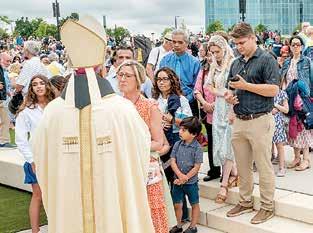
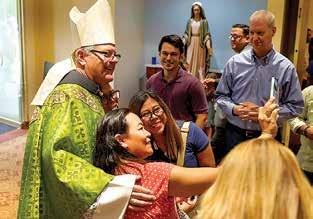
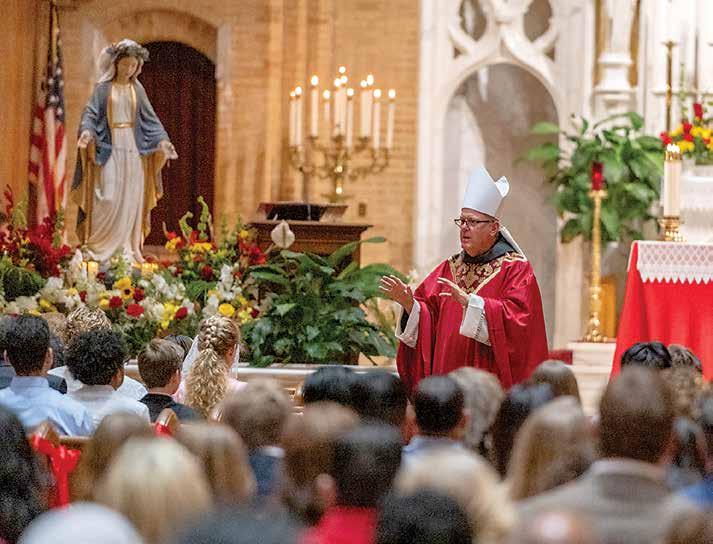
As he travels the diocese, Bishop Martin urges the faithful:
ANNIE FERGUSON arferguson@rcdoc.org
CHARLOTTE — The life of a bishop, especially a brand new one, is blessed – and busy.
Just days after his May 30 installation at St. Patrick Cathedral in Charlotte, Bishop Michael Martin, OFM Conv., began making good on his promise to get out and meet the people of the Diocese of Charlotte, leaving a lasting impression everywhere he visits.
On June 1, he conferred the sacrament of holy orders for the first time, ordaining six deacons at St. Mark Church in Huntersville. The next day, he delivered a stirring Corpus Christi homily to a crowd of 4,000 at an outdoor amphitheater in Charlotte. And on June 5 he celebrated his first confirmation Mass, traveling to Our Lady of Grace Church in Greensboro where nearly three dozen young people eagerly awaited receiving the sacrament from their new bishop.
The weeks since have included more confirmations in Charlotte and Newton, visits to a vocations summer camp, a Sunday Mass at St. Patrick Cathedral, and the spring assembly of U.S. bishops – not to mention the ordination of seven new priests, which drew a packed house of 2,000 family and friends to St. Mark last Saturday. There were also meetings with priests and
staff, and a barbecue for Pastoral Center employees. Bishop Martin also offers daily Mass at the Pastoral Center whenever he can.
After every event, he lingers long afterward to bless, shake hands and pose for selfies –even sign autographs – with well-wishers in long lines, sometimes for up to an hour.
“I think it’s fair to say he’s hitting the ground running,” says his executive assistant Michelle Maher, who is racing to keep pace.
Then there’s the mail.
“You wouldn’t believe the number of cards, letters, emails and phone calls that come in every day,” Maher says. “I have an overflowing file for mail from inside the diocese, an overflowing file for mail from outside the diocese, and in the beginning, there were so many letters from other bishops offering congratulations. We are trying to figure out how to answer them all!”
As predicted by those who know him, Bishop Martin has demonstrated a talent and love for public speaking, projecting a voice that rises and falls, gesturing as he walks around, and leaning forward toward the audience when he makes a point.
He gets laughs, too, tapping into common experiences, such as our reliance on GPS and incredulous looks from siblings when
they think our ego is too inflated. But the larger message always challenges people to think, accept “our brokenness,” and do more to demonstrate and proclaim the Catholic faith to others.
In a homily at St. Gabriel Church, he encouraged the congregation to share their faith stories – imperfections and all – not just their “Catholic résumé” including facts such as where they went to Catholic school.
“Rather, if we said, ‘I have realized that I’m a broken man, and God rescues me regularly from my own brokenness. Here, let me tell you a story about that.’
That moves. That inspires,” he told the congregation, including confirmation students and their families.
His homilies that have been posted online have so far drawn more than 8,000 views, with most visitors watching them through, and his Corpus Christi homily drew national media attention. Across the diocese, people are talking in person and online about Bishop Martin’s relatability, good humor and ability to challenge them –and himself – to live the faith more deeply.
“He really knows how to make a point and drive it home,” says Father Timothy Reid, pastor of St. Ann Church in Charlotte. “People love that he’s so extroverted. It’s clear he wants to be out with the people, and they are responding to that. They are
drawn to his friendliness and openness. That’s his greatest asset. He’s a powerful communicator and there is a confidence in his preaching that is also very attractive.”
Father Reid also serves as vicar of education for the diocese’s 20 schools and recently had an unpleasant issue arise he felt was necessary to share with the new bishop.
“He was very quick with some solid advice,” Father Reid says. “I asked a bunch of questions, and I appreciated his vast experience in education.”
Teachers, staff and parents are eagerly waiting to see how the bishop engages with them once school is back in session, Father Reid says. Bishop Martin spent most of his career working in Catholic schools as a coach, teacher, principal and president. With 12 years as director of the Duke Catholic Center, his experience working with college students also has the diocese’s Campus Ministry program brainstorming ways to get the bishop involved.
“His experience teaching has helped him hone his messaging,” Father Reid says. “You can’t be an effective teacher if you can’t talk to kids. Part of that is also just his personality. He’s obviously a big-hearted guy, very extroverted, and comfortable with students.”


























CHARLOTTE — Bishop Michael T. Martin, OFM Conv., announces the following priest assignments, effective July 9 unless otherwise noted:
n Father Marcel Amadi: From Catholic chaplain at Wake Forest University to campus minister at High Point University while remaining campus minister at N.C. A&T
n Father Victor Ameh, MSP: From serving as parochial administrator of Our Lady of the Assumption Parish in Charlotte, to serve as pastor of St. Joseph Parish in Bryson City and Our Lady of Guadalupe Mission in Cherokee
n Father Oscar Benavides: From serving as parochial vicar of St. Gabriel Parish to serve as part-time parochial vicar at St. John Neumann and Our Lady of Guadalupe parishes in Charlotte
n Father Christopher Brock: From serving as parochial vicar at Holy Cross Parish in Kernersville to serve as fulltime chaplain at Bishop McGuinness High School while in-residence and assisting at Holy Cross Parish
n Father Michael Carlson: From serving as parochial vicar at St. Mark Parish in Huntersville, to serve as pastor of St. Dorothy Parish in Lincolnton
n Father Cory Catron: From serving as pastor of St. Francis of Assisi Parish in Jefferson and St. Frances of Rome Mission in Sparta, to serve as pastor of Our Lady of Mercy Parish and Our Lady of Fatima Mission in Winston-Salem
n Newly ordained Father Matthew Dimock: Parochial vicar, Sacred Heart
Parish in Salisbury
n Father Raymond Ekosse: From serving as parochial vicar at St. Thomas Aquinas Parish in Charlotte, to serve as parochial vicar at St. Patrick Cathedral in Charlotte
n Father Alfonso Gamez: From serving as parochial vicar at St. Vincent de Paul Parish in Charlotte, to serve as pastor of St. Francis of Assisi Parish in Lenoir
n Newly ordained Father Christian Goduti: Parochial vicar, St. Leo the Great Parish in Winston-Salem
n Father Enriqué Gonzales: From serving as pastor of St. Francis of Assisi Parish in Lenoir, to serve as pastor Our Lady of the Assumption Parish in Charlotte
n Newly ordained Father Matthew Harrison: Parochial vicar, St. Thomas Aquinas Parish in Charlotte
n Father James Kang: From serving as parochial vicar of Holy Family Parish in Clemmons, to serve as parochial administrator of Our Lady of Consolation Parish in Charlotte and St. Helen Mission in Spencer Mountain
n Father Tyozenda (Peter) Maza: From serving as campus minister at High Point University, to serve as parochial vicar at Holy Family Parish in Clemmons
n Father David McCanless: From serving as pastor of Our Lady of Mercy Parish and Our Lady of Fatima Mission in Winston-Salem, to serve as chaplain at Wake Forest University while assisting with other Campus Ministry duties
n Newly ordained Father Kevin Martinez: Parochial vicar, St. Mark Parish in Huntersville
n Father David Miller: From pastor of
CHARLOTTE — Bishop Michael Martin, OFM Conv., has appointed Monsignor Patrick Winslow as vicar general and chancellor and Father Christopher Gober as vocations director for the Diocese of Charlotte. Bishop Martin expressed confidence in the two priests, who served in the same positions under then-Bishop Peter Jugis, and whose appointments provide continuity as Bishop Martin begins his leadership of the diocese following his installation May 30.
“It’s clear to me these two devoted servants have done a great job helping lead our diocese in the face of tremendous growth across western North Carolina,” Bishop Martin said. “I will look to them for guidance and support as I learn more about our opportunities and challenges, and as I get to know the people and the clergy of our diocese.”


As vicar general, Monsignor Winslow reports directly to the bishop on matters related to clergy and vocations, and acts in place of the bishop in his absence. As chancellor, he also manages the diocese’s administrative offices and archives. He was ordained a priest in 1999 and served in parishes and as a maximumsecurity prison chaplain in the Diocese of Albany, New York, before moving south and becoming incardinated into the Charlotte diocese in 2002.
In North Carolina, he served at St. Vincent de Paul in Charlotte, St. Francis of Assisi in Jefferson and St. Frances of Rome in Sparta, and St. John the Baptist in Tryon before becoming pastor of St. Thomas Aquinas in Charlotte in 2012. He was appointed vicar general and chancellor in 2019.
Father Gober was first appointed vocations director in 2004, helping evaluate and guide men who are discerning a call to the priesthood. During his 20 years of leadership the diocese has called more than 50 men to the priesthood, established St. Joseph College Seminary, and started two vocation discernment camps for young men and women. Next week, the diocese will ordain seven priests – among its largest ever class of ordinands.
St. Dorothy Parish in Lincolnton, to a future assignment yet to be determined
n Father Jacob Mlakar: Returning from studies in Rome to serve as pastor of St. Francis of Assisi Parish in Jefferson and St. Frances of Rome Mission in Sparta
n Father Ernest Nebangongnjoh: From parochial vicar at St. Patrick Cathedral in Charlotte, to ministry in his home diocese of Buea, Cameroon
n Newly ordained Father José Palma Torres: Parochial vicar, Our Lady of Mercy Parish and Our Lady of Fatima Mission in Winston-Salem
n Father Basil Sede: From pastor of Our Lady of Consolation Parish in Charlotte and St. Helen Mission in Spencer Mountain, to ministry assigned by his home diocese of Buea, Cameroon
n Father Peter Shaw: From pastor of St. Joseph Parish in Bryson City and Our Lady of Guadalupe Mission in Cherokee, to a future assignment yet to be determined
n Newly ordained Father Elliott Suttle: Parochial vicar, Our Lady of Grace Parish in Greensboro
n Father Ramiro Tijerino: From serving in Hispanic Ministry at St. John Neumann and Our Lady of the Assumption parishes in Charlotte, to serve as parochial vicar at St. Vincent de Paul Parish in Charlotte
n Newly ordained Father Kevin Tran: Parochial vicar, St. Gabriel Parish in Charlotte
n Father Joseph Wasswa: From serving as parochial vicar at Our Lady of Grace Parish in Greensboro, to serve as parochial vicar at St. Aloysius Parish in Hickory
Father Gober was ordained in 2000 by then-Bishop William Curlin and served as a parochial vicar at St. Michael in Gastonia and St. Gabriel in Charlotte before his appointment as pastor of St. Lucien in Spruce Pine and St. Bernadette in Linville in 2003. Since 2020, he has served as pastor of St. Leo the Great in Winston-Salem. — Catholic News Herald
CHARLOTTE — Bishop Michael T. Martin, OFM Conv., has reestablished the Diocese of Charlotte’s Presbyteral Council, effective June 3.
The council, which advises the bishop in governing the diocese, had been automatically dissolved upon Pope Francis’ acceptance of Bishop Peter Jugis’ resignation on April 9, according to Church law.
Bishop Martin reinstated the membership of the council that had been serving up until Bishop Jugis’ retirement.
Council officers resuming their positions are:
n Chairman Father Benjamin Roberts, pastor of Our Lady of Lourdes Parish in Monroe
n Vice Chairman Father Christian Cook, pastor of St. Margaret Mary Parish in Swannanoa
n Secretary Father Matthew Codd, pastor of St. Thomas Aquinas Parish in Charlotte
n Treasurer Father John Putnam, pastor of St. Mark Parish in Huntersville and judicial vicar for the diocese
Other members of the Presbyteral Council are listed on the diocese’s website, www.charlottediocese.org.
Required by Church law, the Presbyteral Council represents all priests in the diocese and is “like a senate of the bishop” (Code of Canon Law 495 §1), with about half the members elected by priests and others appointed by the bishop.
— Catholic News Herald
CHARLOTTE — Twenty-one Diocese of Charlotte seminarians have been assigned to work in parishes this summer, the diocese’s Vocations Office has announced.
They will serve from Saturday, June 1, to Sunday, Aug. 4.
Seminarians and their assignments are:
n Deacon Christopher Angermeyer: Our Lady of Mercy Parish in Winston-Salem
n Mark Becker: St. Gabriel Parish in Charlotte
n Robert Bauman: St. Bernadette Parish in Linville
n Carson Cannon: Holy Cross Parish in Kernersville
n John Cuppett: St. Michael the Archangel Parish in Gastonia
n Deacon Anthony Del Cid Lucero: St. Leo the Great Parish in Winston-Salem
n Maximilian Frei: St. John the Baptist Parish in Tryon
n Brian Ilagor: St. Francis of Assisi Parish in Lenoir
n James Johnson: Queen of the Apostles Parish in Belmont
n Deacon Nicholas Kramer: St. Mark Parish in Huntersville
n Michael Lugo: St. John the Baptist Parish in Tryon
n Patrick Martin: St. Jude Parish in Sapphire
n Deacon Kolbe Murrey: St. Leo the Great Parish in Winston-Salem
n Mateo Perez: St. Mary Help of Christians Parish in Shelby
n Matthew Stanley: St. Ann Parish in Charlotte
n Deacon Andrew Templeton: St. Thomas Aquinas Parish in Charlotte
n Peter Townsend: Our Lady of Grace Parish in Greensboro
n James Tweed: St. Mark Parish in Huntersville
n Bailey Van Nosdall: Holy Cross Parish in Kernersville
n Connor White: St. Margaret Mary Parish in Swannanoa
n Deacon Joseph Yellico: St. Ann Parish in Charlotte — Catholic News Herald
The North Carolina State Council Columbiettes recently raised $5,100 through its annual “Mother’s Coin Jar” spare change fundraising program, thanks to the efforts of all 18 of its auxiliaries. The funds were divided between Catholic Charities of the Dioceses of Raleigh and Charlotte to help mothers and children in need.
The Columbiettes are the women members of auxiliary councils affiliated with local Knights of Columbus councils.
— Kathy ThomasCHARLOTTE — A prayer and support group for Catholic grandparents has launched in the Charlotte area, and all grandparents are invited to an inaugural meeting and social hour to learn more.
A wine and cheese social will be held from 6 to 8 p.m. Saturday, July 13, at St. Ann Church’s Allen Center after the 4:30 p.m. vigil Mass. The meeting will be held in person and via Zoom.
Pre-register by July 10 to cgakac24@gmail.com with your name, number attending, and if you wish to attend via Zoom to receive the meeting link.
St. Ann Church is located at 3635 Park Road in Charlotte.
See their ad on page 16A, and learn more at www.catholicgrandparentsassociation.org.
— Catholic News Herald
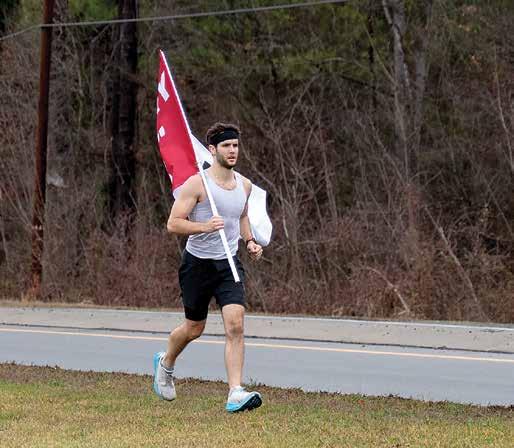
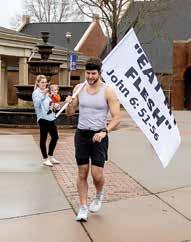
National Eucharistic Congress inspires Catholic runner to spread ‘Adoration Ultra’ concept beyond Charlotte
ANNIE FERGUSON arferguson@rcdoc.org
CHARLOTTE — Earlier this year St. Matthew parishioner Jimmy Coleman ran what is believed to be the first-ever Adoration Ultra in the Charlotte area. Now he’s poised to do it again with more Catholic runners from North Carolina and beyond.
These prayerful marathons include running from church to church for Adoration of the Blessed Sacrament, raising awareness of the Real Presence of Jesus in the Eucharist. The upcoming event begins in Charlotte July 1 and culminates with the National Eucharistic Congress in Indianapolis on July 17-21.
For his first Adoration Ultra in January, Coleman started with Eucharistic Adoration and Mass at St. Mark Church in Huntersville and ran more than 50 miles carrying a flag emblazoned with “Eat my flesh” and “Drink my blood” (Jn 6:54-56) to the Charlotte-area churches of St. Thomas Aquinas, St. Vincent de Paul, St. John Neumann and St. Matthew, stopping for Eucharistic Adoration at each location. Ever since then, other Catholic runners who saw Catholic News Herald and national media coverage of Coleman’s feat have been reaching out to him to learn how he did it. Together, they’re gearing up for another Adoration Ultra.
This time, Coleman is recruiting runners and helping them plan Adoration Ultras or Adoration Minis in their own hometowns, leading up to the National Eucharistic Congress in Indianapolis.
“I’m hoping this inspires people who don’t know the Eucharist to look into it further and come closer to their Catholic faith,” he says. “And then maybe even people who are atheists, to inspire them through seeing people who are truly living out a devout Christian life versus a watereddown version of Christianity that is very unappealing.”
Coleman says runners of all ages are signing up, including a 69-year-old man, women in their 50s, and other runners in their 20s. The project has spread beyond just himself, which encourages Coleman.
“What we’re seeing now is a step further of not just being the ‘Jimmy Coleman Show,’” he says. “I’m hoping this becomes a more regular event throughout the U.S.”
Originally planned as a relay from Charlotte to Indianapolis, Coleman recently changed the format to ease logistical issues and involve more people.
“I’m really excited because it opens the door for other

At www.eucharisticrevival.org : Find Church resources, videos, educational materials, prayers and more at the National Eucharistic Revival movement’s website – designed to restore understanding and devotion to the Eucharist
people to participate who originally really wanted to, but weren’t able to,” he says.
Coleman hopes the experience will create running groups in various areas of the country who can connect as Catholic families and athletes.
For the Charlotte marathon, runners will stop at St. Ann and St. Matthew churches in Charlotte and at the St. Joseph Adoration Chapel on the campus of Belmont Abbey College. Other locations in the diocese may be added in the meantime. Coleman says he expects Adoration Ultras in cities closer to Indianapolis to intersect with official pilgrimage routes to the National Eucharistic Congress, further amplifying his mission to bring others closer to Jesus.
Participation in the Adoration Ultra is free. Runners are given an option to buy a T-shirt designed to match the flag Coleman carried in January featuring the words “Eat my flesh” and “Drink my blood” (Jn 6:54-56).
Coleman says he hopes people see a run group wearing the shirts and start wondering what they are doing.
“They’re going to ask someone, and someone is going to be forced to give them an answer,” he says. “That’s an opportunity to evangelize and bring people closer to Christianity – specifically to the Catholic faith.”
Want to create your own Adoration Ultra or know someone who would? Email Jimmy Coleman at jimmy@theadorers.com for advice and planning. See coverage of Coleman’s first Adoration Ultra at www.catholicnewsherald.com
CHARLOTTE — Parishioners at St. Vincent de Paul Parish will be attending Mass in the parish hall through the summer since major renovations started inside the church in early May.
The project has the dual purpose of making major needed repairs and updating the look of the church’s interior, according to Father Joshua Voitus, pastor.
“We had some wallpaper that was peeling badly, carpet with holes in it, things like that, so we’re basically resurfacing everything in the church,”
Father Voitus said. “Our main goal is to fix things that are broken, plus make things a little bit brighter and give a little more emphasis to the crucifix, altar and tabernacle at the front of the church. We’re going to be using more durable materials that are going to last for a very long time.”
Father Voitus said the renovations have been in the works for about six years, but were delayed by the COVID-19 pandemic. Fundraising started in September 2023 and parishioners have so far raised about $620,000 of the $700,000 goal.
porcelain” hue, Father Voitus said. The center aisle’s flooring will be an off-white tile with maroon and burgundy accent tiles, and the tile for the side aisles will resemble green marble.
Statues of Mary and Joseph previously tucked away on the sides of the church will be moved to more prominent positions up front.
Some of the renovations will connect directly to the parish namesake. There will be a fleur de lis design in the flooring of the center aisle, reflecting not only the symbol’s association
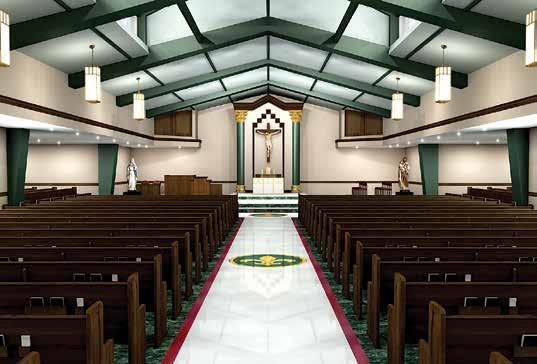
“The parish has been very supportive of the effort,” he said. “Since I got here seven years ago, people had been weighing in pretty constantly on things that needed to be done, and now we’re taking into account things both the diocese and the parishioners wanted in this project. We’re working with the structure we have, and we want to enhance some things in the church but still make it feel like home for parishioners.”
Church Interiors of High Point is the primary company working on the project.
The old carpet inside the church will be removed and replaced with tile flooring, and the walls and ceiling are being painted. Pews have been removed and taken to a location in High Point for repairs and refinishing.
The sanctuary will be painted in a dark slate gray color, with the side walls done in a “slightly off-white polished
with the Blessed Mother but also its association with France, St. Vincent de Paul’s home country.
The current goal is to have the renovations completed by the end of August.
In the future, Father Voitus wants to add more references to the parish namesake, with statues of St. Vincent de Paul and St. Louise de Marillac, co-founder of the Daughters of Charity of St. Vincent de Paul.
“We want to include a statue of her to honor her contributions to the ministry that St. Vincent de Paul started, and also because a lot of people have not heard of her, it will offer some education as well,” Father Voitus said. “She is also a founder of the order of sisters we currently have serving at the parish, so that would be a way to honor them as well.”
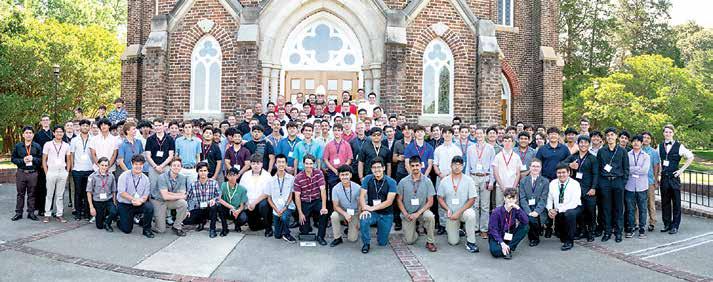
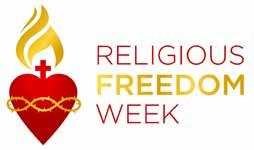
Religious Freedom Week 2024, themed “Called to the Fullness of Dignity,” will take place June 22-29, the U.S. Conference of Catholic Bishops recently announced. The week begins with the Feast of Sts. John Fisher and St. Thomas More, ends with the Solemnity of Sts. Peter and Paul, and includes the Feast of the Nativity of St. John the Baptist.
Through prayer, education and public action during Religious Freedom Week, the USCCB promotes the importance of preserving the essential right of religious freedom, for now and the future, for Catholics and for those of all faiths. Daily prayer and reflection resources – developed and provided by the USCCB’s Committee on Religious Freedom – are designed to help Catholics pray, reflect and take action to promote and protect religious liberty. Daily reflections focus on topics such as respect for sacred places, freedom to speak the truth, faith at work, civility, and Catholic healthcare, among others. Learn more online at www.usccb.org/ ReligiousFreedomWeek.
— Joe PurelloTo accommodate the upcoming Fourth of July holiday, the next edition of the Catholic News Herald will be published Friday, July 12. Questions about your subscription? Please call us at 704-370-3333 or email us at catholicnews@rcdoc.org.
CHARLOTTE — Catholic News Herald Editor Spencer Brown has departed his position this month for a book editing position and to spend more time with his family –as he and his wife joyfully await the arrival of their third child this fall. Brown will stay on at the Catholic News Herald as a contributing writer.

“Over the past two years as editor, I have witnessed such moving grace and blessings across our diocese as the Holy Spirit works in each and every one of us,” Brown said. “It has been a joy to share the wonderful news of parishes, schools and the faithful, and to help spread the Gospel to readers across western North Carolina. My goal has always been to reflect the teachings of the Catholic Church and to amplify the voice of our bishop.
“I have come to know many of our readers and contributors, and it has been a blessing to work with you and share your stories and good news. And while I am proud of the work we’ve accomplished over the past two years, none of it would have been possible without the incredible team at the Catholic News Herald. From our writers and photographers to our website staff and leadership, our team has truly been united and works tirelessly to bring the best content to readers not only in our diocese, but to the Church universal.
“As my family and I embark on this new journey, I hope you will keep us in your prayers, as you all shall remain in ours. Thank you for allowing me to share Our Lord’s good news and works with you, and may God continue to bless and keep you all.”
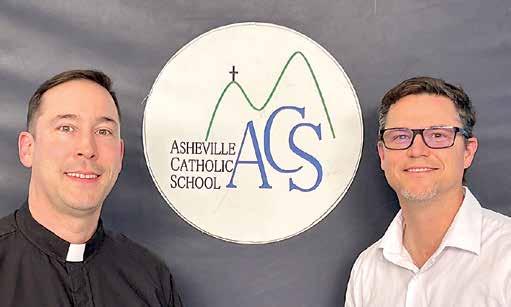 COURTNEY MCLAUGHLIN Correspondent
COURTNEY MCLAUGHLIN Correspondent
ASHEVILLE — A $10,000 donation to Asheville Catholic School has launched an endowment to honor Father Patrick Cahill’s and Principal Mike Miller’s longtime service to the school.
The Father Pat Cahill and Principal Mike Miller Fund for Academic Support, funded thanks to a group of longtime supporters, will bolster the school’s strong financial position and prepare for future growth.
and hopes others will contribute to the success of Asheville Catholic School.
“Asheville needs the presence of a thriving and robust Catholic school to comfort and to challenge,” he said. “This endowment will help offset the expenses of a growing need for learning support for our students – learning support consisted of one part-time reading specialist when Mike arrived, and we now have four learning support teachers.”
JUNE 24TH | 7PM-9PM ST. PATRICK’S CATHEDRAL 1621 DILWORTH RD E CHARLOTTE, NC 28203
Join us for an hour of prayer commemorating the second anniversary of the Dobbs decision. Stay for a wine and cheese social immediately afterward to celebrate pro-life progress and to be encouraged to continue the work! Families welcome!
co-sponsored by the Office of Family Life and C-PLAN RSVP not required but welcome familylife@rcdoc.org
“Our Academic Support Program has been steadily growing over the years, which is indicative of the amazing support our staff have offered students,” Miller said.
The endowment fund will offset costs related to staffing, curriculum supplements, supplies and professional development.
Miller recently left his position as Asheville Catholic’s principal at the end of the 2023-2024 school year after 11 years to serve as assistant superintendent of schools for the growing Diocese of Charlotte. A promotion well deserved, said Father Cahill, who serves as chaplain for Asheville Catholic and pastor of nearby St. Eugene Parish.
“We had around 160 students in 2013 and now we have 250. The standard Mike set by his work ethic and passion has noticeably improved our school.”
Father Cahill lent his name to the fund
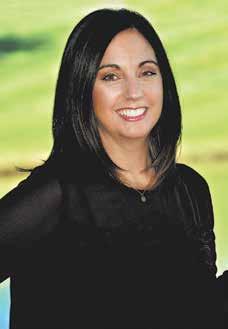
Jim Kelley, diocesan development director, said, “This named endowment is a wonderful way to honor the 11-year partnership that Father Cahill and Mike had in leading the school.”
Kelley noted that the diocese’s foundation now has over 200 endowments named after people. More parishes, schools, ministries and parishioners are interested in setting up endowments, he added, “particularly to honor or remember loved ones or other special people in the diocese.”
Interested in setting up – or adding to – an endowment to benefit your parish or Catholic school? You can establish an endowment in the Diocese of Charlotte Foundation by leaving a bequest in a will, a beneficiary designation from a retirement plan, a trust or annuity, or a gift of real estate, life insurance, cash or securities.
For details, contact Gina Rhodes at 704-3703364 or gmrhodes@rcdoc.org.

On his first Sunday as bishop, just three days after his installation, Bishop Martin swept into Ballantyne’s AMP outdoor venue with 4,000 people spread out on a rolling lawn on blankets and in chairs, and he challenged them to rethink the meaning of “presence” in the Corpus Christi feast day, which celebrates Christ’s Real Presence in the Eucharist.
He described recent research that shows many Catholics no longer fully believe in the Real Presence, a sad reality he said has roots in a secularized culture that is preoccupied by social media and technology offering impersonal communication.
“I’m not trying to change the culture, but I am acknowledging that the culture has changed us,” Bishop Martin said. “We have to find ways within the culture to not allow that change to make us less present to Our Lord and to each other.”
Attendee Karen Botero Cabas noted the perceptive quality of his words.
“The Mass was wonderful, and it was amazing to have the bishop with us,” she said. “The sermon he gave was great – very concise and very timely, very true.”
After the event, the bishop continued to greet worshipers until the amphitheater staff began to break down the stage equipment.
SHARING GIFTS OF THE HOLY SPIRIT
A few days later, as he arrived at Greensboro’s Our Lady of Grace Church, he walked over to the parish hall to meet the first young people he would confirm as the Bishop of Charlotte.
As soon as he entered the room, he smiled to put the teens at ease. He assured them there was nothing to be nervous about and joked that he’d be more likely to make a mistake than they would, since it was his first confirmation, too.
“Relax, it’s going to be wonderful,” he told them. “Don’t be afraid of what the Holy Spirit can do in your lives.”
He prayed over the confirmation candidates, then asked the group in jest which one of them would be the homilist for the evening. For a minute, the candidates looked at each other, then back at the bishop.
“Well, I’ll do it this time,” the bishop joked.
Much of Bishop Martin’s homily centered on the Gospel reading about the Parable of the Talents, and he encouraged the candidates not to bury the gift of faith they’ve all received.
“What you’re being confirmed to do is to go out into the world and let other people – imagine this – let other people follow you. They’re going to know who Jesus is because of you. That’s what this sacrament is about,” he said.
Nathanael Foppe, a recent graduate of Our Lady of Grace School, was among the first to be confirmed by Bishop Martin.
“One thing I noticed during the homily is Bishop Martin’s joking disposition,” Foppe said. “There’s a joy you can see in him. Joy happens to be one of the fruits of the Holy Spirit, and you can tell the Holy Spirit lives in him through his joy.”
In a heartfelt moment outside after Mass – out of earshot of most – Bishop Martin expressed his sincere gratitude to Our Lady of Grace’s pastor Father Casey Coleman for the spiritual bouquet of prayers from parishioners, including those he just confirmed.
The bishop then welcomed a group of young children as they hurried up to him
asking him to sign their programs and pose for photos. After a group photo with the newly confirmed, he mingled with families in the parish hall.
ENCOURAGING AN ACTIVE FAITH
At St. Gabriel Church in Charlotte, his second Sunday as bishop, Bishop Martin offered Mass and confirmed two candidates. In his homily, he compared the work required to plan a wedding with the effort needed in building one’s faith life. He also connected the occasion with his recent ordination, noting how his mother said it was the greatest day of her life – and his – and joking about the incredulous expressions that followed from his three sisters.
“But the greatest day of my life is a big claim, right? We know that there’s a lot that goes on behind it. And are we willing to do the unseen work of making our lives reflect God’s glory?” he asked the congregation. “It doesn’t have to be just as good as it is right now. The greatest days of our lives can be yet to come, and that doesn’t mean it has to have some great ordination celebration. God knows, it can mean a lot of different things for many of us, regardless of our age.”
St. Gabriel parishioners said Bishop Martin’s homily resonated deeply with them and that he stayed to greet a line of at least 100 parishioners.
During his visit, he also went to St. Gabriel’s playground to greet and bless parents and children.
“Corry and I met the bishop before Mass, and we’re so impressed with his humility as he interacted with young children on the preschool playground,” said parishioner Sharon Broxterman. “When one young child shouted, ‘What’s your name?’ he responded, ‘Michael. What’s yours?’”
At Belmont Abbey College on June 11, Bishop Martin offered Mass and spoke with young men discerning their vocations at the diocese’s Quo Vadis Days summer camp.
“I’ve never met a bishop in person,” said Raphael Lugo, 17, a member of Immaculate Conception Parish in Forest City. “I’ve just seen him on the screen and in pictures. It was a really cool experience. He was a really easygoing guy, and he seemed to care for everyone there.”
CONTINUING A LEGACY OF FAITH
Jim Kelley, the diocese’s development director for nearly 40 years, has worked with four of the diocese’s five bishops.
“Every bishop offers new opportunities and brings their unique gifts to serve the people of western North Carolina,” Kelley says. “Each has emphasized three key aspects: guiding us toward heaven, fostering a closer relationship with Jesus, and encouraging active participation in our church communities. Bishop Martin has already addressed all three of these priorities.”
For his part, Bishop Martin is getting out to meet as many people as he can. Since he can’t travel immediately everywhere across the diocese’s 20,700 square miles, next week he’s sending a letter of greeting to all the diocese’s registered households.
In it, he encourages everyone to engage with their local faith community in whatever ways they can, recounting a recent visit to St. Patrick School in Charlotte:
“One little girl gave me a card with these words of encouragement written in crayon: ‘You can do it!’ Out of the mouths of babes! I share that same message back to all of you, my brothers and sisters. When we think our response to Jesus is not what it could be, let us hear the voice of the Holy Spirit within us, with the innocence and simplicity of children, reminding us: ‘You can do it!’”
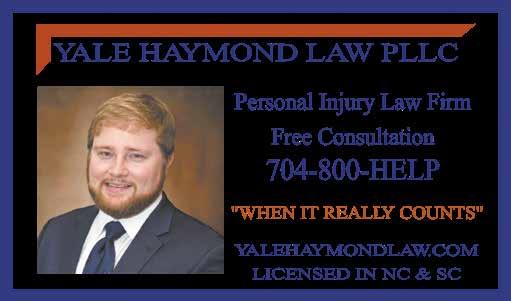
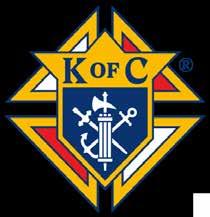
Please pray for the following priests who died during the month of June:
Rev. Msgr. Richard Allen – 2005
Rev. Sebastian Doris, OSB – 1990
Rev. Kurt M. Fohn – 2022
Rev. Guy E. Morse – 2000
Rev. Msgr. Roueche – 2000
Rev. Gabriel Stupasky, OSB - 1974
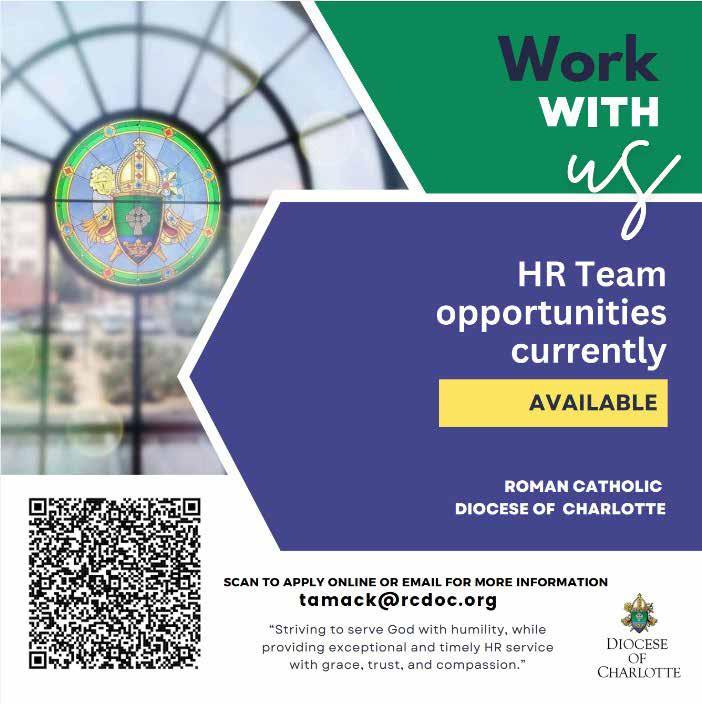
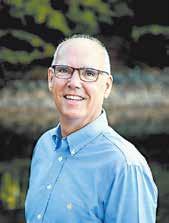
David
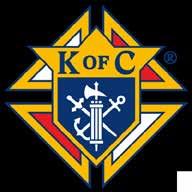
Canio Codella 6/25/1991
Edward Morovich 6/1/2000
Hugo May 6/23/2010
Gerald Hickey 6/6/2011
John Parrish 6/6/2015
Eugene Gillis 6/6/2017
Ronald Steinkamp 6/10/2018
Thomas Kak 6/25/2021 Please
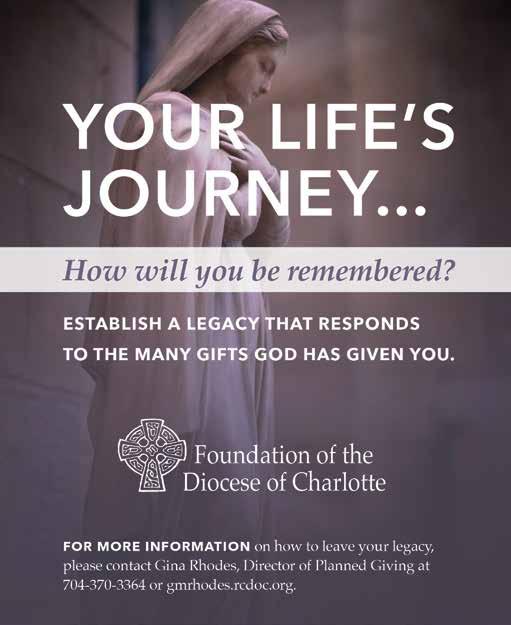
BELMONT — Mercy Sister Mary Rosalind Picot passed away at Sacred Heart Convent on May 25, 2024. She was 90.
A Mass of Christian Burial was celebrated Friday, May 31, 2024, in Cardinal Gibbons Chapel at Sacred Heart Convent. Interment was at Belmont Abbey Cemetery.

A proud native of North Carolina, Mary Rose Picot was born on Sept. 18, 1933, in Wilmington, the daughter of Hallette E. Picot and Rose Allen.
A Sister of Mercy for 69 years, Sister Rosalind was an educator and a leader who empowered people to grow and expand their vision of life and service. She attended St. Mary’s Catholic School and New Hanover High School in Wilmington. After joining the Sisters of Mercy in Belmont in 1955, she later received a bachelor’s degree in education from Sacred Heart College in Belmont, a Medical Technology degree from Mercy Hospital in Charlotte, two master’s degrees from the University of North Carolina at Chapel Hill (one in French, and the other in Education Administration), and a doctorate in education from the University of North
in Administration for Higher Education. An honorary doctorate from Belmont Abbey College was presented in recognition of her outstanding service in education.
Sister Rosalind’s spiritual motto was: “In You, O Lord, I Trust.” She lived this as an elected regional councilor and president for 16 years, served on boards, and was well known as the principal of Charlotte Catholic High School.
She was an outstanding administrator renowned for her love of the French language and travels in France.
For seven years, Sister Rosalind served on the board of directors at Holy Angels, where she passionately advanced its ministry.
Sister Rosalind was loved by all those she met and was an extremely gracious woman of Mercy.
On her 50th jubilee anniversary as a Sister of Mercy in 2005, Sister Rosalind told the Catholic News Herald that religious life was her path to a deeper relationship with God. “I entered to search for God. I stay for the same reason – I keep finding God in so many different ways, events and people. There have been sudden revelations and an evolving process, filled with God’s grace.” McLean Funeral Directors of Belmont was in charge of the arrangements. Online condolences may be sent at www. mcleanfuneral.com.
—



 Catholic News Herald
Picot
Catholic News Herald
Picot
The National Eucharistic Revival that began in 2022 came to the big screen with the June 4 premiere of the educational and energizing documentary “Jesus Thirsts: The Miracle of the Eucharist” (Fathom Events). Written and directed by Tim Moriarty, the roughly 90-minute film proved sufficiently popular that it returned to theaters earlier this week.
An early sequence of person-in-the-street interviews illustrates the complex of problems the revival is meant to address and at least partially remedy. These brief dialogues give viewers evidence of alienation from, or indifference to, the Church as a whole as well as an all-toowidespread deficient understanding of the nature of the Blessed Sacrament.
Perhaps as a result of poor catechesis, perhaps due to the secular, materialist worldview that has taken hold in many quarters, this random survey reveals a common view of the Eucharistic elements as no more than symbolic representations of the body and blood of Jesus – an outlook wholly at odds, of course, with the 2,000-year-old beliefs of the Catholic Church.
As those dedicated to Church teaching make clear throughout the movie, this abandonment of faith in the Real Presence has grave consequences. While dissolving one of the bonds most likely to keep believers actively connected to the Church – as well as one of the motives most likely to spur regular attendance at Mass – it also undermines respect for the priesthood.
To explain and vindicate the Church’s supernatural perception of what takes place at every celebration of the
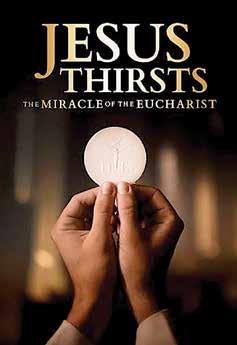
Eucharist, the filmmakers turn to theologians, priests and bishops, missionaries and converts. These include Marian Fathers Chris Alar and Donald Calloway, Sisters of Life Marie Veritas and Mary Grace and renowned biblical scholar Scott Hahn.



The most vivid presence on screen is that of St. Clare Sister Briege McKenna. An indefatigable champion of the priesthood – disheartening scandals and the weak state of the Church in her homeland of Ireland notwithstanding – she makes a compelling case for viewing each priest as a gift from God to the faithful. She’s equally forceful in talking about the value of the liturgy.
“You go to Mass to claim the victory that was already won for you,” Sister Briege explains. “And if you claim the victory, Satan can’t get near you.”
Viewers are also brought along on a globe-trotting journey to witness the impact of the Eucharist in widely divergent parts of the world. Locales visited range from a Texas prison and a small town in rural Uganda to a Norbertine abbey in California and New York City’s St. Patrick’s Cathedral.
The story of persecuted Vietnamese prelate Cardinal Nguyen Van Thuan (1928-2002) is particularly poignant. During a long imprisonment, most of it spent in solitary confinement, the cardinal’s family found ingenious ways to supply him with the bread and wine needed to celebrate Mass in his cell.
One especially valuable element of “Jesus Thirsts” is its placement, via reenactments, of the Eucharist within the wider context of salvation history. The connection of Jesus’ action at the Last Supper to such events as the first Passover, the gift of manna in the wilderness, the crucifixion and the appearance of the Risen Lord on the road to Emmaus are all highlighted.
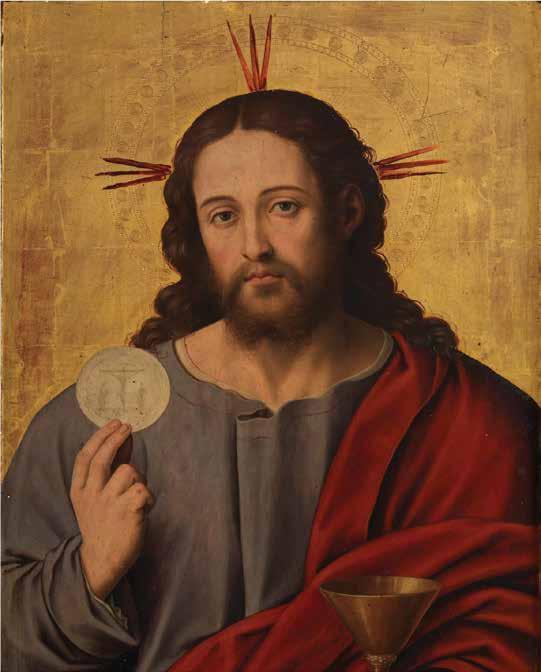
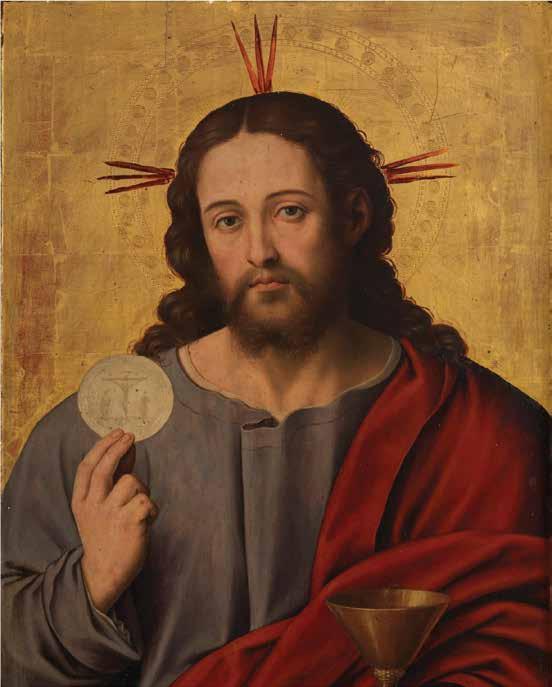
While too sophisticated for small children, the documentary is likely to prove a formative – but also easy-to-enjoy – catechetical lesson for teens and adults alike. For theater locations and showtimes, go to www. JesusThirstsFilm.com.

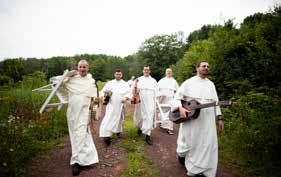
Pope Francis leads members of the assembly of the Synod of Bishops in praying for migrants and refugees in front of the statue, “Angels Unawares,” in St. Peter’s Square Oct. 19, 2023. The sculpture by Canadian Timothy Schmalz, depicts a boat with 140 figures of migrants from various historical periods and various nations.
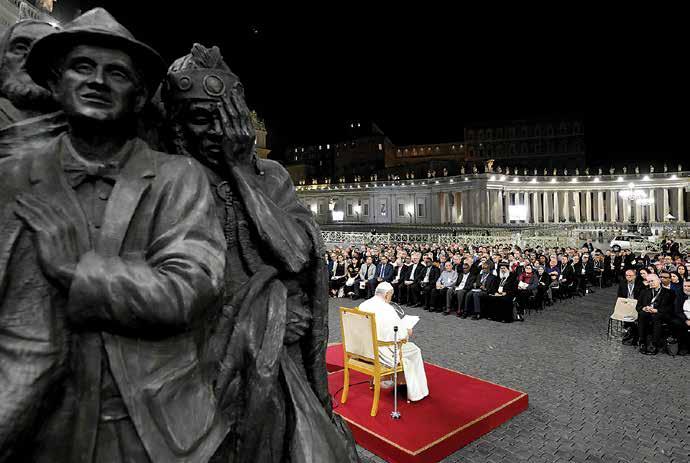
Catholic Charities Diocese of Charlotte is highlighting the seven themes of Catholic Social Teaching in conjunction with its year-long 75th anniversary celebration. This second installment of the series focuses on “Welcoming the Stranger,” caring for all our sisters and brothers –especially refugees and migrants.
CHRISTINA LEE KNAUSS clknauss@rcdoc.org
CHARLOTTE — A group of volunteers in Charlotte spends many hours each month preparing homes for people they don’t even know.
Known as the Homemakers of Mercy, these dedicated men and women volunteer with Catholic Charities to furnish apartments and houses for refugee families the agency resettles into the Charlotte area. This partnership is a vivid illustration of one of the seven principles of Catholic Social Teaching: welcoming the stranger. Catholic Charities agencies around the country work in partnership with the U.S. Conference of Catholic Bishops, the U.S. State Department and state-run refugee offices to resettle refugees fleeing war, political upheaval, or religious, economic or ethnic persecution. In the diocese, the agency runs offices in Charlotte and Asheville, resettling roughly 300 refugees or more in a year.
After refugees go through a lengthy screening process in their home countries, Catholic Charities typically gets two weeks’ notice – and sometimes as little as 48 hours – to secure housing for incoming refugees. Once they arrive, the refugee services office then works to get adults employment and enroll children in school. The agency also offers youth programs such as summer camps, and helps refugees
enroll in English classes and gain other skills they need to build new lives in North Carolina, says Laura Townsend Jones, refugee resettlement director for Catholic Charities.
“This is a legal pathway for these newcomers to get to the United States,” Jones said. “These individuals are fully vetted for health and security overseas before they come, and they have the support of our agency with a host of case management and employment services so they can reach self-sufficiency very quickly. We see them working and paying their bills on their own in a very, very short period of time.”
Catholic Charities has seen a sharp increase in the number of refugees coming to North Carolina in the past year. The agency expects to settle 420 people this fiscal year – surpassing its original target of 375 as well as last year’s total of 290 refugees.
Refugees come from countries around the world, with most recently moving to the Charlotte area from Syria, Myanmar, Afghanistan and Venezuela. Roughly 150 of the refugees, primarily from Ukraine, Venezuela and other Latin American countries, will go through the Asheville office.
The newcomers often leave their home countries with few possessions or sometimes nothing at all. Volunteers such as the Homemakers of Mercy must equip the apartments not only with furniture, but household goods such as basic kitchen utensils, bedding and shower mats and curtains. Catholic Charities helps the refugees learn how to navigate many facets of life in a new country, from speaking English and getting a bank account to using public transportation.
“After the initial help they receive when arriving here, we continue with robust support services including job training and financial literacy,” Jones said. “We also have a school impact program to support the students in achieving academic and
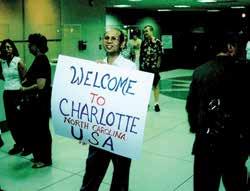
CATHOLIC CHARITIES ARCHIVES
For nearly 50 years, Catholic Charities has welcomed refugees from around the world to Charlotte, and more recently to Asheville, thanks to a partnership with the U.S. Conference of Catholic Bishops, the U.S. State Department, and the N.C. State Refugee Office.

More online
At www.ccdoc.org/refugee-resettlement : Explore resources and suggestions about how you can get involved in assisting refugee families. Questions on Catholic Charities Diocese of Charlotte’s social justice efforts? Contact Joe Purello at jtpurello@ccdoc.org or 704-370-3225.
At www.catholicnewsherald.com/espanol Read this story in Spanish
social success.”
Welcoming those fleeing violence and persecution has roots in the Bible and Catholic teaching, said Joseph Purello, director of Catholic Charities’ Office of
Social Concerns and Advocacy.
One scriptural reference that helps explain the Church’s teaching on welcoming the stranger, embodied in refugees and migrants, is the account in Matthew’s Gospel of the Holy Family fleeing into Egypt to escape the wrath of King Herod (Mt. 2:13-23), Purello said. “The Catholic Church, inspired by the Holy Family’s flight to Egypt to escape Herod’s murderous wrath, deeply cares about refugees,” he said. “The combined efforts of parishes, Catholic Charities staff and volunteers and benefactors provide refugees with safety, dignity and hope. By helping those in need, we affirm our shared dignity as human beings made in the image and likeness of God.”
Another scriptural reference that addresses the topic is found in Hebrews 13:2: “Do not forget to show hospitality to strangers, for by so doing some people have shown hospitality to angels without knowing it.”
Purello said works of mercy like these are founded on the teachings of Jesus. “When we reach out in charity and compassion to refugees,” he said, “we are doing the corporal work of mercy of sheltering the homeless and the spiritual work of mercy of comforting the afflicted.” He suggests the following “Share the Journey Prayer” as a way to further contemplate the idea of welcoming the stranger. It comes from the U.S. bishops’ conference, Catholic Relief Services and Catholic Charities USA: Almighty and ever-living God, empower your one human family to join hands on our journey of faith. Send us your spirit of hope, so that we may work to alleviate human suffering and foster charity and justice in our world. Amen.
“The Lord entrusts to the Church’s motherly love every person forced to leave their homeland in search of a better future.”
– Pope Francis
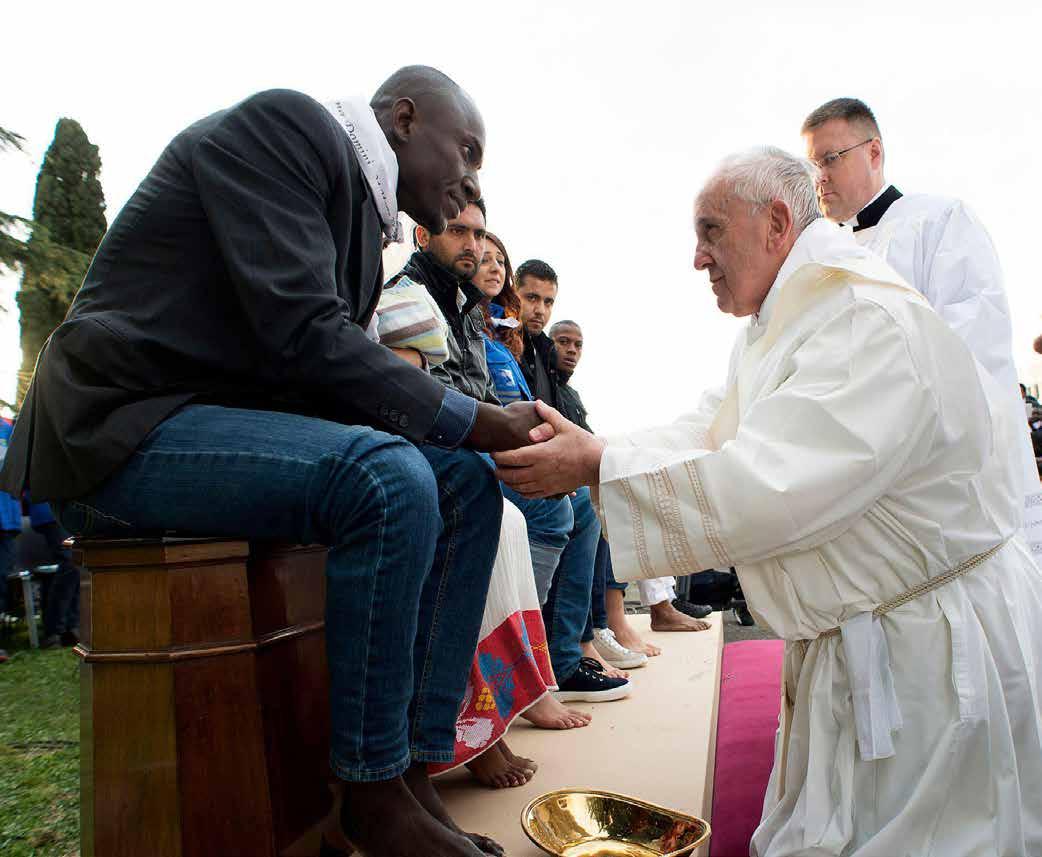
Catholic Resources on Refugee Resettlement: ccdoc.org/refugees
The love of Christ impels us (II Cor. 5:14) to serve our neighbors in need (Mt. 25: 31-46) – we cannot do otherwise (Deus Caritas Est, no. 25).


viaja por la diócesis, Obispo Martin insta a
los fieles:
CHARLOTTE — La vida de un obispo, especialmente la de uno nuevo, es bendecida y ocupada.
Pocos días después de su instalación el 30 de mayo en la Catedral San Patricio en Charlotte, el Obispo Michael Martin, OFM Conv., comenzó a cumplir su promesa de salir y conocer a la gente de la Diócesis de Charlotte, dejando una impresión duradera en todos los lugares que visita.
El 1 de junio, confirió el sacramento del orden sagrado por primera vez, ordenando a seis diáconos en la Iglesia San Marcos en Huntersville. Al día siguiente, pronunció una conmovedora homilía de Corpus Christi ante una multitud de cuatro mil personas en un anfiteatro al aire libre en Charlotte. Y el 5 de junio, celebró su primera Misa de confirmación, trasladándose a la Iglesia Nuestra Señora de Gracia en Greensboro, donde casi tres docenas de jóvenes esperaban ansiosamente recibir el sacramento de su nuevo obispo.
Las semanas que siguieron incluyeron más confirmaciones en Charlotte y Newton, visitas a un campamento de verano vocacional, una Misa dominical en San Patricio y la asamblea de primavera de los Obispos de los Estados Unidos, sin mencionar la ordenación de siete nuevos sacerdotes, que atrajo a una casa llena de dos mil familiares y amigos a San Marcos el sábado pasado.
También hubo reuniones con los sacerdotes y el personal, y una barbacoa para los empleados del Centro Pastoral. Adicionalmente, el Obispo Martin ofrece Misa diaria en el Centro Pastoral siempre que puede.
También se queda mucho después que terminan las Misas o los eventos, para bendecir, estrechar manos y posar para selfies, incluso firmar autógrafos con simpatizantes en largas filas, a veces hasta por una hora.
“Creo que es justo decir que está empezando a trabajar”, dijo su asistente ejecutiva Michelle Maher, quien está compitiendo para mantener el ritmo. Luego está el correo.
“No creerían la cantidad de tarjetas, cartas, correos electrónicos y llamadas que llegan todos los días. Es muchísima”, dijo Maher. “Tengo un archivo desbordante para el correo de dentro de la diócesis, y otro para el de fuera de la diócesis. Y al principio había muchas cartas de otros obispos ofreciendo felicitaciones. ¡Estamos tratando de ver cómo respondemos a todos!”
RELACIONÁNDOSE CON LAS PERSONAS
Como lo predijeron aquellos que lo conocen, el Obispo Martin ha demostrado un gran talento y amor al hablar en público, proyectando una voz que sube y baja, gesticulando mientras camina e inclinándose hacia adelante cuando señala
un punto importante. También se ríe, aprovechando experiencias comunes, como nuestra dependencia del GPS y las miradas incrédulas de los hermanos cuando piensan que nuestro ego está demasiado inflado. Pero el mensaje en general siempre desafía a las personas a pensar, aceptar “nuestro quebrantamiento” y a hacer más para demostrar y proclamar la fe católica a los demás.
En su homilía en la Iglesia San Gabriel, animó a la congregación a compartir sus historias de fe, con imperfecciones y todo, no solo su “currículum católico”, incluidos hechos como dónde fueron a la escuela católica.
“Más bien, si dijéramos: ‘Me he dado cuenta de que soy un hombre quebrantado, y Dios me rescata regularmente de mi propio quebrantamiento.
Los maestros, el personal y los padres están esperando ansiosamente ver cómo el obispo se relaciona con ellos una vez que reinicien las clases, dijo Reid. El Obispo Martin pasó la mayor parte de su carrera
Describió investigaciones recientes que muestran que muchos católicos ya no creen plenamente en la Presencia Real, una triste realidad que, según él, tiene sus raíces en una cultura secularizada que está preocupada por

POR TROY HULL, LIZ CHANDLER Y PROPORCIONADAS | CATHOLIC
Las primeras visitas parroquiales del Obispo Michael Martin incluyeron las parroquias San Mateo, Nuestra Señora de la Gracia y San Gabriel. (Arriba) El Obispo Martin celebra una Misa de confirmación en la parroquia Nuestra Señora de la Gracia en Greensboro. (Abajo) El Obispo Martin posa en un selfie con parroquianos de San Gabriel en Charlotte el 9 de junio, al terminar una Misa de confirmación en la que alentó a los fieles a compartir sus testimonios de fe.
Déjame contarte una historia sobre eso’. Eso se mueve. Eso inspira”, dijo a los estudiantes de confirmación de San Gabriel y sus familias.
Sus homilías, que se han publicado en redes sociales, han atraído hasta ahora más de ocho mil visitas, y la mayoría de los visitantes las han visto. En toda la diócesis, la gente está hablando en persona y online sobre la cercanía del Obispo Martin, su buen humor y capacidad para desafiarlos a ellos, y a sí mismo, a vivir la fe más profundamente.
“Realmente sabe cómo puntualizar algo para que lo reflexionemos en casa”, dijo el Padre Timothy Reid, párroco de la Iglesia Santa Ana en Charlotte. “A la gente le encanta que sea tan extrovertido. Está claro que quiere salir con la gente, y la gente está respondiendo. Se sienten atraídos por su amabilidad y franqueza. Ese es su mayor activo. Es un comunicador poderoso y hay una confianza en su predicación que también es muy atractiva”.
Reid también sirve como vicario de educación para las 20 escuelas de la diócesis y recientemente tuvo un problema desagradable que sintió era necesario compartir con el nuevo obispo.
“Fue muy rápido con algunos consejos sólidos”, dice Reid. “Le hice muchas de preguntas y aprecié su vasta experiencia en educación”.
trabajando en escuelas católicas como entrenador, maestro, director y presidente. Con 12 años como director del Centro Católico de Duke, la experiencia de Martin trabajando con estudiantes universitarios también ha hecho que el programa de Ministerio Universitario de la diócesis proponga una lluvia de ideas sobre diversas formas de involucrar al obispo.
“Su experiencia en la enseñanza le ha ayudado a perfeccionar sus mensajes”, dijo Reid. “No puedes ser un maestro eficaz si no puedes hablar con los niños. Parte de ello también es su personalidad. Obviamente es una persona de gran corazón, muy extrovertido y cómodo con los estudiantes”.
PROCLAMANDO EL EVANGELIO
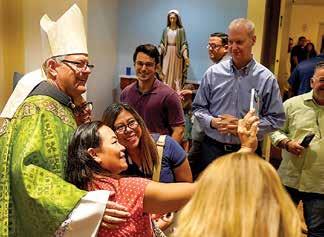
las redes sociales y la tecnología que ofrece una comunicación impersonal.
En su primer domingo como obispo, solo tres días después de su instalación, se presentó en el recinto al aire libre AMP de Ballantyne ante cuatro mil personas, a quienes desafió a repensar el significado de “presencia” en el día de la fiesta del Corpus Christi, que celebra la Presencia Real de Cristo en la Eucaristía.
“No estoy tratando de cambiar la cultura, pero estoy reconociendo que la cultura nos ha cambiado a nosotros”, dijo el Obispo Martin. “Tenemos que encontrar formas dentro de la cultura para no permitir que ese cambio nos haga menos presentes para Nuestro Señor y para los demás”. Karen Botero Cabas, una de las asistentes, destacó la calidad de sus palabras.
“La Misa fue maravillosa, y fue increíble


























CHARLOTTE — El Obispo Michael T. Martin, OFM Conv., anunció las siguientes asignaciones sacerdotales, vigentes a partir del 9 de julio, a menos que se indique lo contrario:
n Padre Marcel Amadi: De Capellán Católico en la Universidad Wake Forest a Ministro de Campus en la Universidad High Point, mientras sigue sirviendo en el Ministerio de Campus en la Universidad N.C. A&T.
n Padre Victor Ameh, MSP: De servir como administrador parroquial de la iglesia Nuestra Señora de la Asunción en Charlotte, a servir como párroco de la iglesia San José en Bryson City y la Misión Nuestra Señora de Guadalupe en Cherokee.
n Padre Oscar Benavides: De servir como vicario parroquial de la iglesia San Gabriel, a servir como vicario parroquial a tiempo parcial en las parroquias San John Neumann y Nuestra Señora de Guadalupe en Charlotte.
n Padre Christopher Brock: De servir como vicario parroquial en la iglesia Santa Cruz en Kernersville a servir como capellán de tiempo completo en la Escuela Secundaria Bishop McGuinness mientras reside y ayuda en la Parroquia Santa Cruz.
n Padre Christopher Brock: De servir como vicario parroquial en la iglesia Santa Cruz en Kernersville a servir como capellán de tiempo completo en la Escuela Secundaria Bishop McGuinness mientras reside y ayuda en la Parroquia Santa Cruz.
n Padre Michael Carlson: De servir como vicario parroquial en la iglesia San Marcos en Huntersville, a servir como párroco de la iglesia Santa Dorotea en Lincolnton.
n Padre Cory Catron: De servir como párroco de la iglesia San Francisco de Asís en Jefferson y la Misión Santa Francisca de
Roma en Sparta, a servir como párroco de la iglesia Nuestra Señora de la Merced y la Misión Nuestra Señora de Fátima en Winston-Salem.
n Padre Matthew Dimock: Vicario parroquial de la iglesia Sagrado Corazón en Salisbury.
n Padre Raymond Ekosse: De servir como vicario parroquial en la iglesia Santo Tomás de Aquino en Charlotte, a servir como vicario parroquial en la Catedral San Patricio en Charlotte.
n Padre Alfonso Gámez: De servir como vicario parroquial en la iglesia San Vicente de Paúl en Charlotte, a servir como párroco de la iglesia San Francisco de Asís en Lenoir.
n Padre Christian Goduti: Vicario parroquial de la iglesia San León Magno en Winston-Salem.
n Padre Enrique Gonzáles: De párroco de la iglesia San Francisco de Asís en Lenoir, a servir como párroco de la iglesia Nuestra Señora de la Asunción en Charlotte.
n Padre Matthew Harrison: Vicario parroquial de la iglesia Santo Tomás de Aquino en Charlotte.
n Padre James Kang: De servir como vicario parroquial de la iglesia Sagrada Familia en Clemmons, a servir como administrador parroquial de la iglesia Nuestra Señora de la Consolación en Charlotte y la Misión Santa Elena en Spencer Mountain.
n Padre Tyozenda (Peter) Maza: De servir como ministro del campus en la Universidad de High Point, a servir como vicario parroquial en la iglesia Sagrada Familia en Clemmons.
n Padre David McCanless: De servir como párroco de la iglesia Nuestra Señora de la Merced y la Misión Nuestra Señora de Fátima en Winston-Salem, a servir como capellán en la Universidad de Wake Forest mientras asiste con otros deberes del Ministerio del Campus.
n Padre Kevin Martínez: Vicario parroquial de la iglesia San Marcos en Huntersville.
n Padre David Miller: De párroco de la iglesia Santa Dorotea en Lincolnton, a una asignación futura por determinar.
n Padre Jacob Mlakar: Regresa de sus estudios en Roma para servir como párroco de la iglesia San Francisco de Asís en Jefferson y la Misión de Santa Francisca de Roma en Sparta.
n Padre Ernest Nebangongnjoh: De vicario parroquial en la Catedral San Patricio en Charlotte, al ministerio en su diócesis natal de Buea, Camerún.
n Padre José Palma Torres: Vicario parroquial de la iglesia Nuestra Señora de la Merced y la Misión Nuestra Señora de Fátima en Winston-Salem.
n Padre Basil Sede: De párroco de la iglesia Nuestra Señora de la Consolación en Charlotte y la Misión de Santa Elena en Spencer Mountain, al ministerio en su diócesis natal de Buea, Camerún.
n Padre Peter Shaw: De párroco de la iglesia San José en Bryson City y la Misión Nuestra Señora de Guadalupe en Cherokee, a una futura asignación por determinar.
n Padre Elliott Suttle: vicario parroquial de la iglesia Nuestra Señora de la Gracia en Greensboro.
n Padre Ramiro Tijerino: De servir en el Ministerio Hispano en las parroquias San John Neumann y Nuestra Señora de la Asunción en Charlotte, a servir como vicario parroquial en la iglesia San Vicente de Paúl en Charlotte.
n Padre Kevin Tran: Vicario parroquial de la iglesia San Gabriel en Charlotte.
n Padre Joseph Wasswa: De servir como vicario parroquial en la iglesia Nuestra Señora de la Gracia en Greensboro, a servir como vicario parroquial en la iglesia San Luis Gonzaga en Hickory.
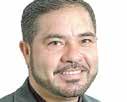
Hace algunos días escuché una frase que nuestro nuevo obispo dijo en una conversación con sacerdotes: “ya fue suficiente de hablar de mi”. Y lo decía en el contexto de que últimamente se había venido hablando de él en todos los medios de comunicación, pues se aproximaba su ordenación episcopal y la diócesis tenía que anunciarlo a todos los fieles.
La expectativa era grande. Y para muchos sigue siendo un misterio precioso que descubrir, pues siempre que hay un cambio de obispo, e incluso de párroco, lo primero que nos viene a la mente es que va a haber cambios. Y esto no es necesariamente negativo si tomamos una actitud de encuentro, de diálogo y de mucha humildad para cooperar con el nuevo obispo que Dios nos ha mandado.
Para los que hemos tenido la dicha de conocer al Obispo Martin, hemos visto varias cosas que en mi opinión van a causar un tremendo impacto en nuestra diócesis. Aquí les dejo algunos detalles para que lo vayan conociendo.
Desde el mero inicio pidió tener una Hora Santa, y aunque era abierta para todos los fieles de la diócesis, pidió expresamente que se invitara a los jóvenes. La Hora Santa estuvo llena de jóvenes y me gustó esa atención especial que tuvo hacia ellos. Hemos escuchado ya varias homilías de nuestro obispo y podemos ver la facilidad que tiene para transmitir las ideas con una lógica increíble, y con una profundidad espiritual que mueve al oyente a la escucha y también a la acción. Sus palabras impelan a tomar parte de la acción evangelizadora de la Iglesia.
A los sacerdotes nos envió una carta preciosísima en la cual nos hacía sentir que somos importantes para él, no tan sólo como nuestro obispo, sino como un amigo en el que podemos confiar, tener acceso para cualquier pregunta laboral e incluso espiritual. Su objetivo en este momento es encontrarse con toda la diócesis, y ya ha comenzado su carrera visitando varias parroquias. Es el obispo que quiere saludar a todos después de las celebraciones, que no lleva prisas, que tiene esa actitud paternal de encuentro. Todos tendremos que ser pacientes, pues por más que quiera tendrá que ir poco a poco en su recorrido por la diócesis. Y, al mismo tiempo, tendremos que ser prudentes, pues ciertamente queremos saludarlo pero debemos voltear y ver a los cientos de personas que esperan hacer lo mismo que nosotros. Siento que bajo su episcopado seguirá el incremento de vocaciones, pues ya se encontró con los seminaristas y ha estado haciendo el tiempo para conocer a los candidatos al diaconado y sacerdocio. Ha ido a participar en el campamento Quo Vadis, al que asisten muchos jóvenes para discernir la vocación al sacerdocio y su impacto para con los jóvenes es notable, por lo que seguirá llamando más jóvenes a discernir su vocación. Me impactó mucho que en una reunión que tuvimos nos preguntó si sabíamos de sacerdotes que estuvieran enfermos. Y más adelante nos comunicó a todos los sacerdotes que pidiéramos por uno de ellos en particular. Me vino a la mente el pasaje de Zacarías 13:7, que el mismo Jesús cita en el Evangelio de San Mateo 26 que dice: “heriré al Pastor y se dispersaran las ovejas”, pues bien, nuestro obispo quiere cuidar a sus pastores para congregar a sus ovejas y eso es muy bueno. En su liderazgo como pastor de su grey es fabuloso. Puede mirar pastoralmente los proyectos desde muchas perspectivas y propone muchísimas
CHARLOTTE — Con la asistencia de un gran equipo integrado por sacerdotes, diáconos, coordinadores de vicarías, directores de grupos apostólicos, coordinadores parroquiales y voluntarios, el Ministerio Hispano de la Diócesis de Charlotte se prepara para participar plenamente en las actividades del próximo Congreso Eucarístico diocesano que se celebrará los días viernes 30 y sábado 31 de agosto en el Centro de Convenciones de Charlotte.
La tercera semana del mes pasado, el Padre Julio Domínguez, vicario episcopal del Ministerio Hispano, envió una comunicación en la que, dirigiéndose a los directores de los grupos apostólicos, les solicitaba animar la participación de los integrantes de cada uno de sus movimientos en el proyecto.
Así como las delegaciones parroquiales se agrupan bajo una banderola que identifica la iglesia a la que pertenecen, el P. Julio sugirió que cada grupo apostólico se hiciera presente con algún signo representativo del carisma específico del movimiento.
Posteriormente, el martes 4 de junio, sostuvo una reunión con los líderes de los movimientos apostólicos en el Centro Pastoral Diocesano en Charlotte, para explicar en detalle los planes y programación del próximo congreso.
VIERNES 30
Regularmente el Congreso Eucarístico iniciaba los viernes con la bienvenida del
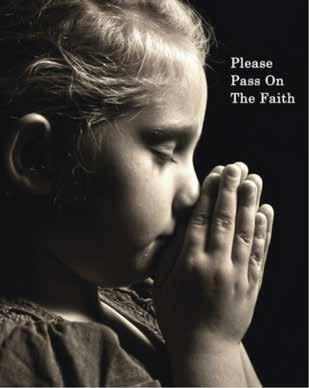
obispo, una conferencia y la realización de las Vísperas Solemnes.
Para la edición de este año, la noche del viernes 30 estará dedicada a los jóvenes. El programa iniciaría a las 6:30 de la tarde con palabras de bienvenida, seguido de las Vísperas Solemnes y conferencia y convivencia con el Obispo Martin apenas pasadas las 7 de la noche. Posteriormente, cerca a las 8:30 p.m., el Ministerio Hispano ofrecerá una obra de teatro que refleja la vida y obra de Carlos Acutis, un joven italiano que documentó y catalogó milagros eucarísticos y apariciones marianas en un website, antes de fallecer de leucemia en 2006 a la edad de 15 años. El 23 de mayo pasado, el Papa Francisco reconoció un segundo milagro atribuido a la intercesión del joven, allanando el camino a lo que podría ser la canonización del primer santo milenial.
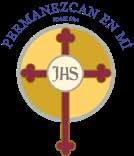
quien desarrollará el tema ‘Un cambio en tu vida’, es terapeuta familiar y especialista en adicciones. Brinda acompañamiento terapéutico a personas con problemas de adicción, en sexología, abusos sexuales y conductas obsesivas.
Tiene un diplomado en acompañamiento y asesoría familia de la Universidad del Valle de Atemajac, Jalisco; estudios en Teología del Cuerpo y Máster en Ciencias del Matrimonio y la Familia en el Pontificio Instituto Juan Pablo II para la familia; y en Intervención en Crisis en el Consejo Estatal contra las adicciones en Jalisco. Actualmente se desempeña como asistente de presidencia en Valora Conciencia en los Medios AC, es productora y conductora de programas de radio y televisión, y responsable del acompañamiento a personas con adicciones.
con más de cuatro mil estudiantes. Graduado como Bachiller en Bellas Artes en la Universidad Estatal de Louisiana, tiene una especialización en Psicología, Literatura y Escritura Creativa; además de un Máster en Humanidades en la Universidad Anahuac en la Ciudad de México, y una certificación en el Instituto Teología del Cuerpo en Pensilvania. Durante el sábado, los organizadores esperan recibir la visita del Obispo Martin y presentarán una breve obra teatral. Posteriormente, todos los asistentes participarán en la Misa de cierre.
Alrededor de las 8:50 p.m., Evan Lemoine, uno de los conferencistas del día sábado, ofrecerá su testimonio en ‘Amar al máximo’.
A las 9:30 de la noche, la jornada nocturna concluirá con un concierto.
SÁBADO 31
Tras la procesión eucarística y Hora Santa, la sesión en español tiene prevista la presentación de dos oradores: Rebeca Torres y Evan Lemoine. La conferencista Rebeca Torres,
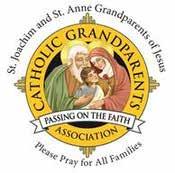
Por su parte, Mark Evan Lemoine es cofundador del Instituto Amar al Máximo de Guadalajara, México, orador internacional y maestro de inglés y español, miembro de facultad y profesor del Instituto Teología del Cuerpo en Filadelfia, la Universidad de Dallas, la Universidad Panamericana y su escuela de negocios, y la Universidad de Puebla. Lemoine además ha publicado libros y desarrollado un programa de especialización para adultos sobre la Teología del Cuerpo que a la fecha cuenta
Domingo Monrobert, ex coordinador del movimiento apostólico Emaús de la parroquia San Gabriel, que acudió como voluntario a la sesión del 4 de junio, dijo que de inmediato pusieron manos a la obra y, como primera acción, cancelaron el retiro que iban a realizar en la misma fecha propuesta para el Congreso Eucarístico. “Ya hemos diseñado un logo y obtenido la autorización del Padre Julio para usarlo en nuestra pancarta. Estamos felices de participar y hacer visible el trabajo del movimiento en nuestra parroquia”. La hermana Juana Pearson, asistente de la oficina del ministerio hispano, alentó a los fieles a participar en el próximo congreso eucarístico. “A nuestro nuevo Obispo Michael Martin le gustaría conocerlos a todos. No lleva mucho tiempo como obispo, y por eso necesita nuestro apoyo y afecto. Este Congreso Eucarístico será su primero, y tenemos esta oportunidad para abrazarle y hacerle sentir bienvenido”, dijo.
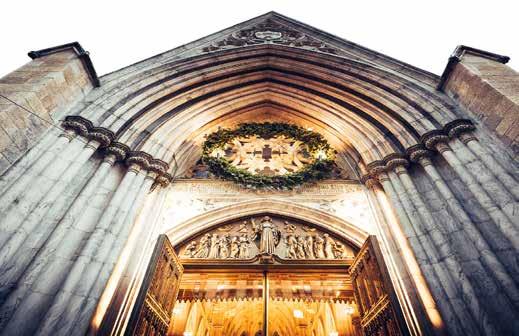

Este es el único santo al cual se le celebra la fiesta el día de su nacimiento. San Juan Bautista nació seis meses antes de Jesucristo El capítulo primero del evangelio de San Lucas nos cuenta de la siguiente manera el nacimiento de Juan: Zacarías era un sacerdote judío que estaba casado con Santa Isabel, y no tenían hijos porque ella era estéril. Siendo ya viejos, un día cuando estaba él en el Templo, se le apareció el ángel Gabriel de pie a la derecha del altar y le anunció que su mujer iba a tener un hijo, a quien pondrá por nombre Juan, que “será lleno del Espíritu Santo, y convertirá a muchos para Dios”. Seis meses después, el mismo ángel se apareció a la Santísima Virgen comunicándole que iba a ser Madre del Hijo de Dios, y también le dio la noticia del embarazo de su prima Isabel. De la infancia de San Juan nada sabemos. Tal vez, siendo aún un muchacho y huérfano de padres, huyó al desierto lleno del Espíritu de Dios porque el contacto con la naturaleza le acercaba más a Dios. Vivió toda su juventud dedicado nada más a la penitencia y a la oración. Como vestido sólo llevaba una piel de camello, y como alimento, aquello que la Providencia pusiera a su alcance: frutas silvestres, raíces, y principalmente langostas y miel silvestre. Solamente le preocupaba el Reino de Dios. Cuando tenía más o menos treinta años, se fue a la ribera del Jordán, conducido por el Espíritu Santo, para predicar un bautismo de penitencia. El Espíritu Santo le dijo que vería al Mesías en el Jordán, y le dio esta señal para que lo reconociera: “Aquel sobre quien vieres que me poso en forma de paloma, Ese es”.
y yo no soy digno ni siquiera de soltar la correa de sus sandalias. Él es el que ha de bautizarlos en el Espíritu Santo”. Por este tiempo llegó Jesús de Galilea al Jordán en busca de Juan para ser bautizado. Juan se resistía a ello diciendo: “¡Yo debo ser bautizado por Ti y Tú vienes a mí! A lo cual respondió Jesús, diciendo: “Déjame hacer esto ahora, así es como conviene que nosotros cumplamos toda justicia”.
Al momento de salir del agua, y mientras hacía oración, se abrieron los cielos y se vio al Espíritu de Dios que bajaba en forma
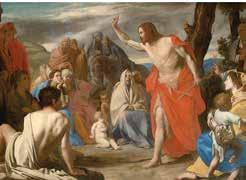
Óleo sobre lienzo de Massimo Stanzione realizado alrededor de 1635.
de paloma, oyéndose una voz del cielo que decía: “Este es mi Hijo muy amado, en quien tengo todas mis complacencias”.
Herodías era la mujer de Filipo, hermano de Herodes. Herodías se divorció de su esposo y se casó con Herodes, y entonces Juan fue con él y le recriminó diciendo que no te era lícito tenerla por mujer.
Herodes, instigado por la adúltera, puso preso a Juan. Herodías odiaba a muerte a Juan. Cuando llegó el cumpleaños de Herodes se celebró un gran banquete, y al final entró la hija de Herodías que bailó en presencia de todos, agradando al propio Herodes.
Entonces el rey juró a la muchacha:
“Pídeme lo que quieras y te lo daré, aunque sea la mitad de mi reino”.
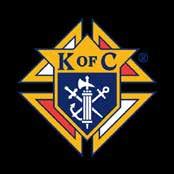
Considere unirse a los más de 2 millones de miembros de la organización fraternal católica más grande del mundo y registrándose en línea hoy en: www.kofc.org/joinus/es
Por tiempo limitado - Membresía en línea GRATISUse el código de promoción (BLESSEDMCGIVNEY)
Se puso a predicar a la gente diciendo: “Haced frutos dignos de penitencia y no estéis confiados diciendo: Tenemos por padre a Abraham, porque yo os aseguro que Dios es capaz de hacer nacer de estas piedras hijos de Abraham. Mirad que ya está el hacha puesta a la raíz de los árboles, y todo árbol que no dé buen fruto, será cortado y arrojado al fuego”, por lo que pedía que quien tenga dos túnicas que reparta con quien no tenga ninguna”. “Yo los bautizo con agua para moverlos a la penitencia; pero el que ha de venir después de mí es más poderoso que yo,
JUNIO 23-29
Domingo: Job 38:1, 8-11, 2 Corintios 5:1417, Marcos 4:35-41; Lunes (Solemnidad de Natividad de San Juan Bautista): Isaías 49:1-6, Hechos 13:22-26, Lucas 1:57-66, 80; Martes: 2 Reyes 19:9-11, 14-21, 31-36, Mateo 7:6, 12-14; Miércoles: 2 Reyes 22:8-13, 23:13, Mateo 7:15-20; Jueves (Memoria de San Cirilo de Alejandria, obispo y doctor de la Iglesia): 2 Reyes 24:8-17, Mateo 7:21-29; Viernes (Memoria de San Ireneo, obispo y mártir): 2 Reyes 25:1-12, Marcos 8:1-4; Sábado (Solemnidad de San Pedro y San Pablo, Apóstoles): Hechos 3:1-10, Gálatas 1:11-20, Juan 21:15-19
JUNIO 30-JULIO 6
Domingo: Sabiduría 1:13-15, 2:23-24, 2 Corintios 8:7, 9, 13-15, Marcos 5:21-43; Lunes (Memoria de San Junípero Serra, presbítero): Amós 2:6-10, 13-16, Mateo 8:18-
Ella salió fuera y preguntó a su madre:
“¿Qué le pediré?” La mujer le contestó:
“Pídele la cabeza de Juan el Bautista”. La muchacha entró de nuevo y en seguida dijo al rey: “Quiero que me des ahora mismo en una bandeja la cabeza de Juan el Bautista”. El rey vio su error, y se puso muy triste porque temía matar al Bautista; pero a causa del juramento, no quiso desairarla. Llamando a su guardia personal, ordenó que fuesen a la cárcel, lo decapitasen y le entregaran a la muchacha la cabeza de Juan en la forma que ella lo había solicitado.
22; Martes: Amós 3:1-8, 4:11-12, Mateo 8:2327; Miércoles (Fiesta de Santo Tomás, Apóstol): Efesios 2:19-22, Juan 20:24-29; Jueves (Día de la Independencia): Amós 7:10-17, Mateo 9:1-8; Viernes: Amós 8:4-6, 9-12, Mateo 9:9-13; Sábado (Memoria de Santa María Goretti, virgen y mártir): Amós 9:11-15, Mateo 9-14-17
JULIO 7-13
Domingo: Ezequiel 2:2-5, 2 Corintios 12:7b-10, Marcos 6:1-6; Lunes: Oseas 2:16, 1718, 21-22, Mateo 9-18-26; Martes (Memoria de San Agustín Zhao Rong, presbítero, y compañeros, mártires): Oseas 8:4-7, 11-13, Mateo 9:32-38; Miércoles: Oseas 10:1-3, 7-8, 12, Mateo 10:1-7; Jueves (Memoria de San Benito, abad): Oseas 11:1-4, 8-9, Mateo 10:7-15; Viernes: Oseas 14:2-10, Mateo 10:1623; Sábado (Memoria Opcional de San Enrique): Isaías 6:1-8, Mateo 10:24-33

ideas que abren caminos a nuevas formas de poder realizarlos. Él mismo lo ha dicho, no vengo a cambiar lo que están proponiendo, sino a enriquecerlo. Pero, para serles franco, es imposible no cambiar los planes, cuando nos está dando ideas que sabemos beneficiarán muchísimo más los proyectos.
Este es nuestro nuevo obispo. Y que nos perdone si seguimos hablando de él. No podemos no hacerlo ante todo lo que estamos viendo y que favorablemente está beneficiando desde el inicio a nuestra diócesis.
Les invito a todos a mantenerlo en nuestras oraciones contínuamente. Si algo podemos hacer como Iglesia es pedir por nuestros pastores y ayudarles con nuestra docilidad y compromiso a realizar todos los proyectos diocesanos que vengan.
EL PADRE JULIO DOMÍNGUEZ está a cargo del Ministerio Hispano de la Diócesis de Charlotte.
Caring for Charlotte Area Catholic Families in Their Hour of Need Since 1926
FUNERAL SERVICE, INC.
Charlotte 704-334-6421
Pineville 704-544-1412
Mint Hill 704-545-4864
Derita 704-596-3291
tener al obispo con nosotros”, dijo. “El sermón fue grandioso, muy conciso, oportuno, verdadero”.
El obispo continuó saludando a los fieles hasta que el personal del anfiteatro comenzó a desarmar el equipo del escenario.
Unos días más tarde, al llegar a la iglesia Nuestra Señora de Gracia de Greensboro, se acercó al salón parroquial para conocer a los primeros jóvenes que confirmaría como obispo de Charlotte.
Tan pronto como entró en la habitación, sonrió para tranquilizar a los adolescentes. Les aseguró que no había nada de qué preocuparse y bromeó diciendo que sería más probable que él cometiera un error, ya que también era su primera confirmación.
“Relájense, va a ser maravilloso”, les dijo. “No tengan miedo de lo que el Espíritu Santo puede hacer en sus vidas”.
Oró por los candidatos a la confirmación, y luego, en broma, preguntó a los niños cuál de ellos sería el homilista de la noche. Durante un minuto, los candidatos se miraron unos a otros, y luego volvieron a mirar al obispo.
“Bueno, esta vez lo haré yo”, bromeó el obispo.
Gran parte de la homilía del Obispo
Martin se centró en la lectura del Evangelio sobre la parábola de los talentos, y animó a los candidatos a no enterrar el don de la fe que todos han recibido.
“Lo que se te está confirmando es que salgas al mundo y dejes que otras personas, imagínate esto, dejes que otras personas te sigan. Ellos van a saber quién es Jesús gracias a ti. De eso se trata este sacramento”, dijo.
Nathanael Foppe, recién graduado de la Escuela Nuestra Señora de Gracia, fue uno de los primeros en ser confirmado por el Obispo Martin.
“Una cosa que noté durante la homilía es la disposición bromista del Obispo Martin”, dijo Foppe. “Hay una alegría que se puede ver en él. El gozo es uno de los frutos del Espíritu Santo, y se puede decir que el Espíritu Santo vive en él a través de su gozo”.
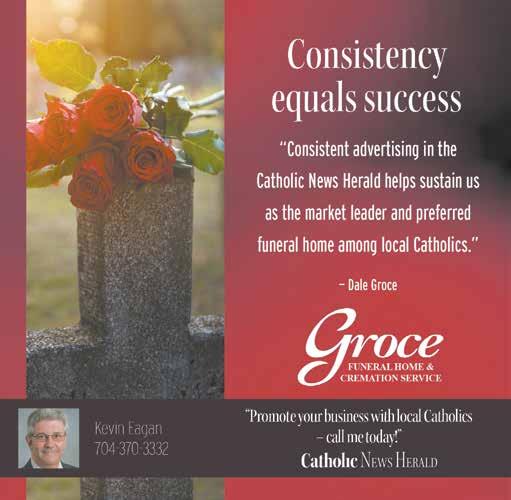
En un momento emotivo después de la Misa, fuera del alcance de ojos y oídos de la mayoría, el Obispo Martin expresó su sincera gratitud al párroco de Nuestra Señora de la Gracia, Padre Casey Coleman, por el ramillete espiritual de oraciones de los feligreses, incluidos los que acababa de confirmar. Luego, el obispo dio la bienvenida a un grupo de niños pequeños que se apresuraron a acercarse a él pidiéndole que firmara sus programas y posara para las fotos. Después de una foto grupal con los recién confirmados, se mezcló con las familias en el salón parroquial.
FOMENTANDO UNA FE ACTIVA
En la Iglesia San Gabriel en Charlotte, en su segundo domingo como obispo, el Obispo Martin ofreció Misa y confirmó a dos candidatos.
En su homilía, comparó el trabajo requerido para planificar una boda con el esfuerzo necesario para construir la vida de fe. También relacionó la ocasión con su reciente ordenación, señalando cómo su madre dijo que era el mejor día de su vida, y de la suya, y bromeando sobre las expresiones de incredulidad de sus tres hermanas que siguieron.
“Pero el mejor día de mi vida es algo grande, ¿verdad? Sabemos que hay muchas cosas que están detrás. ¿Y estamos dispuestos a hacer la obra invisible de hacer que nuestras vidas reflejen la gloria de Dios?”, preguntó a la congregación. “No tiene que ser tan bueno como lo es ahora. Los mejores días de nuestras vidas pueden estar por venir, y eso no significa que deba tener una gran celebración de ordenación. Dios sabe que puede significar muchas cosas diferentes para muchos de nosotros, independientemente de nuestra edad”.
Los feligreses de San Gabriel dijeron que la homilía del Obispo Martin resonó profundamente en ellos y que se quedó para saludar a una fila de al menos cien feligreses.
Durante su visita, también fue al parque de juegos infantiles de San Gabriel para saludar y bendecir a padres e hijos. “Corry y yo conocimos al obispo antes de Misa, y nos quedamos impresionados con su humildad mientras interactuaba con los niños pequeños en el playground”, dijo la feligresa Sharon Broxterman. “Cuando
un niño pequeño le preguntó: ‘¿Cómo te llamas?’, él respondió: ‘Michael. ¿Cuál es el tuyo?’”.
El 11 de junio, en Belmont Abbey College, el Obispo Martin ofreció Misa y habló con los jóvenes que discernían sus vocaciones en el campamento de verano Quo Vadis Days de la diócesis.
“Nunca había conocido a un obispo en persona”, dijo Raphael Lugo, de 17 años, miembro de la parroquia Inmaculada Concepción en Forest City. “Lo acabo de ver en la pantalla y en fotos. Fue una experiencia realmente ‘cool’. Es fácil de tratar y parecía estar interesado por todos los que estábamos allí”.
Con una agenda tan apretada, la magnitud del papel del Obispo Martin se está apreciando rápidamente.
Jim Kelley, director de desarrollo de la diócesis durante casi 40 años, ha trabajado con cuatro de los cinco obispos de la diócesis.
“El Espíritu Santo guía la selección de obispos en la Diócesis de Charlotte”, dice. “Cada obispo ofrece nuevas oportunidades y aporta sus dones únicos para servir a la gente del oeste de Carolina del Norte”. Cada uno, dice, ha enfatizado tres aspectos clave: guiarnos al cielo, fomentar una relación más cercana con Jesús y alentar la participación en nuestras comunidades eclesiales. El Obispo Martin ya ha abordado estas tres prioridades”. Por su parte, el Obispo Martin está saliendo al encuentro de tanta gente como puede. Dado que no puede viajar inmediatamente a todas partes en las 20.000 millas cuadradas de la diócesis, la próxima semana enviará una carta de saludo a todos los hogares registrados en la diócesis. En ella, anima a todos a comprometerse con su comunidad de fe local de la manera que puedan, relatando una visita reciente a la Escuela San Patricio en Charlotte: “Una niñita me dio una tarjeta con estas palabras de aliento escritas con crayola: ‘¡Tú puedes!’ ¡De la boca de los niños! Comparto ese mismo mensaje con todos ustedes, mis hermanos y hermanas. Cuando pensemos que nuestra respuesta a Jesús no es lo que podría ser, escuchemos la voz del Espíritu Santo dentro de nosotros, con la inocencia y la sencillez de los niños, recordándonos: ‘¡Tú puedes!’”.
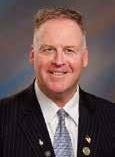
LOUISVILLE, Ky. — Below is a roundup of discussions and decisions by the U.S. Conference of Catholic Bishops during their June 12-14 spring assembly: U.S. bishops pass new youth, young adult pastoral framework – first in nearly 30 years
The bishops passed a new national pastoral framework – 30 years after their last effort –titled “Listen, Teach, Send: A National Pastoral Framework for Ministries with Youth and Young Adults” upon securing the necessary votes days after the conclusion of its Spring Plenary Assembly. Initially falling short of the two-thirds threshold needed to pass by two votes at the in-person assembly, the USCCB in Washington announced June 18 the framework passed with 188 votes in favor, four against, and four abstentions, following a canvass of bishops eligible to vote.
Bishop Robert E. Barron of Winona-Rochester, Minnesota, head of the Committee on Laity, Marriage, Family Life and Youth, introduced the framework June 13 at the bishops’ assembly. It is designed to support pastors, ministry leaders, families, and young people in evangelizing their peers and addressing issues such as sexuality, mental health, disaffiliation and racial justice, inviting them to a path of “missionary discipleship and Christ-like leadership.” Bishop Barron highlighted that the U.S. bishops’ last direct engagement with youth and young adult ministry was the 1993 World Youth Day and two national frameworks released in the 1990s, and since then “enthusiasm has waned and disaffiliation has risen.” The framework aims to invigorate youth and young adult ministries, following the 2018 Synod on Young People and Pope Francis’ 2019 exhortation “Christus Vivit.” U.S. bishops’ mental health campaign gaining ‘a lot of traction’ amid national crisis
The launch of a mental health initiative by the U.S. bishops last year has “received a lot of traction,” according to Bishop Robert E. Barron, who updated his fellow bishops on the National Catholic Mental Health Campaign during a June 13 session. Bishop Barron and executives from Catholic Charities USA provided a progress report on the campaign, which was launched in October 2023 and led by Bishop Barron and Archbishop Borys A. Gudziak of the Ukrainian Catholic Archeparchy of Philadelphia, who chairs the USCCB’s Committee on Domestic Justice and Human Development.
From diocesan and parish-level discussions to creating what CCUSA president and CEO Kerry Alys Robinson called a “trauma-aware Church,” Catholics can help those suffering from mental distress by countering stigma, developing practical resources and accompanying those who are suffering, said campaign leaders. “Our dream is to have all Catholics across the country praying, talking about, learning and advocating for spiritual and mental well-being in our dioceses,” Bishop Barron said.
The bishops approved a new pastoral plan for Indigenous Catholics, almost half a century since the last such document. “Keeping Christ’s Sacred Promise: A Pastoral Framework for
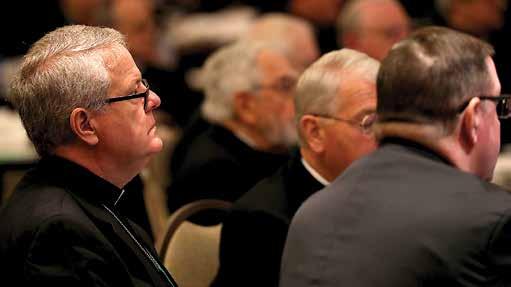
Indigenous Ministry” was approved by a vote of 181 to 2, with 3 bishops abstaining. The 56-page text was developed by the Committee on Cultural Diversity in the Church and its Subcommittee on Native American Affairs of the U.S. Conference of Catholic Bishops. Along with acknowledging and apologizing for the Church’s role in decimating Indigenous cultures in the U.S. – particularly through the residential school system and the nowrepudiated “Doctrine of Discovery” – the fivepart plan focuses on calls for healing, mission, reconciliation, holiness and transformation in ministry to the nation’s Indigenous Catholics, whose “journey … in the United States of America has been marked by moments of great joy but also of profound sorrow,” the document states. “Through this pastoral framework, we … hope to begin anew a journey of mutual accompaniment with the Catholic Indigenous Peoples of these lands,” the document states.
Bishop Mark J. Seitz of El Paso, Texas, chair of the U.S. Conference of Catholic Bishops’ Committee on Migration, had some grim news for his brother bishops at the assembly. In remarks June 14, he gave the prelates an update on the federal Temporary Religious Worker Visa immigration program, which almost 90% of American dioceses rely on to staff their pulpits with foreign-born priests and their ministries with religious sisters, brothers and laypeople.
The federal government announced in a March 2023 Federal Register notice a procedural change in how it processes green cards for foreign-born religious workers. The practical implication is that – combined with dwindling native vocational numbers and historically high immigration – some foreign-born priests and religious sisters and brothers relied upon by U.S. dioceses may not be able to remain in the country.
Bishop Seitz said the USCCB’s Department of Migration and Refugee Services conducted a survey of Catholic institutions to learn more about “their reliance on foreign-born religious workers” and the results confirmed “this situation is only expected to worsen with time, if not addressed.” A forthcoming regulation
would shorten the time required for temporary religious workers to be outside the United States between R-1 visas, but Bishop Seitz said only Congress can provide a long-term solution. He urged the bishops to press their own congressional delegations to address the issue.
The bishops engaged in a respectful debate June 14 on how best to proceed with a proposal for a national directory of instituted lay ministries, advanced by the USCCB president, Archbishop Timothy P. Broglio. Pointing to Pope Francis’ recent decision to not only permit women to be instituted acolytes and lectors, but also to establish the catechist, an ancient office in the Church, as an instituted lay ministry, Archbishop Broglio said this development was needed to help answer key questions, such as the theological understanding of these vocations, their formation, minimum ages, the duration of the ministry, how they relate to the pastor and the diocese, among considerations needed to implement these ministries effectively. He said the Canadian and Latin American episcopal conferences also share these concerns.
Many bishops expressed the urgency of instituting catechists, and the importance of having catechists in the Church who would be well-formed.
Others expressed concern that instituted ministries not be turned into a clerical caste for the laity. Cardinal Joseph W. Tobin of Newark, New Jersey, told the bishops that his archdiocese had 1,000 catechists, most of whom are from Latin America, and he expressed concern that the approach to formation, not lead to a “professionalization” that would effectively exclude most of them.
Other bishops emphasized that Latin America has an appreciation of the catechist’s vocation that the body of bishops should heed and learn from their experience.
The cause for the canonization of a Belgian immigrant who experienced three apparitions of Mary in the Wisconsin wilderness in 1859
and dedicated her life to children’s catechesis will move forward, U.S. bishops determined June 13. Green Bay Bishop David L. Ricken, who declared in 2010 that Adele Brise’s apparitions were worthy of belief, presented the proposal during a consultation at the U.S. bishops’ Spring Plenary Assembly. Brise’s apparitions are the only U.S. Marian apparitions declared “worthy of belief.”
“The virtuous life and sanctity of Adele still has relevance to people today, first of all her simple obedience,” Bishop Ricken said June 14. “Adele demonstrated heroic obedience to her family, to her parish priest, to the bishop, to Our Lady and ultimately to Our Lord and His will for her. Her obedience was often accomplished by great acts of faith.”
Brise also exemplifies freedom from idleness and a model for catechesis and the new evangelization, Bishop Ricken said. Before a cause is open, Church law requires diocesan bishops to consult with the Christian faithful, the Holy See and other bishops. The June 14 vote, which passed with a unanimous voice vote, fulfills the latter condition. When a sainthood cause is officially opened, the candidate receives the title “Servant of God.”
The bishops addressed various issues, including re-evaluating their domestic initiative to fight against poverty, the Catholic Campaign for Human Development, and a final update on the National Eucharistic Congress and the future efforts of the National Eucharistic Revival. Behind closed doors, the bishops discussed the future of the Catholic Campaign for Human Development, their domestic anti-poverty initiative, which has suffered in recent years from declining donations and questions about grantmaking decisions that had depleted its funding reserves.
In a June 13 press conference, Archbishop Timothy P. Broglio of the U.S. Archdiocese for Military Services USA and the president of the USCCB, told reporters that no decisions had been made yet. But he emphasized the bishops remain committed “to the vital work of fighting poverty in this country” and that the subcommittee responsible for overseeing CCHD would review the bishops’ input and act on that advice.
The bishops also heard proposals from the National Review Board to combat sexual abuse through a new study of recent credible allegations and guidelines addressing sexual and spiritual abuse of adults.
They approved a message to Pope Francis, praying for global peace and thanking him for sending Cardinal Luis Antonio Tagle to the upcoming National Eucharistic Congress. They voted on several liturgical texts completing their work on the new English translation texts of the Liturgy of the Hours and the Roman Missal. The bishops’ chair of the Committee on Divine Worship, Bishop Steven J. Lopes of the Ordinariate of the Chair of St. Peter, told the bishops that their votes represented the culmination of 12 years of work. Finally, Bishop Andrew H. Cozzens, chair of the National Eucharistic Congress, updated the bishops on the strong participation indicated in the national Eucharistic pilgrimages and upcoming July 17-21 Eucharistic congress in Indianapolis, as well as future initiatives to strengthen Catholic faith and Eucharistic devotion.
VATICAN CITY — Condemning the killing of Christians in Congo, Pope Francis said the sacrifices of modern martyrs are seeds that grow into examples of Christian witness for the Church.
After praying the Angelus in St. Peter’s Square June 16, the pope referenced the “painful news” of violence in eastern Congo where over 120 people were reported to have been killed by suspected Islamist rebels in recent weeks. Local officials have said the Allied Democratic Forces (ADF), a rebel group affiliated to the Islamic State, were responsible for the attacks.
“Among the victims, many are Christians killed in ‘odium fidei,’” in hatred of the faith, Pope Francis said. “They are martyrs. Their sacrifice is a seed that germinates and bears fruit, and teaches us to bear witness to the Gospel with courage and consistency.”
Open Doors International, a nondenominational organization supporting persecuted Christians worldwide, said that at least 80 Christians, Catholics and members of other Christians churches, were killed in the North Kivu province of Congo between June 4-8.
Pope Francis called on Congo’s leadership and the international community to “do everything possible to stop the violence and safeguard the lives of civilians.”
Before praying the Angelus, the pope reflected on the day’s Gospel reading from St. Mark in which Jesus relates the kingdom of God to the image of a seed.
Just as a farmer must learn how to “wait confidently” for a seed to sprout to ensure an abundant harvest, God patiently waits “without ever ceasing to accompany us” so that the “seeds of His word and His grace” grow within Christians and bear spiritual fruits, he said.
Pope Francis said God waits patiently and attentively for spiritual fruits to grow “because He wants nothing in His field to be lost, that everything should reach full maturity; He wants us all to be able to grow like ears of grain.”
“By doing so, the Lord gives us an example,” the pope said.
“He teaches us too to sow the Gospel confidently wherever we are, and then to wait for the seed that has been sown to grow and bear fruit in us and in others.”
He added that God’s example shows Christians how to wait for their spiritual harvest “without becoming discouraged and without ceasing to support and help each other even where, despite our efforts, we do not seem to see immediate results.”
“In fact, often even among us, beyond appearances, the miracle is already underway, and in due course it will bear abundant fruit!” he said.
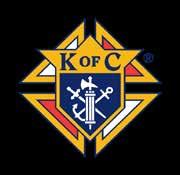
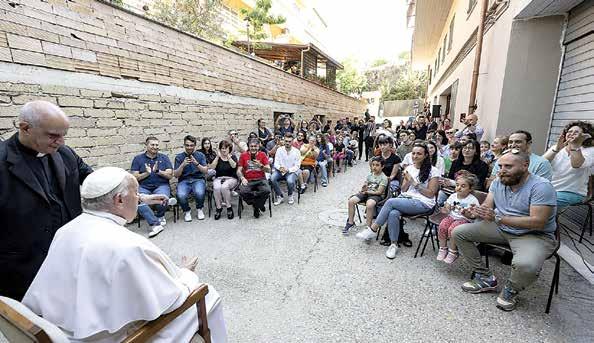
ROME — Pope Francis led his “School of Prayer” outside on a concrete driveway leading to a series of parking garages under a 30-family condominium on the outskirts of Rome.
“The church begins to take shape in the community, seeking together, listening to the word of God, speaking well of each other,” he told about 60 residents of the apartment building: children, teenagers, adults and older people. A group of women from Senegal, an Orthodox man and the district president were also present, Vatican News reported.
“What matters is respect for others, and with that respect you go forward and build up the Church,” making sure to include and accompany children and the elderly, he said during the visit June 6, a portion of which was released in video.
“A parish where children are not listened to and where the old are blocked out is not a true Christian community,” he said.
The pope’s late afternoon visit to the families was not announced in advance by the Vatican and came as a big surprise to the residents, whose local parish is the Church of St. Brigid of Sweden in Rome’s Palmarola neighborhood.
One woman rushed down the stairs fixing her hair, others were wearing house slippers.
The pope’s white Fiat pulled onto the sloping driveway, which had a large metal gate that was eventually closed shut. He greeted the families and children from his wheelchair, and an aide handed out candy.
One woman told her small squirming toddler, “Look, look! Did you know that is Jesus’ friend?”
Brown plastic chairs had been set up for the residents and an upholstered wooden armchair for the pope in the driveway which was enclosed by a large wall of cut rock and brick with pockets of vegetation sprouting out of the seams.
The visit was the third appointment of his “School of Prayer,” a series of visits he has been making during the Year of Prayer in preparation for the Holy Year 2025. The visits are coordinated by the section of the Dicastery for Evangelization that is organizing the Holy Year.
The pope asked the residents if they had “any reflections or something nice” to share.
One woman said how much she has appreciated his words, initiatives and presence. “From World Children’s Day, your speeches, what we get is a father who leads a large community in small things, in true things.”
“Seeing you here in front of a brick wall is the most moving thing,” she said. “It makes us feel that you are part of our community. … This is the church of Christ; it is the Church that is stripped down to be a human church, so thank you.”
According to Vatican News, the pope spoke about the family, its challenges, its beauty and potential for the Church and society, in a brief informal catechesis and in a 45-minute Q&A session.
“Let’s defend the family, which is essential for raising children,” he said, acknowledging the difficulties or “storms” families will face. ‘’If parents argue, it’s normal, but they should make peace before the end of the day” and show that they do love each other.
Families should always use the three words that are essential for making a relationship work: “Sorry, please and thank you,” he said.
“The children are watching us,” he said. Parents who are separated should not bad-mouth each other and should teach their children about respect. Always talk to your children, the pope told them. “Education happens through dialogue” and make sure they “understand that they can talk about everything.”
“Life’s lessons are learned at home,” he said, “not from others who may teach who knows what.”
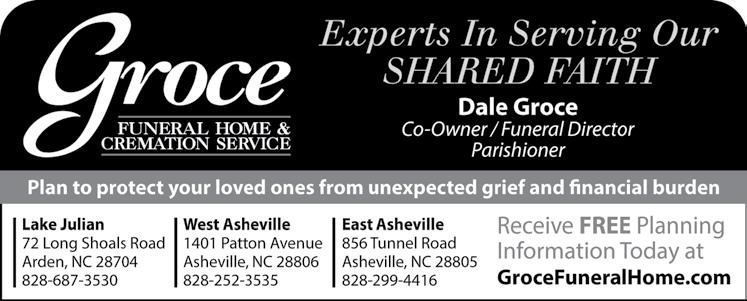
VATICAN CITY — Today’s businesses must focus their innovation in caring for the environment, Pope Francis recently told a group of leaders of major companies and banks.
“It is no longer enough merely to comply with the laws of states, which are proceeding too slowly: We need to innovate by anticipating the future, with courageous and forward-looking choices that can be imitated,” he said. “We are living in a time of serious environmental crisis that depends on many individuals and factors, among which are the economic and business choices of the past and present,” he said during a June 15 Vatican audience that included 25 CEOs who are part of a Sustainable Markets Initiative.
The pope gave them three tasks: to help care for the environment, the poor and young people. He warned against a kind of “meritocracy” that is used to legitimize excluding the poor, “who are judged as undeserving, even to the point of viewing poverty itself as their fault.”
“And let us not settle for merely a little philanthropy, that would be insufficient,” he said. “The challenge is to include the poor in businesses, to make them resources for the benefit of all.”
VATICAN CITY — Political leaders have
a responsibility to create the conditions necessary for artificial intelligence to be at the service of humanity and to help mitigate its risks, Pope Francis told world leaders.
“We cannot allow a tool as powerful and indispensable as artificial intelligence to reinforce such a (technocratic) paradigm, but rather, we must make artificial intelligence a bulwark” against the threat, he said in his address June 14 at the Group of Seven summit being held in southern Italy.
“This is precisely where political action is urgently needed,” he said. Many people believe politics is “a distasteful word, often due to the mistakes, corruption and inefficiency of some politicians – not all of them, some. There are also attempts to discredit politics, to replace it with economics or to twist it to one ideology or another,” he said. But the world cannot function without healthy politics, the pope said, and effective progress toward “universal fraternity and social peace” requires a sound political life.
The pope addressed leaders at the G7’s special “outreach” session dedicated to artificial intelligence. In his speech, the pope called artificial intelligence “an exciting and fearsome tool.” It could be used to expand access to knowledge to everyone, to advance scientific research rapidly and to give “demanding and arduous work to machines.”
“Yet at the same time, it could bring with it a greater injustice between advanced and developing nations or between dominant and oppressed social classes, raising the dangerous possibility that a ‘throwaway culture’ be preferred to a ‘culture of encounter,’” he said. Like every tool and technology, he said, “the benefits or harm it will bring will depend on its use.”
VATICAN CITY — Pope Francis said he hopes the spirit of openness and dialogue embodied
in synodality remain the norm for the Catholic Church after the current Synod of Bishops comes to a close. The pope told the moderators of Church movements June 13 that his hope is that “synodality remain as the permanent way of acting in the Church at all levels, entering in the hearts of all pastors and faithful until it becomes a shared ecclesial style.”
The “most important thing from this synod on synodality is not so much dealing with this or that issue,” the pope said. “The most important thing is the parish, diocesan and universal journey in synodality.” Pope Francis said that humility and an openness to other people and ideas are “synodal virtues,” and he told participants that ecclesial movements are meant to be at the service of the Church and not seen as “a superior thing” within the Church.
“Closed movements should be canceled,” he said; “they are not ecclesial.”
VATICAN CITY — The only way to achieve true, stable and just peace is by having all sides of a conflict involved in dialogue, Cardinal Pietro Parolin, Vatican secretary of state, said at a peace summit in Switzerland. “The Holy See expresses its hope that the diplomatic effort currently being promoted by Ukraine and supported by so many countries will be improved, in order to achieve the results that the victims deserve and that the entire world is hoping for,” he said in his speech June 16.
Upon Ukraine’s request, Switzerland organized a Summit on Peace in Ukraine, which was held at a resort overlooking Lake Lucerne in the Canton of Nidwalden June 15-16. Cardinal Parolin, who led the Vatican delegation, said, “It is important to reiterate that the only means capable of achieving true, stable and just peace is dialogue between all the parties
involved.” “In the face of war and its tragic consequences, it is important never to give up, but to continue to seek ways to end the conflict with good intentions, trust and creativity,” he said. The Vatican “remains prepared to assist in the implementation of potential mediation initiatives that are acceptable to all parties and benefit those who have been affected,” he said.
VATICAN CITY — Pope Francis met individually with several world leaders at the Group of Seven summit in southern Italy, including with U.S. President Joe Biden and Ukrainian President Volodymyr Zelenskyy. It was the first time a pope attended the annual summit, which brings the leaders of the world’s wealthiest nations together to discuss some of the most urgent current issues.
Among the many topics the June 13-15 summit focused on were migration, climate change and development in Africa, artificial intelligence, and the situation in the Middle East and Ukraine.
During the closed-door meeting between Biden and the pope, a short video clip released to the press showed the U.S. president greeting the pope and remarking immediately about what an impression the pope’s words made on his family when his son, Beau, died of cancer in 2015. Biden presented the pope with a large square ceramic dish with a reproduction of the fresco visible through the oculus of the dome of the U.S. Capitol’s rotunda depicting George Washington exalted in heaven. “It’s not the Vatican, but…,” Biden said as the interpreters laughed. In a clip showing the end of the meeting, the pope said, “Pray for me. I pray for you.” The president replied, “I promise I do.” — OSV News

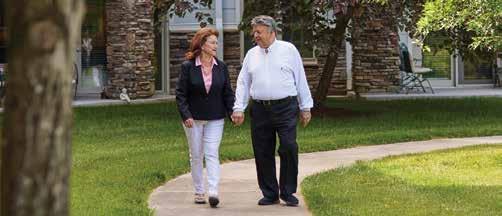
Abundant amenities and a unique way of life
e Pennybyrn lifestyle is packed with amenities. Living here, you’ll swim laps in a stunning, indoor heated saltwater pool, stay t in a well-equipped facility and power walk, bike or stroll along scenic walking trails. Even membership at Jamestown Park Golf Course is included!
ere’s also the Pennybyrn di erence… and this is what truly sets us apart. You’ll nd a lovely Peace Chapel, a not-for-pro t mission to serve all faiths,
a smaller population for personalized service and inclusiveness that means your voice will always be heard.
A thoughtfully designed home
Your private residence at Pennybyrn—chosen from among a variety of oor plans and prices— will feature a bright, open design with plenty of natural light, a well equipped, modern kitchen, washer and dryer, high ceilings and a private porch, balcony or patio.
Most cottages include an attached garage or carport, and many o er a cozy replace. Inspiring lifestyle choices
In a friendly neighborhood, and among sociable friends, you’ll explore a wealth of programs that are planned and shaped by fellow residents. Quiet times will nd you gathering in beautiful outdoor areas and inviting indoor spaces— including world-class dining choices and a true Irish Pub.
A secure future
Our purpose at Pennybyrn is to make sure that your vibrant lifestyle is enjoyed with the lifelong support, assurance and bene ts of a Life Plan Community.
Retirement Living • Assisted Living Memory
•

Ordaining priests is the greatest privilege that I have as a bishop. Period. When, at the high point of the ceremony, I place my hands on the head of a deacon and call forth the Holy Spirit upon him, I stand in the tradition of the Apostles, who similarly laid hands on those to whom they imparted authority. I can testify that nothing in my life has ever made me feel more humble and more grateful.
There are three great promises that a man makes when he accepts ordination as a deacon and then as a priest, and each one of them is a marvelous countersign to our culture today. First, he promises to recite faithfully the Liturgy of the Hours, that wonderful compilation of psalms, hymns and prayers offered at five points throughout the day. I have been engaging in this prayer for the past 38 years of my priesthood, and I can testify that, though sometimes challenging, it has been a tremendous source of spiritual strength. It involves, to put it simply, the steady and conscious consecration of time.
PRAYER: REJECTION OF SOUL-KILLING SECULARISM
As so many studies have shown, younger people today in the West are rapidly secularizing themselves and disaffiliating from the institutional churches. They constitute the first generation in human history that is coming of age without a keen sense of the transcendent. This emptying out of the sacred has wreaked havoc in the minds, hearts and souls of this generation, among whom the numbers measuring anxiety, depression and suicidal thoughts have been spiking. Therefore, when a young man makes a solemn promise before God and his community that he will, for the rest of his life, pray the Liturgy of the Hours every day, he is standing opposite this soulkilling secularism. He is declaring that God exists and that God matters.
CELIBACY: A PATH TO FREEDOM FOR SERVICE
The second promise that a man makes is to live celibately. I know it has been said a thousand times, but it bears repeating: Celibacy is not a denigration of sex and marriage! We ought always to avoid a dualistic interpretation of celibacy, in which the renunciation of marriage is construed as a sort of judgment on physicality or pleasure.
So what is the right way to think of celibacy? It is, first, a path of freedom. Without a spouse and children – and all of the responsibilities that come with having a family – a celibate man can dedicate himself entirely to God and the people he serves.
As I type these words, I can see my bishop’s ring, which is not simply a sign of my office but also a wedding ring, for it signifies my devotion to the people the Lord has entrusted to me. St. Paul clearly teaches: “The unmarried man is anxious about the affairs of the Lord, how to please the Lord; but the married man is anxious about worldly affairs, how to please his wife, and his interests are divided” (1 Cor 7:32-34).
Even now, celibacy provides a witness as to the way we will love in heaven, where, as Jesus said, “we neither marry nor are given in marriage.”
This doesn’t mean, of course, that heavenly love is less than married love here below; on the contrary, it is greater, more intense, fuller and richer. How indispensable that, in a society practically obsessed with sex and sexual freedom, there should be, living among us, men who embody a spiritualized form of love.
OBEDIENCE: LETTING GO OF MY AGENDA
The third and final promise a man makes at his ordination is to obey his bishop. “I promise obedience to you and your successors,” he says as he places his hands, in the manner of a feudal vassal, in the hands of the ordaining prelate.
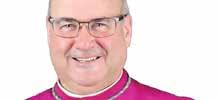
n the 50th anniversary of his priestly ordination, then Pope John Paul II described every vocation as a “gift and mystery.” The late Holy Father’s words provide a lens into the origin of every priestly vocation.
Career aspirants rarely find “the priesthood” listed at job fairs, and with good reason. One does not become a priest from personal choice alone, as if the priesthood were one option among many. The genesis of every priestly vocation belongs to God. At his ordination, every priest receives a totally unmerited and gratuitous gift that does not originate in himself.
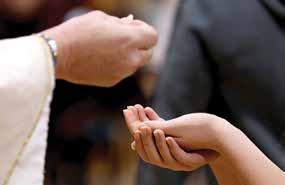
“While a vocation does bring us joy and should be something that we are good at, it is not primarily concerned with either of these things. As the word indicates, a vocation – from the Latin vocare, “to call” –is something that comes from outside and for the sake of something other than ourselves. Against the values of the world that tell us to never do anything we do not like and to think of our own happiness first, someone with a vocation is concerned most with the needs of the caller rather than their own, willing to sacrifice their own immediate happiness and comfort for the sake of the call. For them, there is a mission much greater than themselves at stake and they are willing to do whatever it takes to fulfill it. Sometimes, this means accepting that what we want to do and what we are good at is not what the world needs.”
I vividly remember when I did this on the day of my ordination, placing my hands in those of Cardinal Joseph Bernardin of Chicago, whom I barely knew, and vowing to do, within the limits of law and morality, whatever he or his unnamed and unknown successors would ask me to do. At that moment, I surrendered my “career” – which is to say, any plan or trajectory that I would set for myself. I put my life in the hands of my bishop, trusting that, through his will, the Holy Spirit would direct me.
— Franciscan Father Casey Cole in “Called: What Happens After Saying Yes to God”
Once more, how strange this move seems today! One of the most fundamental values for people now is self-determination – not only about the direction of one’s life, but the very meaning of it. I have often referred to ours as “the culture of self-invention.”
Whereas the default position of most young people today is that their lives belong entirely to them, the priest, on the day of his ordination, says that his life does not belong to him at all, but rather to God and for God’s purposes.
BISHOP ROBERT BARRON is the founder of Word on Fire Catholic Ministries and bishop of the Diocese of Winona-Rochester, Minnesota.
Such a noble inheritance does beg the question, however: Why priests? Couldn’t the omnipotent God effect His saving work without them? He certainly could. But the very Author of salvation, who orders all things toward their proper end, chooses instruments to carry out His divine plan. Students of theology need look no further than the dogma of the Incarnation to reinforce this axiom.
St. Thomas Aquinas teaches us that nothing obligated the Son of God to take on human flesh. The Incarnation belongs to fittingness, not necessity. What better way could God prove His mercy for us, than to hand over His only begotten Son, whose perfect sacrificial oblation to the Father signifies the love of one who lays down his life for his friends? A fitting reason, indeed, for in Jesus, we have access to God.
After Philip wishes to see the Father in the Gospel of John, Jesus retorts, “Have I been with you for so long a time and you still do not know me, Philip? Whoever has seen me has seen the Father” (Jn 14:9). Jesus, who is God, gives us access to the Father. In many ways, the priest continues this divine mirroring in time.
Through his configuration to Christ, the priest shares in a most noble transmission of divine paternity for a world in need of authentic fathers. Fathers lead, protect and provide for their families. But what distinguishes an authentic father from a fraudulent one is his willingness to sacrifice – to give himself entirely for his bride and his family.
Priestly fathers are no different. When he offers the sacred species of bread and wine on the altar, the priest doesn’t explain what Christ did. Rather, he effects Christ’s saving work in his very person, uttering not “This is His body,” but rather “This is My body.”
The divine election of every priest thus serves to continue God’s saving work through the gift of self. The man who receives this gift can only turn in gratitude to the God who makes him a bridge between heaven and earth. He will never grasp the fullness behind his divine election, especially because of his personal unworthiness. But the mystery at the heart of every vocation does give a priest a renewed opportunity for wonder and awe. God has done this, not him. His response is in imitation of the Master: “How shall I repay the Lord for His goodness to me? The chalice of salvation I will raise” (Ps 116:12). The Church begs the Lord to open the ears of these men He has predestined to serve at His altar, so that they might hear His voice and open wide the door when He knocks. The inheritance that awaits these men belongs to the mystery of a God who never ceases to give.
BISHOP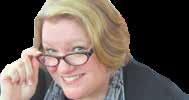
Elizabeth Scalia
As summer arrives, it is good to recall that the Church dedicates the entire month of June to the Sacred Heart of Jesus, recognizing it as a mighty source of hope and immeasurable consolation. No matter how much we plunder the depths of the heart of Christ, we discover that we may go deeper still.
The Sacred Heart is rather like the “Cabinet of Curiosity” featured in several of Terry Pratchett’s “Discworld” books – a mysterious structure no one fully understands yet everyone instinctively knows is vital to the proper functioning of, well, all things.
To the human eye, the cabinet looks like an ordinary antique with bowed legs and clawed feet, but opening it reveals endless spaces branching off in more directions than can be seen. The cabinet’s
“the safest place” of protection and solace we all seek and need in our lives.
As the saying goes, after 39 years of parenthood, “I’ve seen some things” and learned a few lessons:
First: Parents mustn’t blink, and not just because our children can paint dogs, flush car keys and fall out of trees in a half-second, but because time advances with flummoxing speed. Now they are in possession of driver’s licenses – your sleep officially ends; next they are moving out, being grown-ups. One day they walk in and show you their first gray hairs. Yes, it happened that fast. All we can do is wonder how many things we missed with what seemed the flick of an eyelid.
‘For parents, the Sacred Heart is ... the place into which we can safely place every mental and spiritual ache, every anxiety and fear.’
inexplicable interior width and breadth are able to contain an infinite number of artifacts while wizards zoom about, exploring its vastness so far into the distance they can barely be detected, rather like the atoms that hold us together.
Depending on the artist’s representation, the Sacred Heart of Jesus – which certainly holds me together – can look like a flaming, thorn-crowned valentine or a colorful abstract of pulsing movement. From a sideways perspective, especially if one is science-minded, the Sacred Heart can resemble a never-ending Mandelbrot Set. It can even look like a functional human heart: chambers with open vessels by which it receives what it needs to function – the will of God, the flaming love of the Lord and the oxygen of our own trusting prayers.
My devotion to the Sacred Heart came with parenthood. As a young mother, depictions of the heart of Christ began following me around – as though Jesus was leaving me mash notes – until I was forced to give the devotion some attention.
After decades of contemplation, the praying of countless litanies and a home enthronement, I can no more gauge the true immensity of this “abode of justice and love” now than I could back then. I am left pondering the Heart of Christ as a continual empathetic outreach, offering

Second: Regret is a low demon that creeps in on the small, nighttime doubts and recriminations that every parent sometimes feels, blasting reminders of our mistakes. Every parent will have regrets – some parental remorse is always warranted – but entertaining demons so pathetic that they’re assigned to spend eternity rehashing harangues is simply wasting the fire that leaps from the Sacred Heart of Jesus to purge, cleanse and restore. Consign the doubts (and the demon) into those flames of love and that huge heart, and relax.
Third: The Sacred Heart of Jesus is the refuge of parents. Truly, it is the refuge of all of us, but for parents, the Sacred Heart is the mysterious, otherworldly and supernatural thing that pulls us back from the edges of every anxiety because it is an actual “abode.” It is the place into which we can safely place every mental and spiritual ache, every anxiety and fear.
SOURCE OF ALL CONSOLATION
My elder son just pulled up to show me his new motorcycle – a beautiful contraption that instantly filled my heart with unspeakable maternal dread. Do you know how many bad things can happen to your child on a motorcycle? I do! I imagined every one of them in a nanosecond.
And then I hugged my graying little boy – because he is forever my little lad –and wished him luck and acknowledged him for a prudent, careful man whose bike needed a blessing. Going inside for holy water, I immediately turned to the enthroned Sacred Heart and imagined shoving my entire son, every bit of my imaginative terrors and that distressing motorcycle, deeply – as deeply as my own heart could reach – into that mysterious and colossal “source of all consolation.”
And yes, I am consoled.
ELIZABETH SCALIA is editor-at-large for OSV. She posts on X (formerly Twitter) as @theanchoress.
‘Let us remember that the protagonist of the synodal journey is the Holy Spirit, not us. He alone teaches us to listen to God’s voice, individually and as the Church.’
Pope Francis
From online story: “Pope says synodality should be ‘permanent way of acting in the Church’”
The Catholic News Herald reached the Facebook and Instagram feeds of more than 350,000 people in English and Spanish last month. The most talked about post? Coverage of Bishop Martin’s ordination. Join the conversation: www.facebook.com/ CatholicNewsHerald.
On YouTube in June so far, videos produced by the Catholic News Herald have been viewed more than 55,500 times. The most popular video? The ordination of Bishop Martin.
So far this month, 38,900 visitors to www.catholicnewsherald.com have viewed a total of 81,895 pages. The top trending headlines are:
ordination
the conversation online
The Catholic News Herald welcomes letters from readers. We ask that letters be originals of 250 words or fewer, pertain to recent newspaper content or Catholic issues, and be written from a perspective of Christian charity.
To be considered for publication, each letter must include the name, address and daytime phone number of the writer for purpose of verification. Letters may be condensed due to space limitations and edited for clarity, style and factual accuracy.
The Catholic News Herald does not publish poetry, form letters or petitions. Items submitted to The Catholic News Herald become the property of the newspaper and are subject to reuse, in whole or in part, in print, electronic formats and archives.
E-mail: catholicnews@rcdoc.org
Mail: Letters to the Editor Catholic News Herald 1123 S. Church St. Charlotte, N.C. 28203


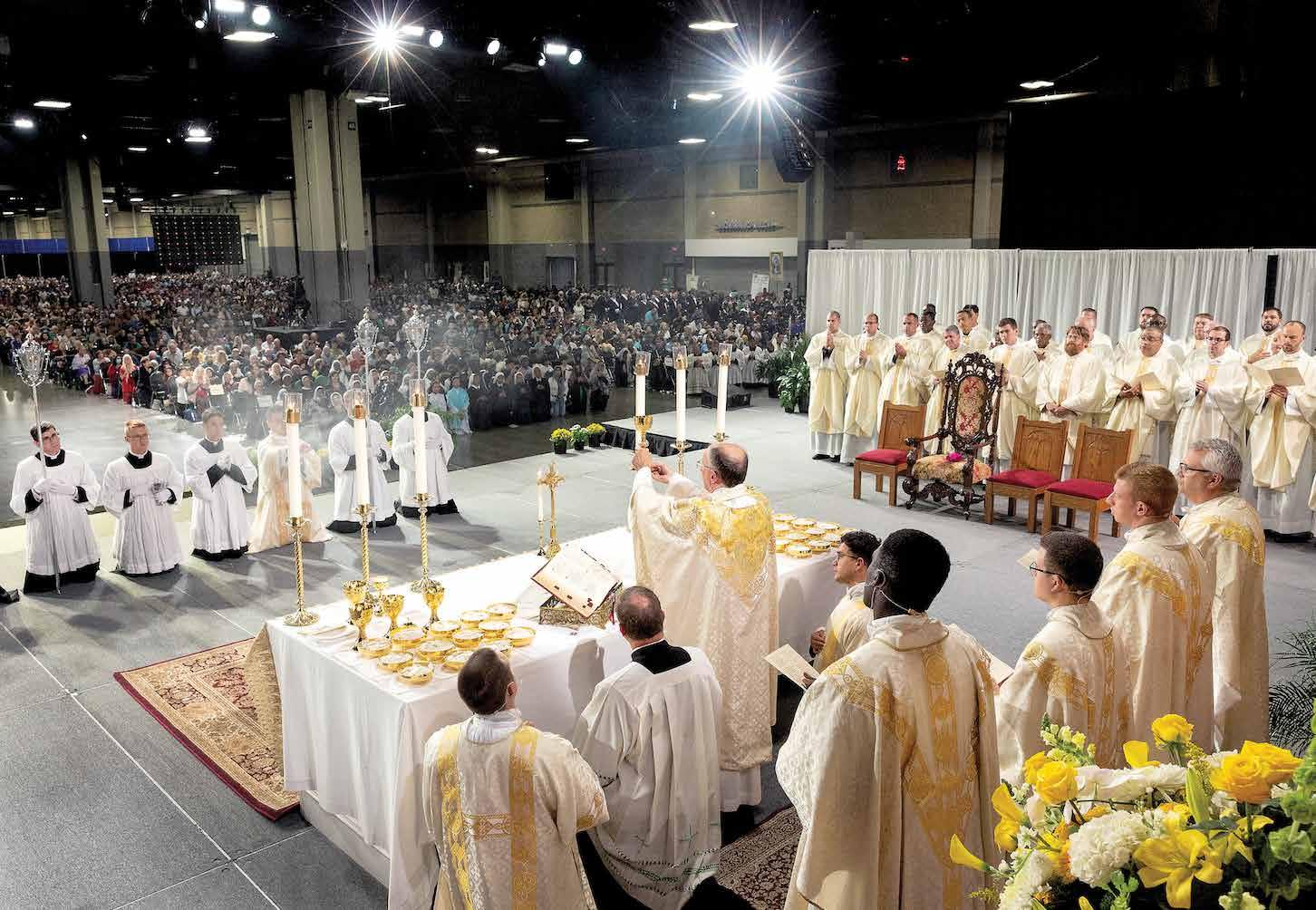
20th Eucharistic Congress

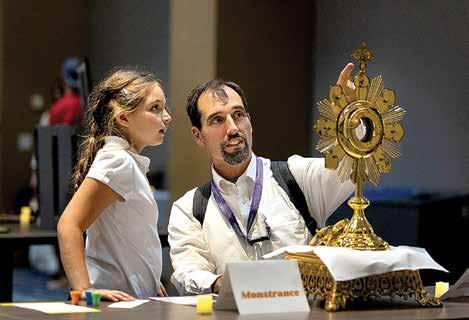
Congreso Eucarístico
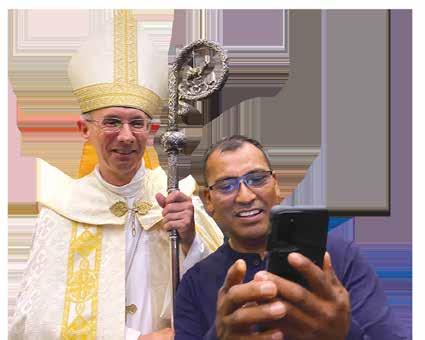


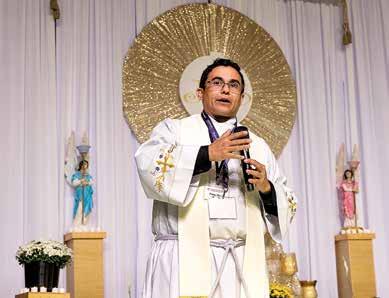
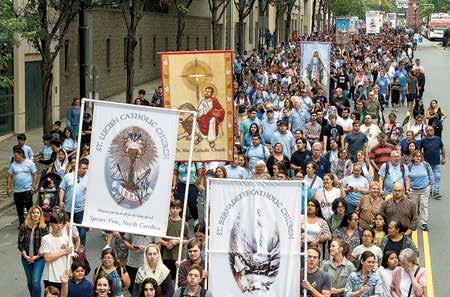
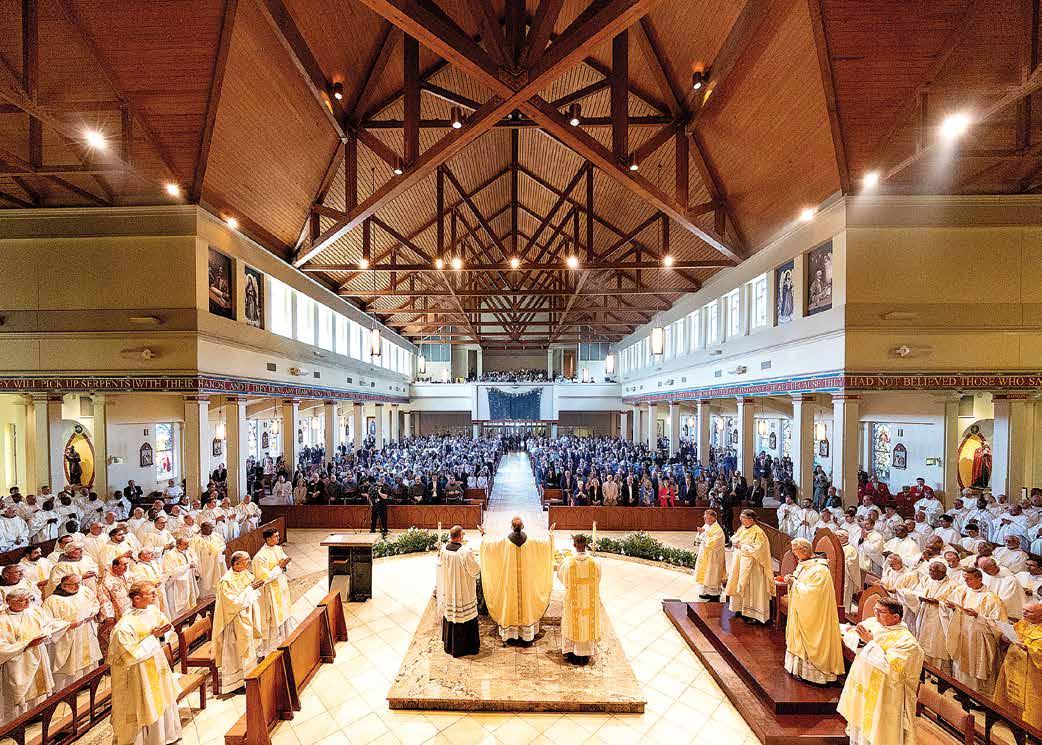
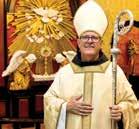
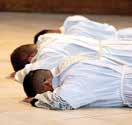


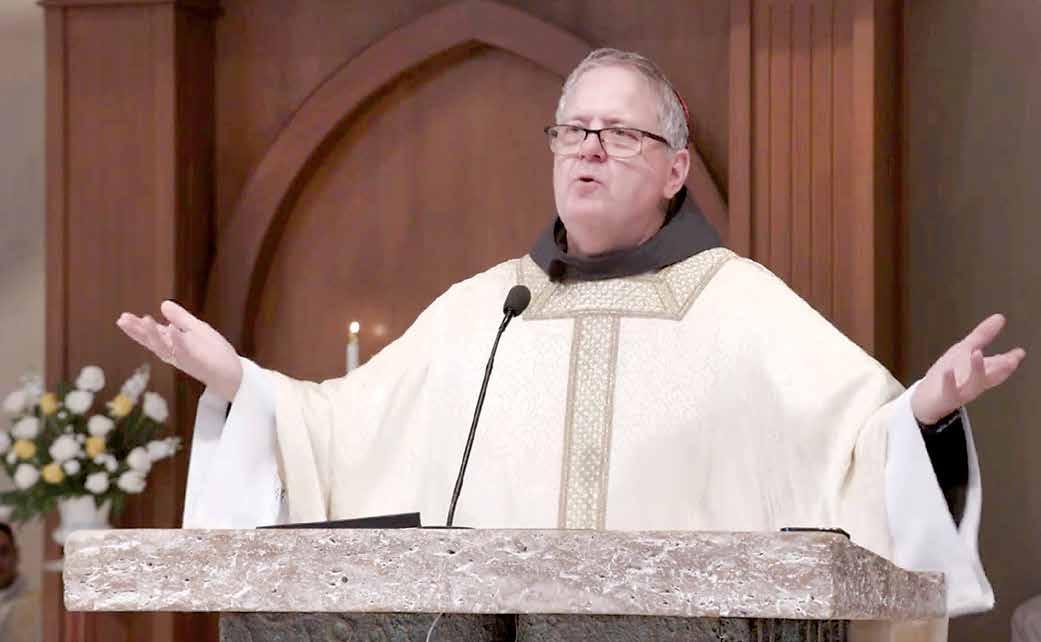
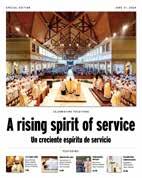
streamed into St. Mark Church in Huntersville May 29 – a poignant visual representation of the Holy Spirit – as the Diocese of Charlotte welcomed a new bishop for the first time in 20 years.
Conventual Franciscan Father Michael T. Martin was ordained during a three-hour liturgy that included hundreds of priests and deacons, more than a dozen bishops and one cardinal representing Pope Francis. Bishop Martin succeeds the retiring Bishop Peter Jugis. Percussion instruments and horns heralded the entrance procession into the Huntersville church and parish hall that were filled with 1,700 ticketed guests, including many of Bishop Martin’s former parishioners from St. Philip Benizi Parish in Jonesboro, Georgia, whom he greeted with smiles.
His family, friends, Franciscan friars, and clergy from the Charlotte diocese and multiple states packed the pews for the historic occasion.
“I am so proud of my brother (in Christ). It is an honor to have a role in his ordination liturgy,” said Bishop Martin’s longtime friend and fellow Conventual Franciscan Father Michael Heine. “The smile on his face and the joy of the day truly shows us the Holy Spirit is moving in exciting ways!”
La“Ahora
luz del sol entró a raudales en la Iglesia San Marcos en Huntersville el 29 de mayo, una conmovedora representación visual del Espíritu Santo, mientras la Diócesis de Charlotte daba la bienvenida a un nuevo obispo por primera vez en 20 años.
El padre franciscano conventual Michael T. Martin fue ordenado durante una liturgia de tres horas que incluyó a cientos de sacerdotes y diáconos, una docena de obispos y un cardenal en representación del Papa Francisco. El Obispo Martin sucede al Obispo Peter Jugis, que se jubila.
Instrumentos de percusión y trompetas anunciaron la procesión de entrada a la iglesia y salón parroquial de Huntersville que se llenó con 1,700 invitados con boleto, incluidos muchos de los antiguos feligreses del Obispo Martin de la Iglesia San Felipe Benizi en Jonesboro, Georgia, a quienes saludó con sonrisas.
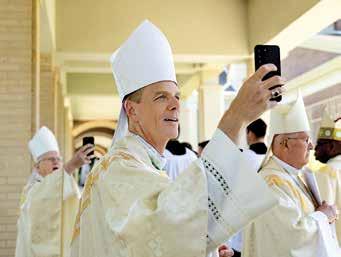
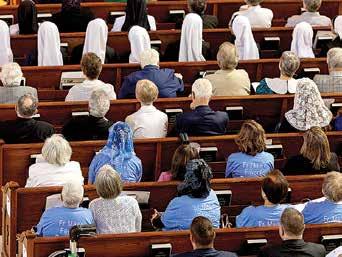
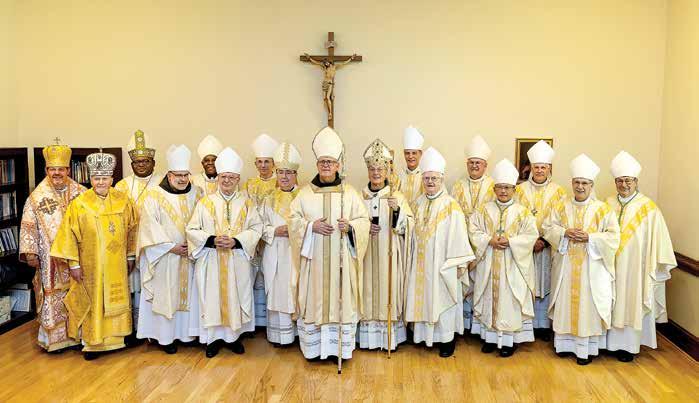
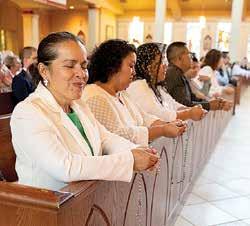
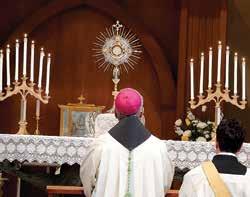
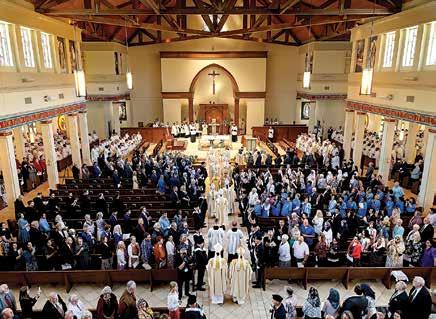
If you or someone you know is contemplating a vocation to the priesthood, diaconate or religious life, check out the following general resources online.
Talk with your pastor, reach out to the diocese’s vocations promoter, read up on consecrated life and the various religious communities that exist, and contact communities that interest you. Many offer “come and see” days or retreats that are good opportunities to learn more and meet others who have already accepted God’s call to religious life. For young men and women, there are also summer discernment retreats offered by the Diocese of Charlotte and hosted at Belmont Abbey College: Quo Vadis Days for young men, and Duc In Altum for young women. Information about the 2025 retreats will be posted next spring online at www.charlottediocese.org/vocations. Overall, remember: Don’t be afraid to reach out and ask questions!
n Father Christopher Gober, vocations director: vocationsmail@rcdoc.org
n Father Brian Becker, vocations promoter: bjbecker@rcdoc.org
n www.foryourvocation.org: Set up by the U.S. Conference of Catholic Bishops, dedicated to the promotion of vocations to the priesthood and consecrated life for both men and women. They are also on Facebook and YouTube. There are resources for parents and teachers, questions to ask yourself if you feel God is calling you, videos of vocation stories from priests and religious all over the U.S., and more.
n www.religiouslife.com: The Institute for Religious Life’s website, with plenty of resources for both men and women interested in a vocation or those who wish to support religious life.
n Not sure what religious communities are out there that might be a good fit for you? Check out www.religiousministries.com. Search this database to find a men’s or women’s religious community, whether you wish to become a priest, nun, brother or lay missioner, or just want to find out more about living a religious life.
n www.cloisteredlife.com: Aims to bring to attention the gift of cloistered and monastic life in the Church, sponsored by the Institute for Religious Life.
n www.cmsm.org: The Conference of Major Superiors of Men serves the leadership of the Catholic orders and congregations of the more than 17,000 vowed religious priests and brothers in the U.S. n www.religiousbrotherhood.com: Sponsored by the Institute for Religious Life specifically to increase awareness of the specific charism of religious brotherhood in the U.S.
n www.cmswr.org: The Council of Major Superiors of Women Religious (CMSWR) is a canonically approved organization, founded in 1992, to promote religious life in the U.S. n www.lcwr.org: The Leadership Conference of Women Religious (LCWR) is an association of the leaders of congregations of Catholic women religious in the U.S.
If you would like to know more about deacons and their ministry or feel you may have a calling, please contact Deacon Bill Schreiber, director of formation, at cwschreiber@rcdoc.org or Deacon David Faunce, assistant director of formation, at dmfaunce@rcdoc. org. Details can be found online at www.charlottediocese.org/vocations/diaconate
Father Christian Cook, pastor of St. Margaret Mary Parish in Swannanoa, was among more than a hundred priests from the Charlotte diocese in attendance. He said it was his first episcopal ordination as a priest or otherwise.
“Taking part as a priest is very special because the episcopal ordination Mass is apostolic succession on full display. When I was ordained a priest, I made a promise of obedience to Bishop Jugis, but also to his successors,” he said. “So the continuity of the Church, the ordination promises of my priesthood, and the passing down of office of bishop is very comforting. The Church of Jesus Christ is as He made it, for where the bishop is, there is the Church.”
Atlanta Archbishop Gregory Hartmayer, also a Conventual Franciscan and a close friend of Bishop Martin, was the principal celebrant and consecrator for the Mass. He offered a moving homily, highlighting the new bishop’s Franciscan roots, his prayerfulness and humility, as well as their long history together – beginning when the archbishop was a teacher and Martin was a student at Archbishop Curley High School in Baltimore. Co-consecrators were Bishop Jugis and Cardinal Christophe Pierre, the pope’s ambassador to the United States.
After the introductory rites, the Liturgy of the Word began with St. Joseph Sister Joan Pearson.
“It is an honor,” Sister Joan said before Mass. “I am a little nervous because this is a really great ecclesial event and I have a tiny little part in it, so I’m humbled and nervous because all of the dignitaries and the people of the diocese are going to see this. But just to be able to proclaim the Word of God is wonderful.”
Then-Deacon Kevin Tran proclaimed the Gospel (Jn 21:15-17), the passage where Jesus asks Peter for a threefold affirmation of his love.
In his homily Archbishop Hartmayer, emphasized the new bishop’s chosen episcopal motto, the words spoken by Jesus to Peter – “Duc In Altum” or “put out into the deep” – referencing the bishop’s call for people to deepen their relationship with Jesus.
“It is the Lord who invites us to put out into the deep as Peter did…” Archbishop Hartmayer said. “Putting out into the deep is an invitation to trust in the Lord at all times. It means relying less on ourselves and more on the One who calls us. The call of Christ, ‘Duc In Altum,’ is a challenge for each of us. With Peter, we can put out into the deep, having caught nothing all day, and see the miracles that the Lord works.”
Archbishop Hartmayer opened his homily by greeting all the bishops and Franciscan friars present as well as the Martin family.
“Episcopal ministry is, first and foremost, a call to a deepened friendship with the Lord Jesus. Cut off from Him, we can do nothing.”
Addressing the incoming bishop, he continued, “You will be even more dependent on the Lord’s loving kindness as you step forward in this service of sacrificial loving for the Church, both local and universal as a contemporary apostle. You stand in a continuous line of succession reaching back to those first apostles who became friends with the Lord Jesus.”
“Do all you can to call the people of the Diocese of Charlotte to an ever more loving and joyful friendship with Our Savior. And by your own example, lead your seminarians, priests, deacons and consecrated religious toward a renewed personal relationship with the Lord.”
As the ordination rite began, the entire congregation chanted the ancient prayer “Veni, Creator Spiritus” (“Come, Creator Spirit”), invoking the Holy Spirit.
Father Heine and Conventual Franciscan Father Jude Michael Krill presented Bishopelect Martin to Archbishop Hartmayer for ordination in the name of the Charlotte diocese. Then Cardinal Pierre read the apostolic letter from Pope Francis, testifying that he should be ordained bishop.
Bishop-elect Martin then processed through the congregation displaying the apostolic letter.
All present assented to his election as bishop, proclaiming: “Thanks be to God.”
Archbishop Hartmayer then asked the bishop-elect nine questions to affirm he is prepared to: 1) discharge this sacred duty until the end of his life, 2) remain “faithful and constant” in proclaiming the Holy Gospel, 3) maintain without change the “deposit of faith” that the Apostles
it will be the same today, that’s the reality of apostolic succession. To be there, to see that is a privilege – it really is.”
Two deacons placed an open Book of the Gospels over the head of the bishop-elect while Archbishop Hartmayer prayed the Prayer of Consecration, together with all the consecrating bishops – illustrating that preaching the Word of God is a bishop’s primary duty.
Then Archbishop Hartmayer anointed the head of the new bishop with sacred chrism, handed him the Book of the Gospels, placed the episcopal ring on his finger and the miter on his head, and gave him the crosier (pastoral staff) – symbols of the office of bishop.
With visible emotion, Bishop Martin then took his seat among the group of bishops. The ordination rite ended with a fraternal kiss of peace from Archbishop Hartmayer and all the bishops who were present, sealing Bishop Martin’s admittance into the College of Bishops.


have passed along down through the ages, 4) “build up the Church as the Body of Christ,” 5) “remain united to it within the Order of Bishops under the authority of the successor of the Apostle Peter,” 6) guide the People of God “as a devoted father,” 7) “be welcoming and merciful to the poor,” 8) “seek out the sheep who stray,” and 9) pray unceasingly for the People of God.
Archbishop Hartmayer then invited everyone to pray for the bishop-elect, who prostrated himself as the congregation chanted the Litany of Supplication (commonly called the Litany of the Saints).
Archbishop Hartmayer, followed by the other bishops, laid hands on the head of Bishop-elect Martin, a gesture that the apostles themselves used to invoke the Holy Spirit as they appointed successors.
Craig and Kathleen Lewis, parishioners of St. Ann Church in Charlotte, said they were honored to attend the ordination, noting that they also attended the ordination of Bishop Jugis and installation of his predecessor, the late Bishop William Curlin.
Kathleen Lewis recalled what she found moving about all three historic occasions.
“It really struck me that hands have been laid from the time that there were hands that touched Our Lord,” she said.
“Those hands touched a man’s head and those hands and so forth, all the way to the hands that were on Bishop Jugis. And
The Mass then continued with the Liturgy of the Eucharist, with Bishop Martin’s mother and three sisters bringing up the offertory. Bev Martin was the first to offer the gifts, beaming as she presented the bread for Communion to her son. His sisters Jeanne, Judy and Ellie followed.
“It’s a little overwhelming, but honestly it’s very deserving and he’s going to be a wonderful, wonderful bishop,” sister Judy Ercole said afterward. “And the people are going to adore him.”
Added sister Jeanne Martin, “They don’t know how lucky they are.”
Communion followed amid beautiful chants and hymns. Before the end of Mass, newly ordained Bishop Martin processed through the aisles of the church and parish hall again to give the congregation his first episcopal blessing. Returning to the altar, he offered concluding remarks in Spanish and English.
Starting with a tribute and applause for Bishop Jugis, Bishop Martin said he looks forward to having him as a brother bishop in the diocese. He also thanked Cardinal Pierre, noting his kindness when he informed Bishop Martin of his new assignment as well as his “beautiful French accent.”
He also thanked Archbishop Hartmayer, who had referenced in his homily how they
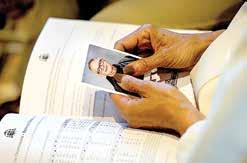
first met each other when the new bishop was an eighth-grader. He thanked him for his faithful example and his friendship of 50 years. He thanked his Franciscan family as well as his mother, sisters and late father. Then he threw open his arms and said, “That’s it. I’m yours now.”
Applause erupted from the congregation as the new bishop continued, “May that be a blessing for you. I know it’s already a blessing for me. And may the Holy Spirit do whatever God wants to do as we continue to build the Kingdom together. God bless you.”
More online
At www.catholicnewsherald.com : See more photos and watch video highlights of Bishop Martin’s ordination Mass
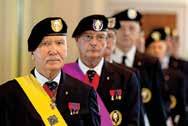
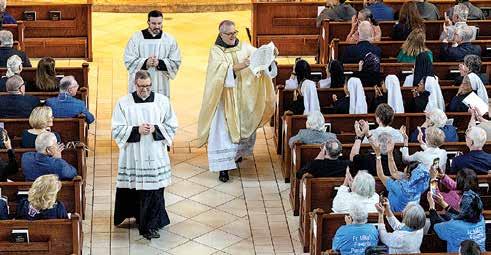
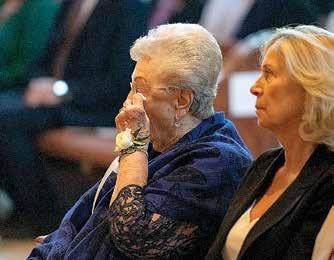
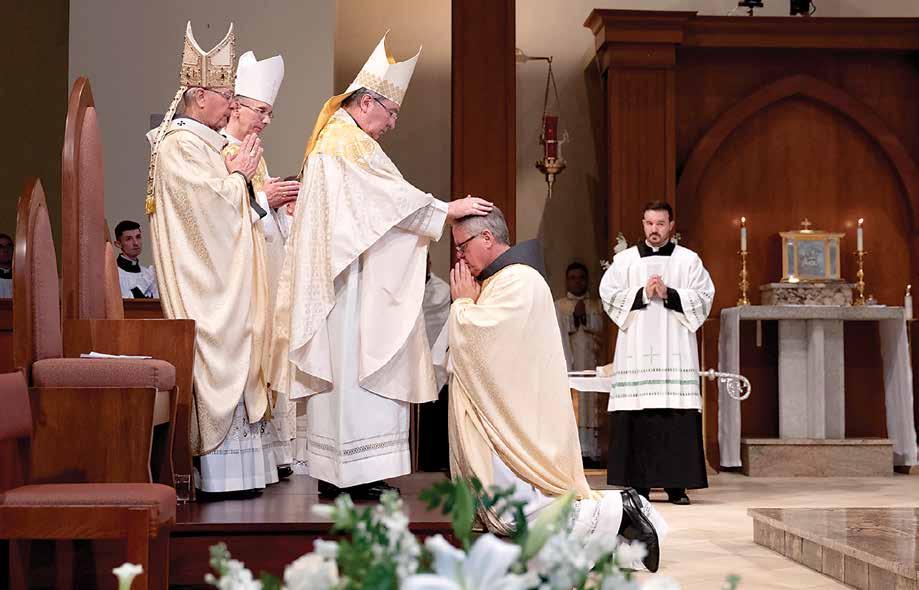

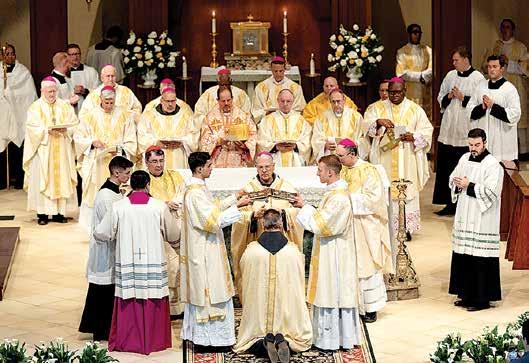
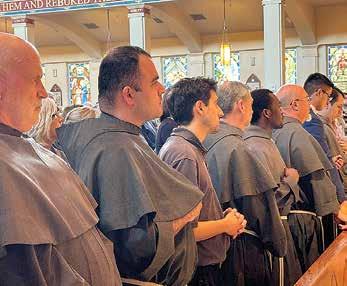
Many Conventual Franciscan friars from throughout Our Lady of the Angels Province, which is based in Ellicott City, Md., attended Bishop Martin’s ordination Mass in support of their brother in Christ. A fellow Conventual Franciscan, Archbishop Gregory Hartmayer, was the principal consecrator and celebrant of the Mass.
(Right and below) During the episcopal ordination rite, Archbishop Hartmayer anoints Bishop Martin’s head with sacred chrism, then hands the Book of the Gospels to him, and places the episcopal ring on his finger and bishop’s miter on his head as symbols and reminders of his teaching and governing authority.

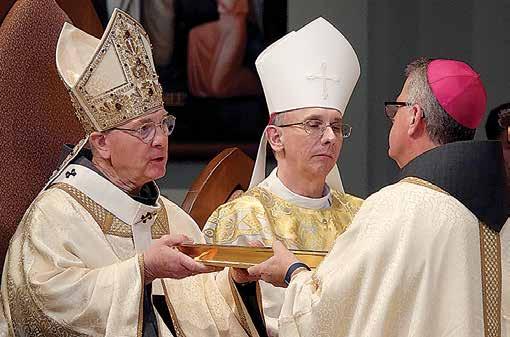
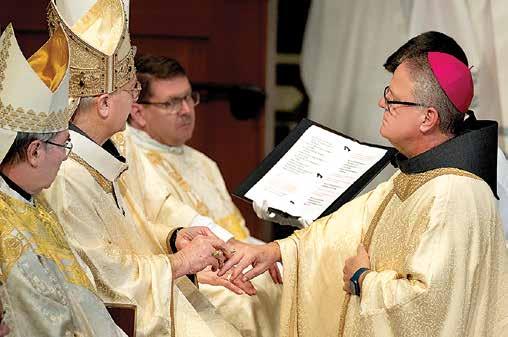
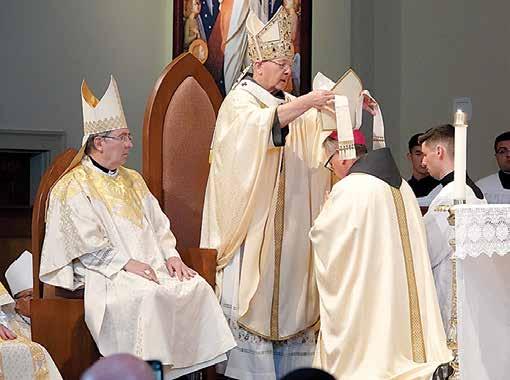
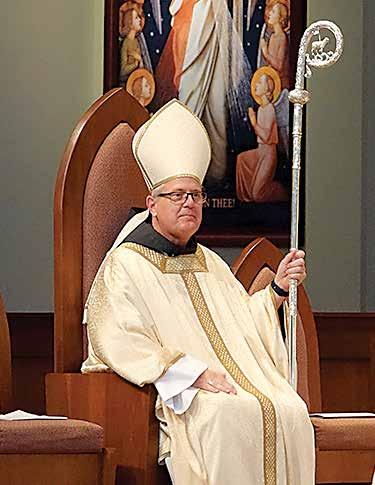
At the end of the ordination rite, Bishop Martin takes his seat in the presider’s chair, wearing the symbols of his episcopal authority – the ring, miter and crosier–signifying his new role as the Bishop of Charlotte and membership in the College of Bishops.
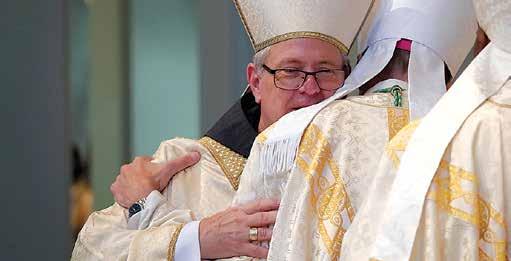
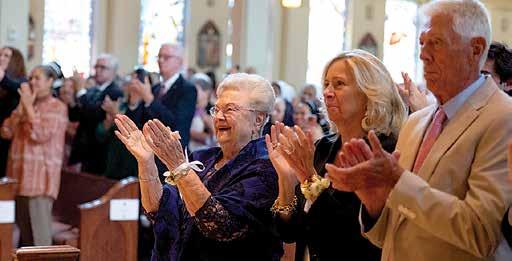
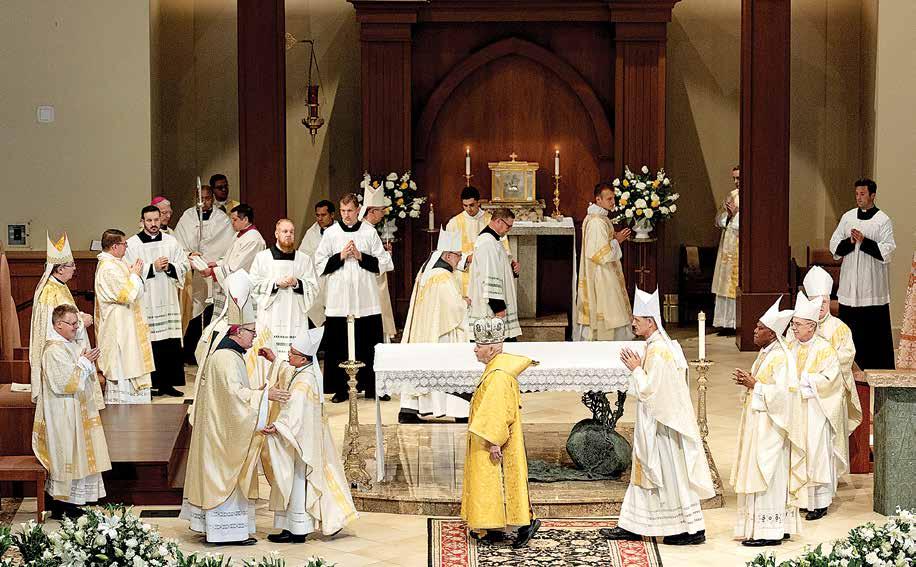
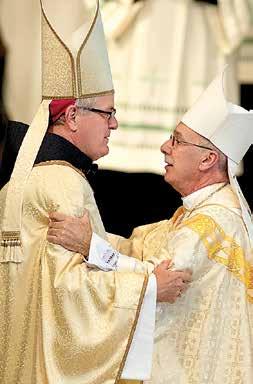
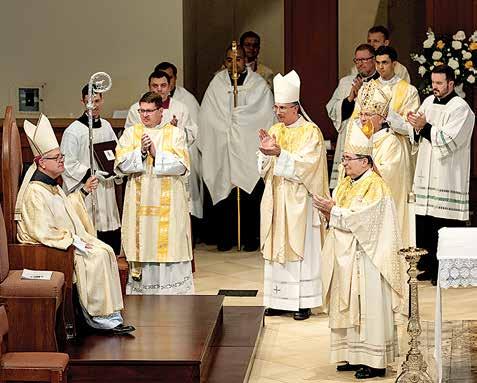
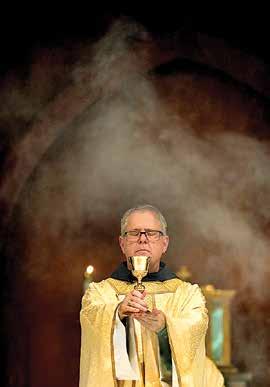
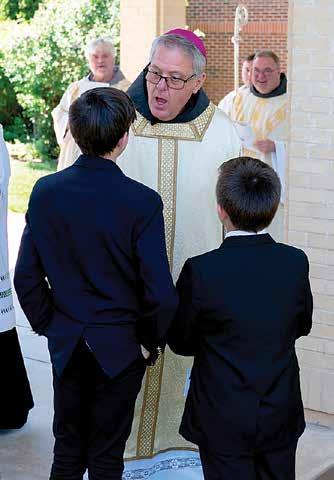
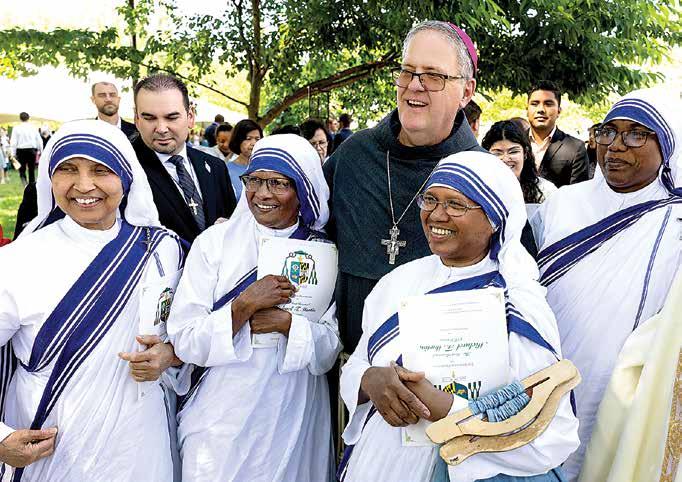

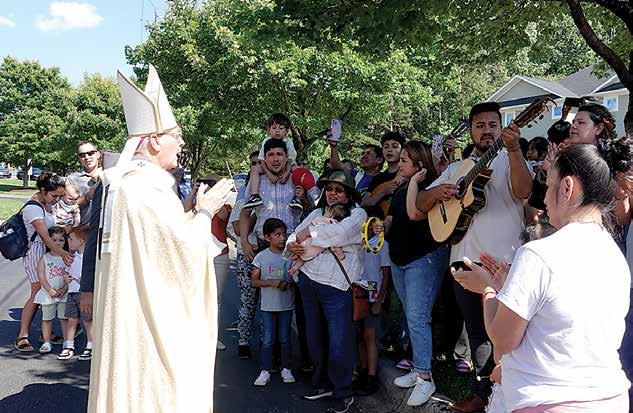
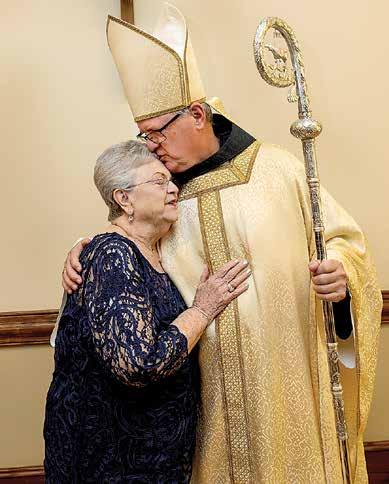
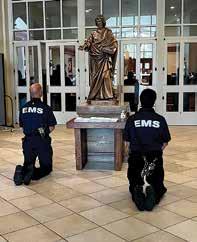
Charlotte y de varios estados llenaron las bancas en esta histórica ocasión.
“Estoy muy orgullosa de mi hermano (en Cristo). Es un honor tener un papel en la liturgia de su ordenación”, dijo el viejo amigo del Obispo Martin y compañero franciscano conventual, el Padre Michael Heine. “¡La sonrisa en su rostro y la alegría del día realmente nos muestran que el Espíritu Santo se está moviendo de manera emocionante!”
El Padre Christian Cook, párroco de la Iglesia Santa Margarita María en Swannanoa, fue uno de los más de cien sacerdotes de la Diócesis de Charlotte que asistieron. Dijo que era su primera ordenación episcopal.
“Participar como sacerdote es muy especial porque es la sucesión apostólica en plena manifestación. Cuando fui ordenado sacerdote, hice una promesa de obediencia al Obispo Jugis, pero también a sus sucesores”, dijo. “Así que la continuidad de la Iglesia, las promesas de ordenación de mi sacerdocio y la transmisión del oficio de obispo son muy reconfortantes. La Iglesia de Jesucristo es como Él la hizo, porque donde está el obispo, allí está la Iglesia”.
El Arzobispo de Atlanta, Gregory Hartmayer, también franciscano conventual y amigo cercano del Obispo Martin, fue el principal celebrante y consagrante de la liturgia. Ofreció una homilía conmovedora, destacando las raíces franciscanas del nuevo obispo, su oración y humildad, así como su larga historia juntos, que comenzó cuando el arzobispo era maestro y Martin era estudiante en la Escuela Secundaria Arzobispo Curley en Baltimore. Los co-consagrantes fueron el Obispo Jugis y el Cardenal Christophe Pierre, embajador del Papa en Estados Unidos.
COMIENZA LA LITURGIA HISTÓRICA
Después de los ritos introductorios, la Liturgia de la Palabra comenzó con la Hermana de San José, Joan Pearson. “Es un honor”, dijo la Hermana Joan antes de la Misa. “Estoy un poco nerviosa porque este es un gran evento eclesial y tengo una pequeña parte en él, así que me siento humilde y nerviosa porque todos los dignatarios y la gente de la diócesis va a ver esto. Pero el solo hecho de poder proclamar la Palabra de Dios es maravilloso”.
El Diácono Kevin Tran proclamó el Evangelio (Juan 21:15-17), el pasaje en el que Jesús pide a Pedro una triple afirmación de su amor.
En su homilía, el Arzobispo Hartmayer enfatizó el lema episcopal elegido por el nuevo obispo, las palabras pronunciadas por Jesús a Pedro: “Duc In Altum” o “remar mar adentro”, haciendo referencia al llamado del obispo a profundizar su relación con Jesús.
“Es el Señor quien nos invita a remar mar adentro como lo hizo Pedro...”, dijo el Arzobispo Hartmayer. “Remar mar adentro es una invitación a confiar en el Señor en todo momento. Significa confiar menos en nosotros mismos y más en Aquel que nos llama. La llamada de Cristo, ‘Duc In Altum’, es un desafío para cada uno de nosotros. Con Pedro, podemos remar mar adentro, sin haber pescado nada en todo el día, y ver los milagros que el Señor hace”.
El Arzobispo Hartmayer comenzó su homilía saludando a todos los obispos y frailes franciscanos presentes, así como a la familia Martin.
“El ministerio episcopal es, ante todo, un llamado a una amistad más profunda con el Señor Jesús. Separados de Él, no podemos
hacer nada”.
Dirigiéndose al obispo electo, continuó: “Dependerás aún más de la bondad amorosa del Señor a medida que des un paso adelante en este servicio de amor sacrificado por la Iglesia, tanto local como universal como apóstol contemporáneo. Te encuentras en una línea continua de sucesión que se remonta a aquellos primeros apóstoles que se hicieron amigos del Señor Jesús”.
“Has todo lo que puedas para llamar a la gente de la Diócesis de Charlotte a una amistad cada vez más amorosa y gozosa con Nuestro Salvador. Y con tu propio ejemplo, conduce a tus seminaristas, sacerdotes, diáconos y religiosos consagrados hacia una renovada relación personal con el Señor”.
RITO DE ORDENACIÓN RICO EN SIMBOLISMO
Al comenzar el rito de ordenación, toda la congregación cantó la antigua oración
6) guiar al Pueblo de Dios “como un padre devoto”, 7) “ser acogedor y misericordioso con los pobres”, 8) “buscar a las ovejas descarriadas” y 9) orar incesantemente por el Pueblo de Dios.
Luego, el Arzobispo Hartmayer invitó a todos a orar por el obispo electo, quien se postró mientras la congregación cantaba la Letanía de Súplica (comúnmente llamada Letanía de los Santos).
El Arzobispo Hartmayer, seguido por los otros obispos, impuso las manos sobre la cabeza del Obispo Electo Martin, un gesto que los propios apóstoles utilizaron para invocar al Espíritu Santo al nombrar sucesores.
Craig y Kathleen Lewis, feligreses de la Iglesia Santa Ana en Charlotte, dijeron que se sentían honrados de asistir a la ordenación, señalando que también asistieron a la ordenación del Obispo Jugis y a la instalación de su predecesor, el difunto Obispo William Curlin.
de todos los obispos presentes, sellando la admisión de Mons. Martin en el Colegio de Obispos.
UNA CONCLUSIÓN CONMOVEDORA
La Misa continuó con la Liturgia de la Eucaristía con la madre de Monseñor Martin y sus tres hermanas portando las ofrendas. Bev Martin fue la primera en ofrecer los dones, radiante mientras presentaba el pan para la comunión a su hijo. Sus hermanas Jeanne, Judy y Ellie la siguieron.
“Es un poco abrumador, pero en verdad es muy merecido y va a ser un obispo maravilloso”, dijo su hermana Judy Ercole después. “Y la gente lo va a adorar”. Su hermana Jeanne Martin agregó: “No saben lo afortunados que son”.
La comunión siguió en medio de hermosos cantos e himnos. Antes del final de la Misa, el recién ordenado Obispo Martin procesionó por los pasillos de la iglesia y
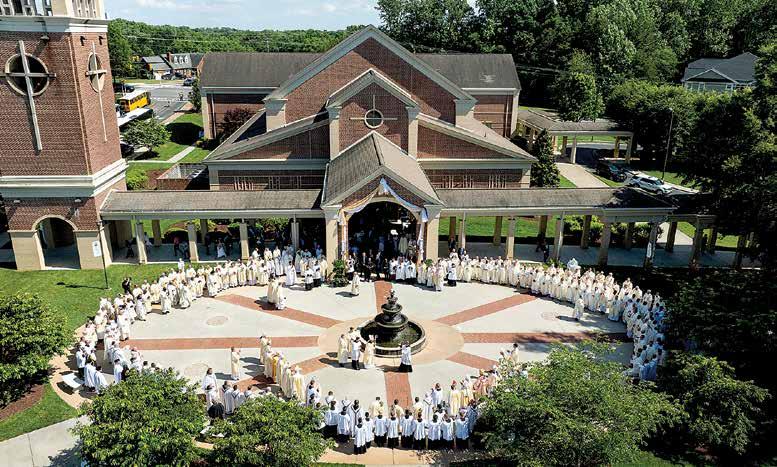
“Veni, Creator Spiritus” (“Ven, Espíritu Creador”), invocando al Espíritu Santo.
El Padre Heine y el Padre Franciscano Conventual Jude Michael Krill presentaron a Martin al Arzobispo Hartmayer para su ordenación en nombre de la Diócesis de Charlotte. A continuación, el Cardenal Pierre leyó la carta apostólica del Papa Francisco, en la que testificaba que Martin debía ser ordenado obispo.
A continuación, Martín procesionó a través de la congregación mostrando la carta apostólica.
Todos los presentes asintieron a su elección como obispo, proclamando: “Gracias a Dios”.
A continuación, el Arzobispo Hartmayer hizo nueve preguntas al obispo electo para afirmar que está preparado para: 1) cumplir con este deber sagrado hasta el final de su vida, 2) permanecer “fiel y constante” en la proclamación del Santo Evangelio, 3) mantener sin cambios el “depósito de fe” que los Apóstoles han transmitido a través de los siglos, 4) “edificar la Iglesia como el Cuerpo de Cristo, 5) “permanecer unidos a ella dentro del Orden de los Obispos bajo la autoridad del sucesor del apóstol Pedro”,
Kathleen Lewis recordó lo que le conmovió en las tres ocasiones históricas.
“Realmente me llamó la atención que se hayan impuesto manos desde el momento en que hubo manos que tocaron a Nuestro Señor”, dijo. “Esas manos tocaron la cabeza de un hombre y esas manos a otras, hasta llegar a las manos que estaban sobre el Obispo Jugis. Y será lo mismo hoy, esa es la realidad de la sucesión apostólica. Estar allí, eso es un privilegio, realmente lo es”.
Dos diáconos colocaron un Libro abierto de los Evangelios sobre la cabeza del obispo electo mientras el Arzobispo Hartmayer rezaba la Oración de Consagración, junto con todos los obispos consagrantes, ilustrando que predicar la Palabra de Dios es el deber principal de un obispo.
A continuación, el Arzobispo Hartmayer ungió la cabeza del nuevo obispo con el sagrado crisma, le entregó el Libro de los Evangelios, le colocó el anillo episcopal en el dedo, la mitra en la cabeza, y le entregó el báculo pastoral, símbolos del oficio de obispo.
Con visible emoción, Monseñor Martin tomó asiento entre el grupo de obispos. El rito de ordenación terminó con un beso fraterno de paz del Arzobispo Hartmayer y
el salón parroquial nuevamente para dar a la congregación su primera bendición episcopal. Al regresar al altar, pronunció las palabras finales en español e inglés.
Comenzando con un tributo y un aplauso para el Obispo Jugis, el Obispo Martin dijo que espera tenerlo como hermano obispo en la diócesis. También agradeció al cardenal Pierre, destacando su amabilidad cuando informó al obispo Martin de su nueva asignación, así como su “hermoso acento francés”.
También agradeció al Arzobispo Hartmayer, quien había hecho referencia en su homilía a cómo se conocieron cuando el nuevo obispo estaba en octavo grado. Le agradeció su fiel ejemplo y amistad de 50 años. Agradeció a su familia franciscana, así como a su madre, hermanas y difunto padre. Luego abrió los brazos y dijo: “Eso es. Soy suyo ahora. Que Dios los bendiga a todos”.
Más online
En www.catholicnewsherald.com : Vea más fotografías y videos destacados de la Misa de ordenación del Obispo Martin, incluidos sus primeros comentarios oficiales en español.
CHARLOTTE — On the day he was formally installed as the spiritual shepherd of the Diocese of Charlotte, Bishop Michael Martin called on Catholics across western North Carolina to commit individually and to work together as one to build God’s kingdom. The special installation Mass took place on May 30, the day after Bishop Martin was ordained a bishop at St. Mark Church in Huntersville. He formally assumed leadership of the diocese at St. Patrick Cathedral in Charlotte and celebrated his first Mass as bishop for a congregation that included two bishops and nearly 100 priests from around the diocese who will work with him to spread the Gospel message. Deacons, women religious, and the laity joined Bishop Martin’s family for the moving ceremony and liturgy. In his homily, Bishop Martin said the
beginning of his leadership is an important time to ask Catholics, “Who do you say that the Church is here in Charlotte? That answer has to be united.”
Shortly before 10 a.m. under a sunny blue sky, Bishop Martin climbed the cathedral’s steps to be received at the front door by Atlanta Archbishop Gregory Hartmayer and Father Christopher Roux, the cathedral’s rector. Bishop Martin kissed a crucifix and blessed the priests gathered outside with holy water, then blessed the congregation inside who’d come to experience the historic moment.
Then, Bishop Martin joined a long procession of priests and other church leaders who passed under an elaborate arch of blue, white and yellow flowers framing the cathedral’s double doors. Walking down the center aisle, he smiled and greeted people in the pews on his way to begin his first Mass as bishop. Once on the altar, he
Watch online
On the Diocese of Charlotte’s YouTube channel Watch Bishop Martin’s entire homily
formally sat in the marble bishop’s chair, also called the “cathedra,” a tangible symbol of his leadership of the diocese.
Bishop Martin delivered an animated first homily, reflecting on the day’s Gospel reading from Matthew in which Jesus asks His disciples, “Who do you say that I am?”
The question had relevance for him, Bishop Martin said, because in recent weeks friends and family asked him what they should call him once he was ordained. He related Christ’s question to what he also asks of everyone.
“It’s important to Him to know we are responding not just as the voice of the crowd but as a person, a child of God, and in particular a believer in relationship with Christ,” he said.
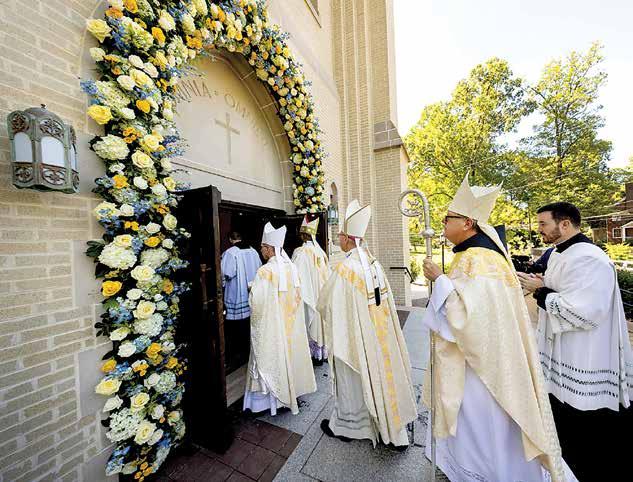
“We need to proclaim, we need to sing, we need to profess with one voice,” he said. “The world is full of many voices, many opinions. The world is full of influencers and people who are driving the message, and if all we do is fall prey to that dynamic…we will falter.
“That’s not the Church you and I have come to love and know. That’s not the Church that was founded on Peter, the Rock. So let us not see ourselves in this camp or another camp, but rather let us continuously ask ourselves: ‘Can we find and celebrate that one foundation in Christ?’ That is the key to building the kingdom.”
Bishop Martin said he was honored and eager to walk with his brother priests in leading the Catholic community in western North Carolina.
“I get a chill just thinking about what the Holy Spirit can do in us as we proclaim to our world who Jesus is.”
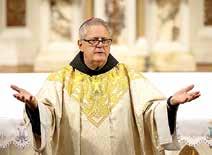
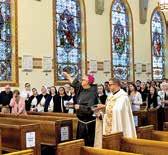

CHRISTINA LEE KNAUSS clknauss@rcdoc.org
CHARLOTTE — El día en que fue instalado formalmente como pastor espiritual de la Diócesis de Charlotte, el Obispo Michael T. Martin hizo un llamado a los católicos del oeste de Carolina del Norte a que se unan para construir el reino de Dios. La Misa especial de instalación tuvo lugar el miércoles 30 de mayo, un día después de la ordenación episcopal del Obispo Martin en la Iglesia San Marcos en Huntersville. Tomó posesión formalmente de la Diócesis de Charlotte en la Catedral San Patricio y celebró su primera Misa como obispo para una congregación que incluía a unos 100 sacerdotes de toda la diócesis que trabajarán con él para difundir el mensaje del Evangelio. Diáconos, religiosas y laicos se unieron a la familia del Obispo Martin para la emotiva ceremonia y liturgia.
Poco antes de las 10 de la mañana, bajo un cielo azul claro y con un sol radiante, el Obispo Martin subió los escalones de la catedral para ser recibido formalmente en la puerta principal por el Arzobispo de Atlanta, Gregory J. Hartmayer, y el Padre Christopher Roux, rector de la catedral. Monseñor Martin besó un crucifijo y bendijo con agua bendita a los sacerdotes reunidos en el exterior, así como a la congregación en el interior. Poco después, el Obispo Martin se unió a una larga procesión que pasó bajo un elaborado y hermoso arco de flores azules, blancas y amarillas que enmarcaba las puertas de la catedral. Al dirigirse al altar, sonrió y saludó a la congregación. Una vez en el altar, se sentó formalmente en la silla del obispo, un sello tangible de su nuevo liderazgo en la diócesis.
Durante su homilía, el Obispo Martin reflexionó sobre la lectura del Evangelio de Mateo para el día, en la que Jesús pregunta a los discípulos: “¿Quién dicen que soy yo?”
Ver online
En nuestro canal de YouTube : Vea la homilía completa del obispo Martin
La pregunta tenía relevancia para él en su nuevo papel de obispo, dijo, porque en las últimas semanas sus familiares y otras personas le preguntaron cómo deberían llamarlo una vez que fuera ordenado. Relacionó la pregunta de Cristo con la profunda relación personal que todos los fieles deben tratar de construir con Él. “Es importante para Él saber que estamos respondiendo no solo como la voz de la multitud, sino como una persona, un hijo de Dios y, en particular, un creyente en relación con Cristo”, dijo el obispo.
El Obispo Martin señaló que el comienzo de su liderazgo en la Diócesis es un momento importante para preguntar a los católicos: “¿Quién dicen que es la Iglesia aquí en Charlotte?” La respuesta, dijo, debe
reflejar unidad.
Michael Martin was welcomed to St. Patrick Cathedral on May 30, the day after his ordination. During the Mass of Reception, he greeted its rector, Father Christopher Roux, reverenced a crucifix, blessed the parishioners with holy water, and then gave his first homily as Bishop of Charlotte.
“Esa respuesta tiene que ser unida”, dijo. “Necesitamos proclamar, necesitamos cantar, necesitamos profesar con una sola voz. El mundo está lleno de muchas voces, de muchas opiniones.
El mundo está lleno de influencers y personas que están manejando el mensaje, y si lo único que hacemos es caer presa de esa misma dinámica... flaquearemos. Esa no es la Iglesia que tú y yo hemos llegado a amar y conocer. Esa no es la Iglesia que fue fundada sobre Pedro, la Roca. Así que no nos veamos a nosotros mismos en este campo o en otro, sino que preguntémonos continuamente: “¿Podemos encontrar y celebrar ese único fundamento en Cristo?” Esa es la clave para construir el reino”. El Obispo Martin dijo que se sentía honrado y ansioso por caminar con sus “hermanos sacerdotes” para liderar la comunidad católica del oeste de Carolina del Norte.
In the academic year just ended, we have been blessed to have 46 seminarians in both major seminaries and at St. Joseph College Seminary – who are discerning God’s call to serve you as priests in the Diocese of Charlotte. Your prayers and financial assistance pay for a portion of tuition, room & board that will help assure the diocese of having priests to shepherd the Catholic population in western North Carolina for years to come.
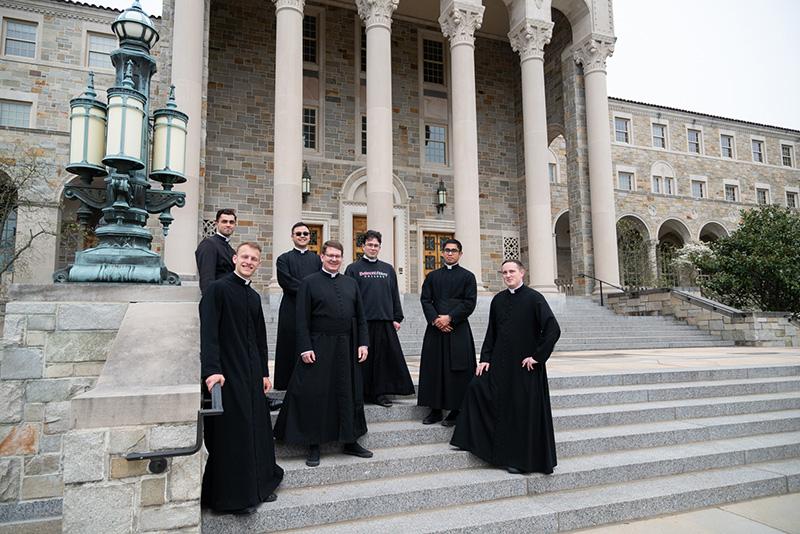
for the Diocese of Charlotte on June 15, 2024
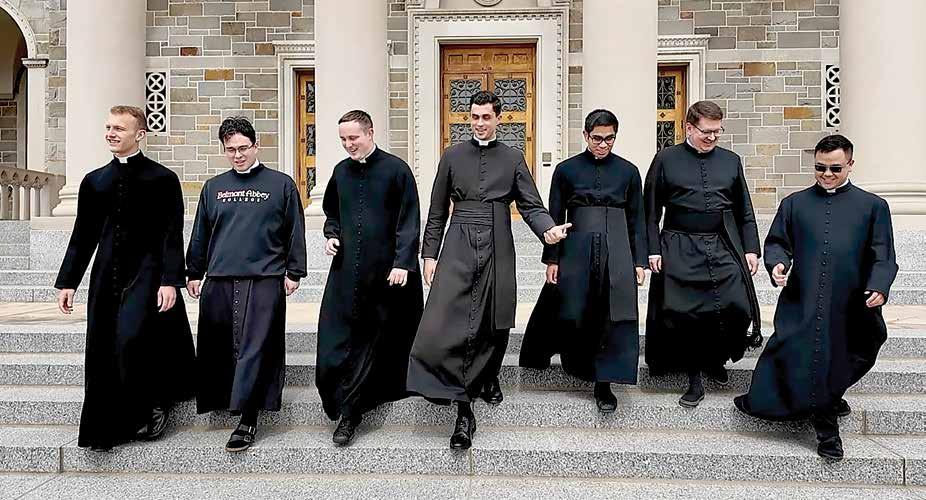
KIMBERLY BENDER kdbender@rcdoc.org
Theseven men ordained priests June 15 comprised one of the largest groups to take this step together for the Diocese of Charlotte – and it’s evidence of the continuing success of the diocese’s continued emphasis on vocations.
This diverse class brings men from parishes across the diocese. Newly ordained are:
n Matthew Dimock Jr. of St. Thomas Aquinas Parish in Charlotte
n Christian Goduti of St. Mark Parish in Huntersville
n Matthew Harrison II of Sacred Heart Parish in Salisbury
n Kevin Martinez and José Palma Torres, both of St. Joseph Parish in Asheboro
n Elliott Suttle of St. Mary Help of Christians Parish in Shelby, and
n Kevin Tran of St. John Neumann Parish in Charlotte.
The seven men all recently received their Master of Divinity from Mount St. Mary’s Seminary and School of Theology in Cincinnati, Ohio, the final academic step of their formation.
Father Dimock says he’s been looking forward to serving as a priest.
“It’s everything that I’ve wanted, especially over these past eight years,” he said. “I’m looking forward to serving the People of God. I’m looking forward to hearing their confessions. I’m looking forward to celebrating Mass for them and just passing on the tradition to the faithful.”
Besides attending the seminary together, the men share similar passions for music, sports, reading and a love of the Catholic faith.
Five of the seven were among the first classes at St. Joseph College Seminary for undergraduates discerning a possible religious vocation before taking the step of enrolling in St. Mary’s major seminary for more formal priestly training. Established in 2016, the college seminary is fostering growth of vocations in the diocese. Students
work toward a bachelor’s degree at Belmont Abbey College while experiencing a Benedictine-style communal life on their path of discernment – now in a beautiful new building that opened in 2020, close to home.
Father Martinez applied for the college seminary his senior year of high school, unsure if they’d accept him so young or what it might mean to be part of the new seminary.
“I grew up a cradle Catholic, and I received all of my sacraments of initiation from the same parish. I did not have a deep interest for religious things throughout my middle school and early high school years,” he said. “But there was something that clicked inside of me, this movement of God’s grace. I’d say that’s where I felt like I was lacking something in my life, and I wanted to get to know the Lord more. I started seeking after that peace that only He could give.”
“Growing up, faith was such a significant part of our education and our formation in the home. It was not foreign to see one of the kids praying on their own, and I didn’t feel like I stood out if I wanted to go to Mass or confession,” he said.
Partnering in Father Harrison’s journey to the priesthood has been his brother John, who just graduated from St. Joseph College Seminary.
“It’s possibly one of the greatest blessings that someone in seminary can ask for: to have another brother there. A lot of times I look to St. Peter and St. Andrew and how two brothers together following our Lord were such a powerful team from the foundation of the Church,” Father Harrison said.
Father Goduti said he also looks forward to hearing confessions and celebrating Mass. To prepare for the priesthood, seminarians perform practice baptisms. He said the test runs don’t compare to the feeling of the first time he baptized a child – for real.
“It was just so surreal, especially right before I poured water and said the words over the girl,” he said. “That you were actually bringing the life of God into this soul, and it wasn’t practice. It was the real deal, and that was amazing.”
Father Palma Torres, who was born in Mexico and grew up in the diocese, says he has understanding and comfort in relating to both cultures.
“I’ll bring to the people of the diocese, the capacity to speak both languages, Spanish and English,” he said. “I’m ready to serve them, without having a language barrier or
having a culture barrier.”
Father Tran said he is looking forward the most to being able to consecrate the Eucharist wherever he goes. After ordination, he and Father Suttle are traveling to Japan. Father Tran is excited to visit the sites where the Japanese Martyrs witnessed to the faith and “be able to join myself in their own sacrifice and the sacrifice of the Mass,” he said.
Father Suttle, who taught English in Japan for four years, is looking forward to returning to his Japanese parish and celebrating Mass.
He grew up as a Methodist and converted to Catholicism as an adult. He explored the monastery at Belmont Abbey as well as careers in IT and auto racing before a conversation with Father Peter Shaw, pastor of St. Joseph Parish in Bryson City, opened his eyes to his vocation.
Leaving Japan, he prayed about his next steps and said he discussed what he was feeling with Father Shaw, who urged him to go to seminary.
“‘That’s great, Father, but I can’t do that,’” he recalls saying. “‘I’ve got plans’ – which is the last thing you want to tell God. As soon as I gave that idea any kind of room to grow in my mind, I could see myself in Him in the confessional. And I knew at that moment that this is exactly where God was pointing me to go.”
And that’s what Father Suttle is most looking forward to: hearing confessions, which can bring absolution and reunion with God.
After their ordination, all seven will serve as priests in the diocese.
“We have such a beautiful, growing diocese right now,” Father Dimock said. “I think that God has really worked His providential hand throughout the history of our diocese, but it’s all sort of culminated to now at this moment where, we need to open new parishes, we need to build a new cathedral.
“There’s just so many beautiful things happening in our diocese, and I’m grateful that God has called me to partake in the ministry here.”
More online
At www.catholicnewsherald.com : Watch video interviews with each of the diocese’s newest priests

Home parish: St. Thomas Aquinas
Church, Charlotte
Birthplace: Little Rock, Ark.
Raised in: Indian Trail Age: 26
College: St. Joseph College Seminary
Favorite music: (Aside from anything sung in Church) “I listen to a lot of indie rock right now. I also listen to a lot of bluegrass, some country music. I grew up listening to a lot of country music, but I’ve sort of moved more toward the indie rock side of things.”
CNH: What has been your biggest challenge or struggle in living the faith?
Dimock: “The noisiness of the world is difficult to escape. My generation is often accused of having a short attention span, and those critics are correct! It’s a true reorientation to escape that noisiness, and cling to Christ Jesus in the silence of His Eucharistic Presence every day.”
CNH: How can priests today foster greater unity in the Church?
Dimock: “I hope that as a minister of the Word and preacher of the Gospel, I can take those truths that I have learned in seminary and give them to the People of God in a manner that they can comprehend. And that giving on of the Tradition, spoken of by St. Paul in 1 Corinthians 11:23, should be our model, and always accompanied by prayer.”
CNH: After you get ordained, what is the first thing you’re looking forward to doing?
Dimock: “I look forward to going on a multi-day hike without having to find Mass. After I get ordained, Mass goes along with me. I love hiking Grandfather Mountain in Linville and I’ve found some really beautiful hikes out in Brevard and up in Highlands and Sapphire.”

Home parish: St. Mark Church, Huntersville
Birthplace: Charlotte Raised in: Huntersville Age: 25
College: St. Joseph College Seminary
Fun facts: Loves to cook, landscape and listen to audio books. Has listened to audio versions of the Bible. “The person who’s playing Jesus’ voice can throw it off, though. Not that you would have known what Jesus’ voice sounds like, but if it’s not necessarily the best voice for Him, it’s hard to just sit there. Maybe it’s better to just read the Gospels.”
CNH: What does faith mean to you personally?
Goduti: “Faith, believing in Jesus and His saving work, is necessary for our salvation. Faith is the gifted virtue by which we hold fast to Jesus Christ and all He has revealed. Personally, I am ever grateful to God for the gift of faith, and I ask the Blessed Mother for her intercession so that I may grow in this faith every day.”
CNH: What do you love most about the Catholic faith?
Goduti: “The Catholic faith has handed on through Scripture and tradition the treasured truth of the Eucharist. Our Lord Himself is present to us. It also hands on the beauty of the priesthood and the sacraments, of which the priest is a minister. I am ever grateful for the deposit of truth present in the Catholic Church.”
CNH: After you get ordained, what is the first thing you’re looking forward to doing?
Goduti: “I know that after my first Mass and then the reception at the parish, we’re going to have a family dinner, and I’m looking forward to that. I’m also making a pilgrimage to Fatima with my parents.”

Home parish: Sacred Heart Church, Salisbury Birthplace: Richmond, Va.
Raised in: North Carolina Age: 26
College: St. Joseph College Seminary
Fun fact: Plays at least six instruments: guitar, mandolin, cello, piano, bagpipes and banjo, many self-taught. Family dinners often end with bluegrass jam sessions late into the night.
CNH: How did your family play a role in your discernment to the priesthood?
Harrison: “I am blessed to have an amazing family, and my process of discernment has heavily relied on their constant support, prayers and advice. My parents always encouraged me to serve at Mass growing up, always nurtured my desires and interest in the faith, and served as excellent models of the Christian life with their firm and constant love and joy.”
CNH: What do you love most about the Catholic faith?
Harrison: “I love the communal nature of the sacraments. Coming together for Mass and singing to God, but then spending time afterward either with coffee and donuts or just chatting outside, is such an amazing privilege to be a part of. Our faith is built around the Body of Christ, and being a small part of that body is both fun and edifying.”
CNH: What do you see as the biggest challenge for the Church and the Diocese of Charlotte?
Harrison: “It seems to me the biggest challenge for the Church is the constant pursuit of Christ and holiness in a world that directly opposes that pursuit. Knowing what the Truth is, is one thing, but knowing who the Truth is, is much more important. It is crucial that we know Christ personally, and the best way this can happen is through silent prayer with Him.”

Home parish: St. Joseph Church, Asheboro
Birthplace: Asheboro
Raised in: Franklinville Age: 26
College: St. Joseph College Seminary
Favorite food: Mom’s tacos, but loves everything mom makes.
CNH: Tell us about your family, where you grew up and how your family practiced the Catholic faith.
Martinez: “I am a firstgeneration American. My parents are from the same hometown in Mexico – specifically, El Rosario, Nayarit, Mexico. I was born in Asheboro but was raised on a farm in Franklinville. Until I entered seminary, I lived on the farm my whole life. From very early on, my parents taught me the importance of the Catholic faith. Other things could be joked about, but Holy Mother Church was not to be joked about. The gravity and passion for the Church is something that was taught in my family.
CNH: What do you love most about the Catholic faith?
Martinez: “I love the way we worship in the Catholic Church. It is Theocentric (God-centered). In other denominations, folks sit around and listen to a preacher deliver a sermon for an extended time. In the Catholic Church, the efficaciousness of the worship is not dependent upon how well the priest delivers his homily. Our worship is centered around the Eucharist, the source and summit of our faith. The Mass is centered around the representation of Christ’s sacrifice for us. The Mass is the perfect act of worship, which is rendered to God the Father by Jesus Christ in the Holy Spirit. It is the unbloody sacrifice of Calvary, which takes place on the altar. This is what I love about the Catholic faith.”

Home parish: St. Joseph Church, Asheboro
Birthplace: Veracruz, Mexico
Raised in: Randleman
Age: 30
College: St. Joseph College Seminary
Fun fact: Loves sports, dreamed of becoming a professional soccer player.
CNH: How did you live your faith in your young adult years, prior to discerning the seminary?
Palma Torres: “When I began taking my faith seriously, I started to pray by setting time in the mornings to read scripture. I had a job that was near my home parish, so I would often step into the church and pray before the tabernacle. Sometimes, I would stay there for up to an hour and sometimes it was just for a few minutes, but this practice was crucial in my discernment.”
CNH: What is one thing people would be surprised to know about you?
Palma Torres: “I have been blessed to learn different languages, so I can speak English, Spanish and Latin. I have also studied a little bit of Greek and some French.”
CNH: What do you love most about the Catholic faith?
Palma Torres: “I love that the Catholic faith brings fulfillment to the ends for which man was created. In the faith, one worships God through the liturgy, which involves body and soul. One is able to know who God is through prayer, and one is also able to study theology and know about God. Faith and reason come together in a beautiful way so that everyone is able to know and love God.”

Home parish: St. Mary
Help of Christians, Shelby
Birthplace: Lumberton
Raised in: Cherryville and Shelby
Age: 50
College: University of Alabama
Fun fact: Father Suttle collects hobbies: beermaking; car racing (watching and driving) ; hockey; fencing; hiking; backpacking; camping; archery; skateboarding; reading; writing short stories; board games.
CNH: What does faith mean to you personally?
Suttle: “I had to drive an hour each way to Mass every weekend when I lived in Japan. Even finding a parish in the first place was difficult because most don’t have websites. I also had to teach myself how to go to confession in Japanese due to the lack of Englishspeaking priests.”
CNH: How can priests today foster greater unity in the Church?
Suttle: “We need to demonstrate that the faith is bigger than any one of us. We all gravitate toward a spirituality or facet of the faith that speaks most to us. Just because my spirituality isn’t the same as yours doesn’t make us enemies, but rather just people who have different ways of relating to the same faith. Think of it this way: Franciscans, Dominicans and Benedictines all have very different ways of living out the Catholic faith. That doesn’t make one right and the others wrong. It just shows the breadth of the Catholic faith. That isn’t to say that anything you do is fine, however. You still have to ‘color within the lines,’ as it were. Having said all this, I will attempt to show people that, so long as you believe what the Church teaches to be true, we’re all working toward the same goal. We just go about it in different ways.”

Home parish: St. John Neumann, Charlotte Birthplace and raised in: Charlotte Age: 28
College: University of North Carolina-Charlotte
Favorite instrument: The trumpet. “I grew up playing the trumpet, and it’s the most quoted instrument in the Bible.”
CNH: How did you arrive at your vocation?
Tran: “The first knock I ever received in discerning the priesthood was at a retreat at my home parish, St. John Neumann. One of the retreat leaders was a college student who was applying for seminary that year. There was a spark in his eye, and I didn’t know what it was at the time. When I saw it, I said ‘I don’t know what it is, but whatever it is, I want that.’
CNH: What do you see as the biggest challenge for the Church and for the Diocese of Charlotte?
Tran: “Thanks be to God that we in Charlotte have the problem of needing to expand and build. As immigrants continue to move to Charlotte, particularly Catholics from the northern states and Latin America, we should not assume they will be bringing a Catholic culture with them. Rather, the challenge in front of us will be the same as it has always been: evangelizing and re-evangelizing not just in deed but in word also.”
CNH: What do you love most about the Catholic faith?
Tran: “I love all the tangible signs we have of Christ’s promise that He would be with us to the end of the age, from the Paschal candle to the priesthood, to the Church herself and ultimately to the Blessed Sacrament itself.”
Bishop Michael Martin recites the Prayer of Consecration during the ordination of seven men as priests for the Diocese of Charlotte. The June 15 ordination Mass drew an overflow crowd of nearly 2,000 people who came to witness one of the largest classes of ordinands in diocesan history.
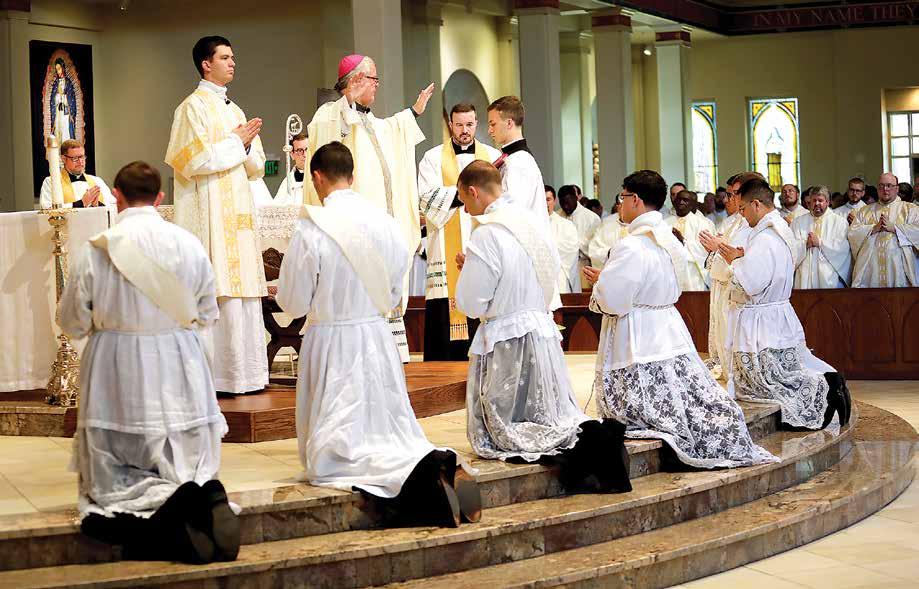
‘Bring
“Lleven a Cristo al mundo”
Sevenmen heard the call to bring Christ to the world and to always “err on the side of mercy” as they were ordained priests for the Diocese of Charlotte by its new bishop on June 15.
The new priests are Father Matthew Dimock, Father Christian Goduti, Father Matthew Harrison, Father Kevin Martinez, Father José Palma Torres, Father Elliott Suttle and Father Kevin Tran.
It was one of the largest-ever classes to be ordained at one time – evidence of the diocese’s strong commitment to vocations – and it was Bishop Michael Martin’s firstever priest ordination.
About 2,000 people – including family and friends of the new priests – turned out for the ordination Mass, filling the pews at St. Mark Church in Huntersville and overflowing to the parish hall.
At the start of the ordination rite, the seven men stood in front of Bishop Martin and declared their willingness to be ordained and take on the duties of the priesthood. This was followed by Bishop Martin’s stirring homily. Infused with humor, it focused on the multiple roles the seven would fill through their priesthood and how hungry the world is for their ministry.
“Your role is to take the good news to the world, not just to wait for the world to come to you,” Bishop Martin said. “We know that the heart of the good news is the
Sietehombres recibieron el llamado de llevar a Cristo al mundo y a “equivocarse siempre por el lado de la misericordia” al ser ordenados sacerdotes para la Diócesis de Charlotte por el Obispo Michael Martin el 15 de junio.
Los nuevos sacerdotes son los Padres Matthew Dimock, Christian Goduti, Matthew Harrison, Kevin Martínez, José Palma Torres, Elliott Suttle y Kevin Tran.
Es la primera vez desde el año 2000 que siete sacerdotes diocesanos son ordenados al mismo tiempo, lo que evidencia el fuerte compromiso de la diócesis con las vocaciones. Además, fue la primera ordenación sacerdotal del Obispo Martin desde que se convirtió en Obispo de Charlotte hace solo dos semanas.
Alrededor de dos mil personas asistieron a la ceremonia de ordenación, llenando las bancas de la Iglesia San Marcos en Huntersville y desbordando el salón parroquial. Familiares y amigos de los sacerdotes llenaron las primeras filas de la iglesia.
Al inicio del rito de ordenación, los siete hombres se presentaron frente al Obispo Martin y declararon su voluntad de ser ordenados asumiendo los deberes del sacerdocio.
Luego siguió la conmovedora homilía del Obispo Martin. Impregnada de humor, se centró en los múltiples roles que los siete cumplirán a lo largo de su sacerdocio, y en lo hambriento que está el mundo de su ministerio.
“Su papel es llevar las buenas nuevas al mundo, no solo esperar a que el mundo
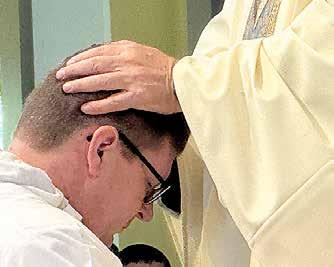
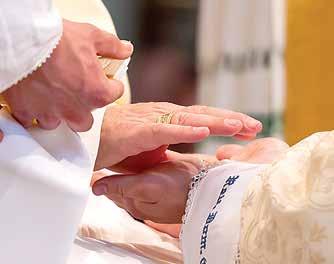
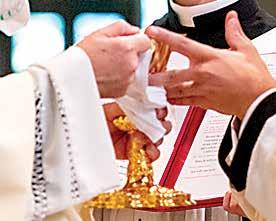
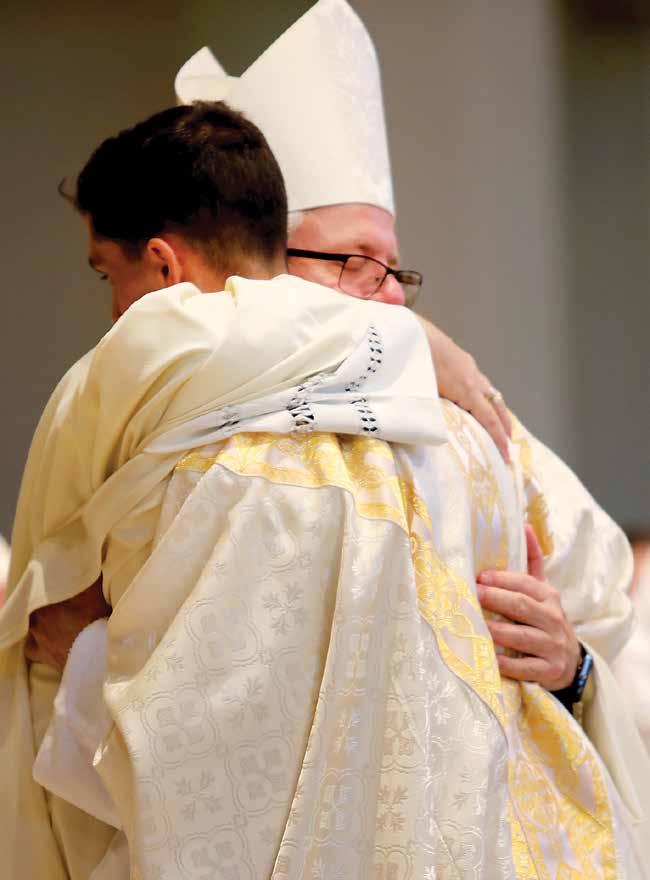
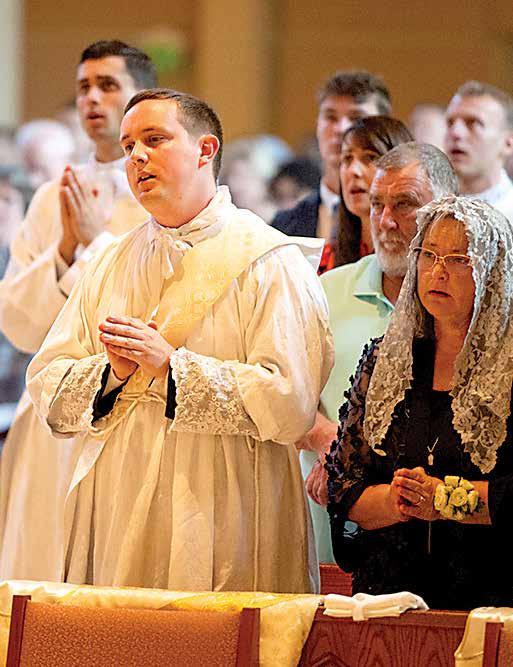
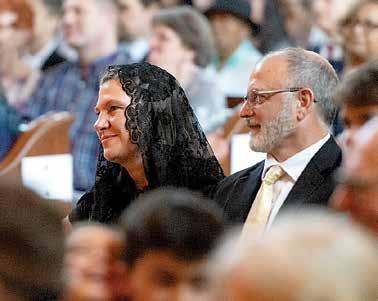
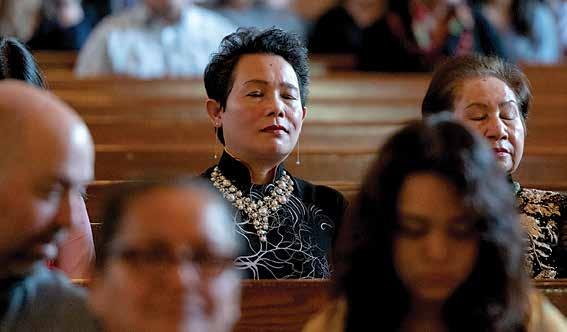
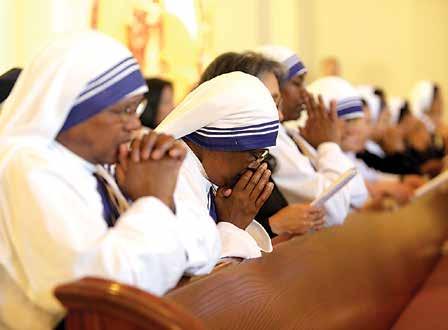
During the Litany of Supplication, the priest candidates prostrate themselves before the altar, a gesture expressive of their unworthiness and complete dependence on the Lord. The congregation – filled with friends, family and members of the community and led by Bishop Martin – join in prayer for them.
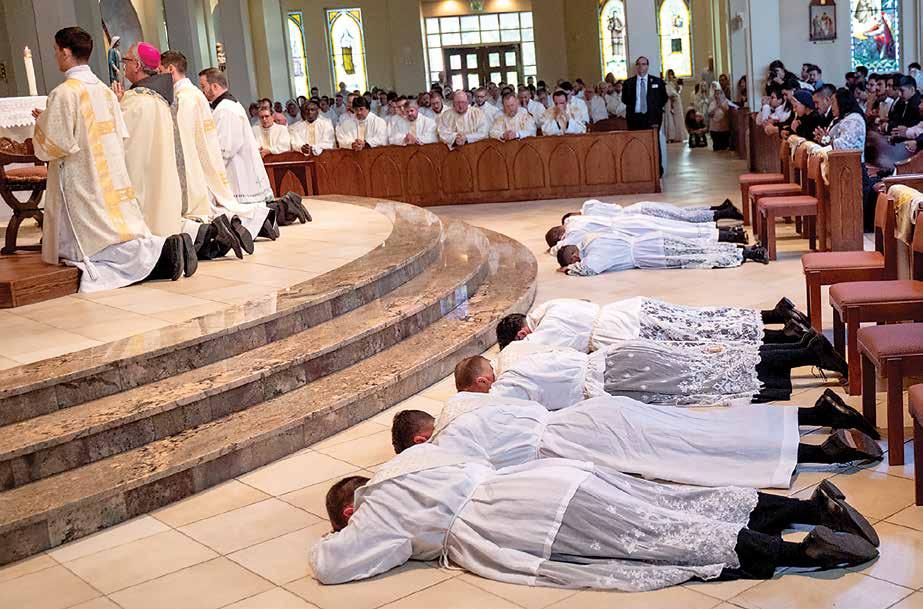
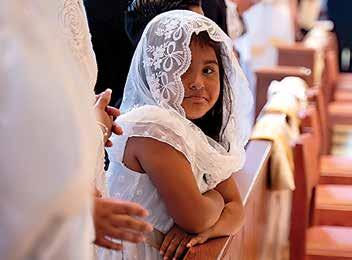

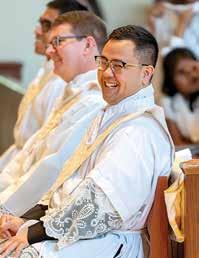
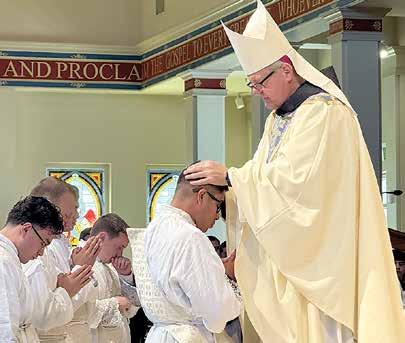
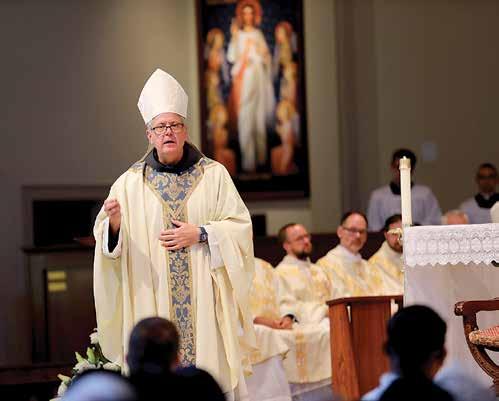

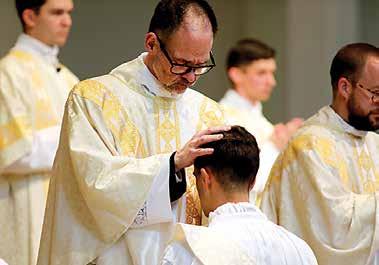
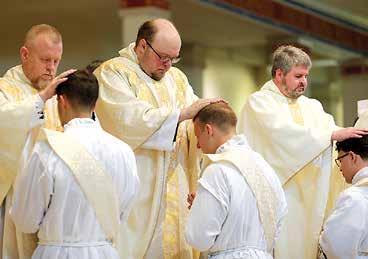
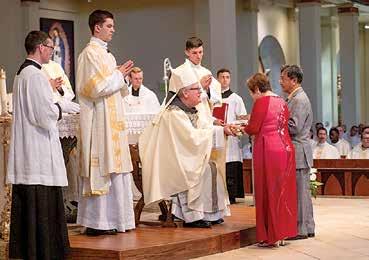
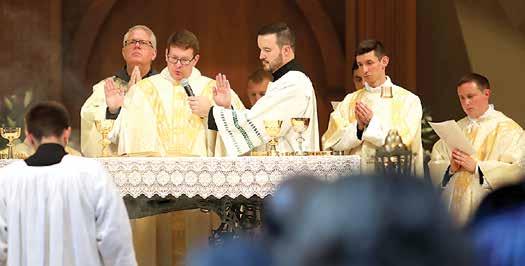
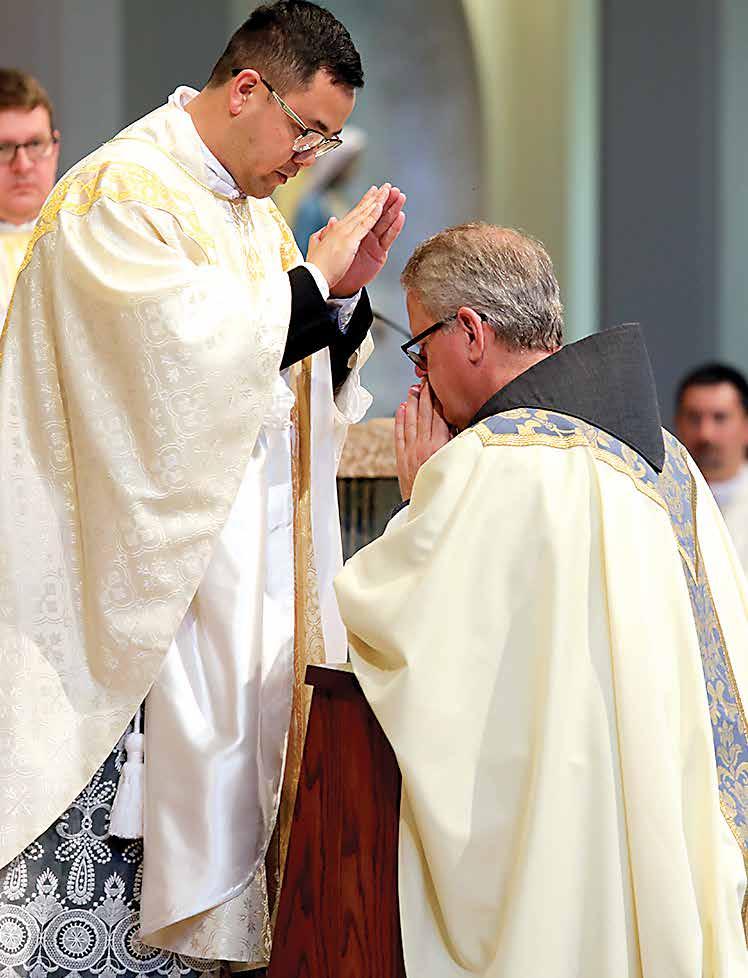
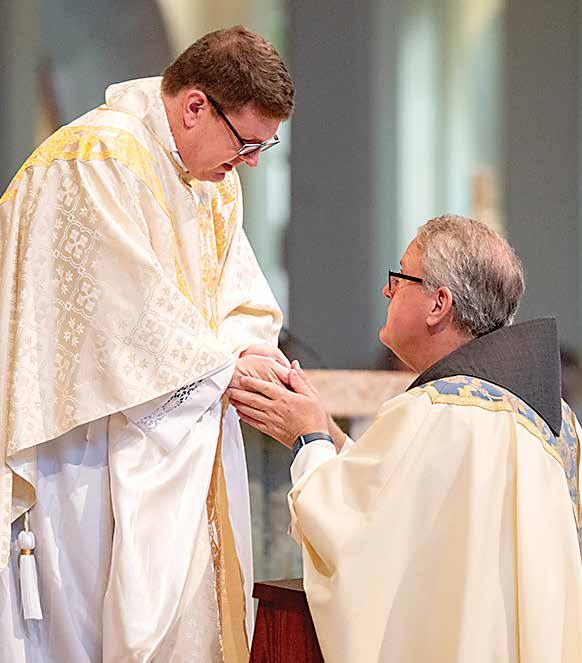
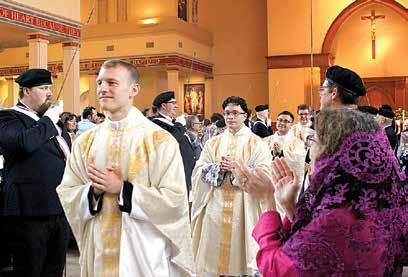
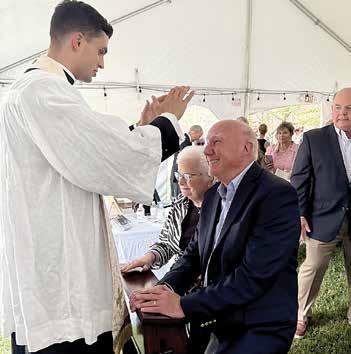
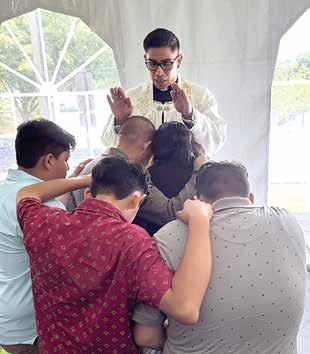
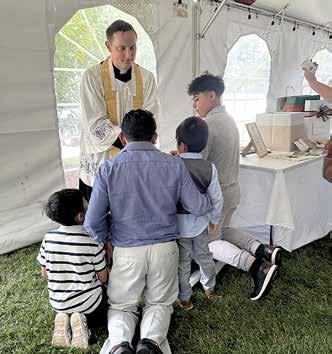


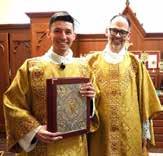
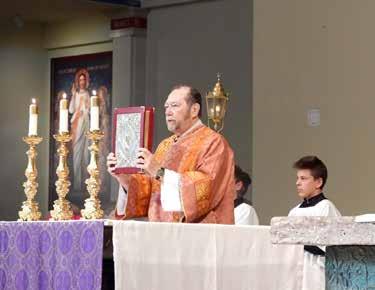


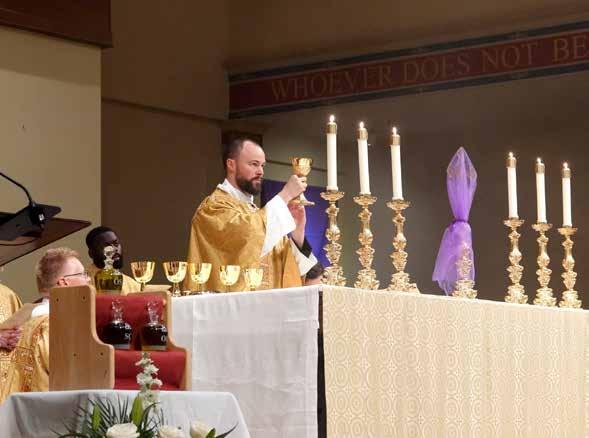


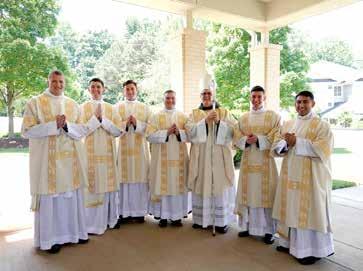
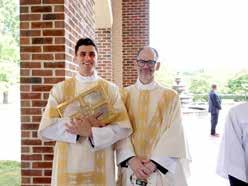
Congratulations to all those ordained to the Episcopate, Presbyterate, and Diaconate in the Diocese of Charlotte! It was an honor and a blessing to be the sacred setting for these significant moments in history.


message of Jesus Christ…and how that gets understood becomes dependent on the seven of you, how your voice will be a prophetic one in a world of many, many voices. You have to be men who go out into the world and show that there is a greater good that can only be found in Christ.”
The bishop said some of their most important moments as priests will come in their service to people in crisis.
“To be a priest is to be the means by which the world receives the saving grace of our Lord…and we know that for so many people that grace is so beautifully made real in difficult moments,” he said. “You will anoint people who are afraid, people who are dying, people who are at a crossroads in their lives. You will be that grace bearer to our world that is afraid.”
He described the special role the new priests will perform as confessors for the faithful.
“One of the most powerful ways you bring sacramental grace is by being the forgiving ears of Jesus, the forgiving spirit of Jesus,” he said. “You will hear sins… and you will offer grace that all of us know is unique to our Church – because the world hasn’t figured out that only when we bow down before our God and profess our weakness that we’re ever able to become strong.
“When in doubt, err on the side of mercy, because that is the message Jesus came to bring – the mercy of the Father.”
After the homily, the men lay prostrate during the Litany of Supplication. The bishop then laid his hands on their heads
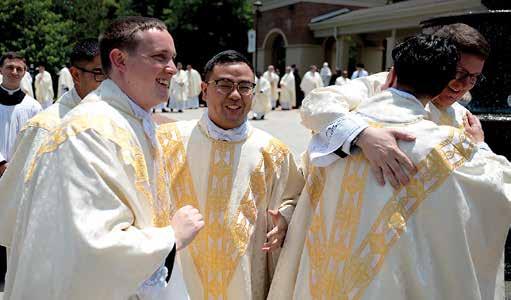
and prayed over them. Dozens of priests who attended the ceremony followed and laid hands on them as a symbol of priestly unity.
The seven were then vested with their stole and chasuble by priests who had played meaningful roles in their lives. They were anointed with sacred chrism and received bread and wine as a sign of their ability to offer Holy Mass. They then received the fraternal kiss of peace from Bishop Martin and the other priests in attendance.
At the end of the Mass, Bishop Martin took time to offer tribute to the families who had come out to witness their loved ones become priests.
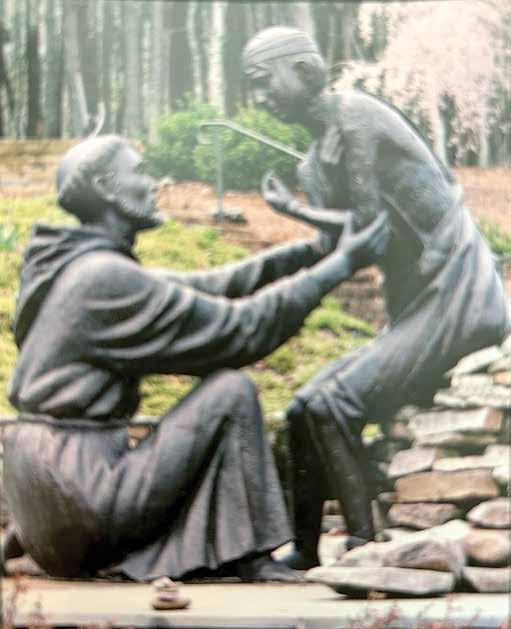
“The gift of life you’ve given them is also a powerful gift to the Church,” he said. “You made Jesus the center of your lives and doing that bears fruit in lots of great marriages, lots of beautiful single lives, and lots of wonderful priests and people in religious life.”
Family members and friends stood together after the ceremony to reflect on the milestone they had just witnessed.
Father Goduti’s grandparents Fred and Barbara Goduti traveled from Naples, Fla., for the ordination.
“This is evidence of God’s glory,” Fred Goduti said. “We’re so in awe at what Christian has sacrificed for himself and for others to get to this point. What a gift this
is! I pray that he’ll always remain a faithful, caring priest who will get us all to heaven.”
Father Kevin Tran’s mother Theresa Tran said, “I’m so honored and happy that God has called him to be a priest – I’m very blessed and our family is blessed.”
Michele Dotson of Mint Hill taught Father Tran English when he was a student at Independence High School. She never imagined that one day she would see him be ordained a priest, but the calling suits him, she said.
“I don’t think most teachers believe they will ever see a student become a priest, but this wasn’t out of character for the student I remember,” she said. “He’s going to be a great priest because he’s a good solid human being – he listens and he’s kind.”
At the end of the ordination Mass on Saturday, Bishop Martin announced where each new priest has been assigned as parochial vicars:
n Father Matthew Dimock: Sacred Heart Parish in Salisbury
n Father Christian Goduti: St. Leo the Great Parish in Winston-Salem
n Father Matthew Harrison: St. Thomas Aquinas Parish in Charlotte
n Father Kevin Martinez: St. Mark Parish in Huntersville
n Father José Palma: Our Lady of Mercy Parish and Our Lady of Fatima Mission in Winston-Salem
n Father Elliott Suttle: Our Lady of Grace Parish in Greensboro
n Father Kevin Tran: St. Gabriel Parish in Charlotte
Their assignments are effective July 9.
More online
At
: See more photos and video highlights from the ordination Mass
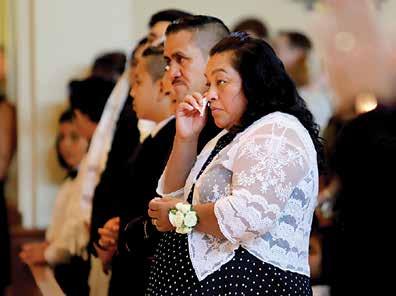
venga a ustedes”, dijo el Obispo Martin. “Sabemos que la base de la buena nueva es el mensaje de Jesucristo... Y cómo se entiende eso depende de ustedes siete, de cómo su voz será profética en un mundo de muchas, muchas voces. Tienen que ser hombres que salgan al mundo ymuestren que hay un bien mayor que sólo se puede encontrar en Cristo”.
El obispo dijo que algunos de sus momentos más importantes como sacerdotes llegarán en su servicio a las personas en crisis.
“Ser sacerdote es ser el medio por el cual el mundo recibe la gracia salvadora de nuestro Señor... Y sabemos que para muchas personas esa gracia se hace realidad de manera hermosa en los momentos más difíciles”, dijo. “Ungirán a las personas que tienen miedo, a las personas que están muriendo, a las personas que están en una encrucijada en sus vidas. Serán esos portadores de gracia para nuestro mundo que tiene miedo”.
Describió el papel especial que desempeñarán los nuevos sacerdotes como confesores de los fieles.
“Una de las formas más poderosas de traer la gracia sacramental es siendo los oídos perdonadores de Jesús, el espíritu perdonador de Jesús”, dijo. “Oirán pecados... y ofrecerán una gracia que todos sabemos que es única en nuestra Iglesia, porque el mundo no se ha dado cuenta de que sólo cuando nos inclinamos ante nuestro Dios y profesamos nuestra debilidad, somos capaces de volvernos fuertes. En caso de duda, equivóquense por el lado de la misericordia, porque ese es el mensaje que Jesús vino a traer: la misericordia del Padre”.
Después de la homilía, los hombres se postraron en el suelo durante la Letanía de Súplica. Luego, el obispo les impuso las manos sobre sus cabezas y oró por ellos. Decenas de sacerdotes que asistieron a la ceremonia lo siguieron e impusieron las manos como símbolo de la unidad sacerdotal.
Los siete fueron investidos con su estola y casulla por sacerdotes que habían desempeñado un papel significativo en sus vidas. Fueron ungidos con el sagrado crisma y recibieron pan y vino como signo de su capacidad para ofrecer la Santa Misa. A continuación, recibieron el beso fraterno de la paz del Obispo Martin y de los demás sacerdotes presentes.
Al término de la Misa, el Obispo Martin se tomó el tiempo para ofrecer un homenaje a las familias que habían llegado a presenciar a sus seres queridos alcanzar
Families and friends of the newly ordained priests were tearful as well as joyful as they watched their loved ones being ordained priests during the two-hour ordination Mass at St. Mark Church.
el sacerdocio.
“El don de la vida que les han dado es también un regalo poderoso para la Iglesia”, dijo. “Ustedes hicieron de Jesús el centro de sus vidas y hacer eso da fruto en muchos grandes matrimonios, muchas hermosas vidas de solteros y muchos sacerdotes maravillosos y personas en la vida religiosa”.
Los familiares y amigos se reunieron después de la ceremonia para reflexionar sobre el hito que acababan de presenciar.
Los abuelos del Padre Goduti, Fred y Barbara Goduti, viajaron desde Naples, Florida, para asistir a la ordenación.
“Esta es una evidencia de la gloria de Dios”, dijo Fred Goduti. “Estamos tan asombrados por lo que Christian ha sacrificado por sí mismo y por otros para llegar a este punto. ¡Qué gran regalo es este! Rezo para que permanezca siendo un sacerdote fiel y cariñoso que nos lleve a todos al cielo”.
Mientras esperaba para tomarse fotos familiares con el Obispo Martin, la madre del Padre Kevin Tran, Theresa Tran, dijo: “Me siento muy honrada y feliz de que Dios lo haya llamado a ser sacerdote. Estoy muy bendecida y nuestra familia también está bendecida”.
Michele Dotson, de Mint Hill, enseñó inglés al Padre Tran cuando era estudiante en la Escuela Secundaria Independence. Nunca imaginó que un día lo vería ordenado sacerdote, pero el llamado le viene bien, dijo.
“No creo que la mayoría de maestros crean que alguna vez verán a uno de sus estudiantes convertirse en sacerdote, pero esto no estaba fuera de lugar para el estudiante que recuerdo”, dijo. “Va a ser un gran sacerdote porque es un buen ser humano, escucha y es amable”.
Al final de la Misa, el Obispo Martin anunció las asignaciones de los nuevos sacerdotes, a partir del 9 de julio:
n Padre Matthew Dimock: Parroquia Sagrado Corazón en Salisbury
n Padre Christian Goduti: Parroquia San León Magno en Winston-Salem
n Padre Matthew Harrison: Parroquia Santo Tomás de Aquino en Charlotte
n Padre Kevin Martínez: Parroquia San Marcos en Huntersville
n Padre José Palma Torres: Parroquia
Nuestra Señora de la Misericordia y Misión Nuestra Señora de Fátima en WinstonSalem
n Padre Elliott Suttle: Parroquia Nuestra Señora de Gracia en Greensboro
n Padre Kevin Tran: Parroquia San Gabriel en Charlotte
Más online
En www.catholicnewsherald.com : Vea más fotos y videos destacados de la Misa de ordenación
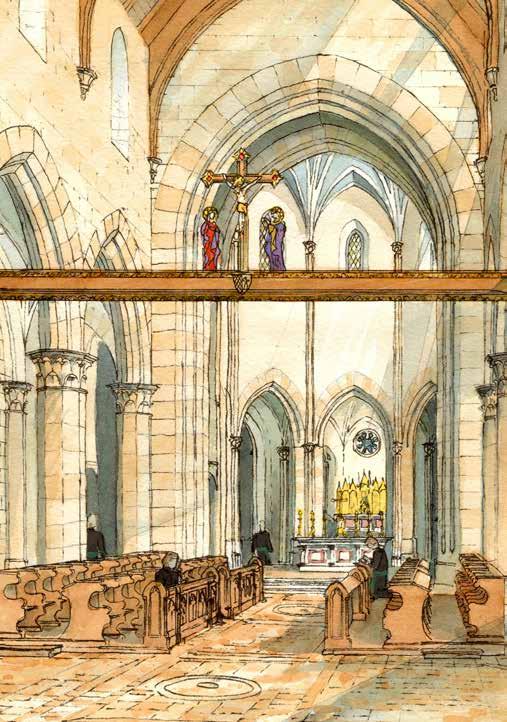
Six men took one step closer to the priesthood on June 1 when they were ordained deacons for the Diocese of Charlotte by Bishop Michael Martin. It was his first ordination and took place only a few days after his own ordination and installation as bishop.
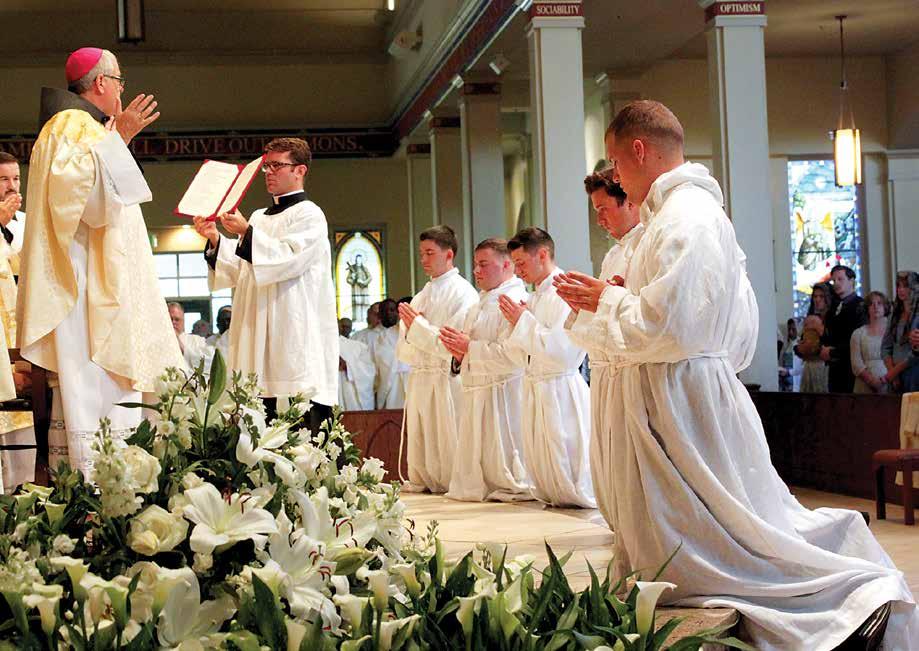
men
Sixmen took a big step on their journey to the priesthood June 1 as they were ordained deacons for the Diocese of Charlotte. Bishop Michael Martin, OFM Conv., performed the ordinations at St. Mark Church in Huntersville, just days after his own ordination as the fifth Bishop of Charlotte.
Those ordained were: Deacon Christopher Angermeyer of St. Thomas Aquinas Parish in Charlotte, Deacon Anthony del Cid Lucero of St. Joseph Parish in Newton, Deacon Nicholas Kramer of St. Margaret Mary Parish in Swannanoa, Deacon Kolbe Murrey of St. John the Baptist Parish in Tryon, Deacon Andrew Templeton of St. Michael the Archangel Parish in Gastonia and Deacon Joseph Yellico of St. Mark Parish in Huntersville.
Before a crowd of family, friends and well-wishers that packed the pews, the men made promises to serve the diocese and Bishop Martin with humility and charity, then prostrated themselves before the altar during the Litany of Supplication. Bishop Martin laid his hands on their heads and prayed over them in the ancient rite of ordination. The six were then vested with the stole, a sign of the deacon’s office of service, and the dalmatic, an outer garment used at Mass.
Seis hombres ordenados diáconos para la Diócesis de Charlotte, un paso más cerca del sacerdocio
Seishombres dieron un gran paso en su camino hacia el sacerdocio el sábado al ser ordenados diáconos de la Diócesis de Charlotte. El Obispo Michael Martin realizó las ordenaciones en la Iglesia San Marcos en Huntersville, solo dos días después de su ordenación como Quinto Obispo de Charlotte.
Los ordenados fueron los diáconos Christopher Angermeyer, Anthony del Cid Lucero, Nicholas Kramer, Kolbe Murrey, Andrew Templeton y Joseph Yellico. Ante una multitud de familiares, amigos y simpatizantes que abarrotaron las bancas, los hombres prometieron de servir a la diócesis y al Obispo Martin con humildad y caridad, y luego se postraron ante el altar durante la Letanía de Súplicas. El Obispo Martin puso sus manos sobre sus cabezas y oró por ellos. A los seis se les vistió con una estola, un signo del oficio de servicio del diácono, y la dalmática, una prenda exterior que se usa en Misa.
El Obispo Martin presentó a cada uno de ellos el Libro de los Evangelios, declarando su misión: “Crean en lo que leen, enseñen lo que creen y practiquen lo que enseñan”. Los seis diáconos podrán ahora proclamar el Evangelio en Misa, predicar por invitación del sacerdote, preparar el altar para el sacrificio de la Eucaristía, distribuir
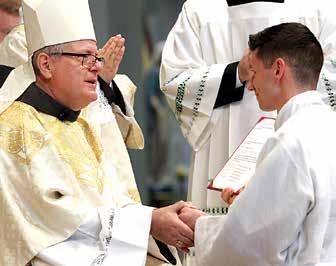
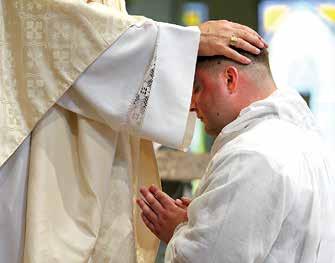
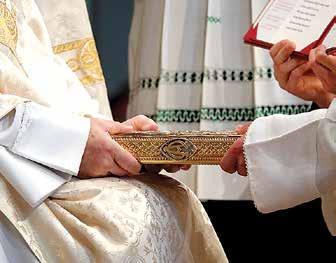

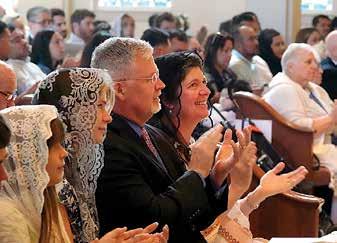
Bishop Martin presented each of them with the Book of the Gospels, stating their mission as: “Believe what you read, teach what you believe and practice what you teach.”
The six deacons will now be able to proclaim the Gospel at Mass, preach at the invitation of the priest, prepare the altar for the sacrifice of the Eucharist, distribute Communion to the faithful, administer baptisms, officiate at marriages, bring Viaticum to the dying, conduct funerals, instruct believers and nonbelievers in Church doctrine, preside over public prayer and perform works of charity.
All six are graduates of St. Joseph College Seminary in Mount Holly and are now considered “transitional” deacons as compared to permanent deacons. Transitional deacons generally serve a year in pastoral, liturgical and educational preparation before being considered for ordination to the priesthood.
During his homily, Bishop Martin stressed the special nature of the role the men will have as deacons. He urged them to turn their complete spiritual and mental focus toward the duties of a deacon.
“The diaconate is the foundation of holy orders – it is not something that you will graduate from, but rather something that your priesthood will be born out of and
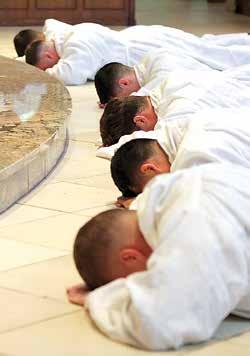
(Top) At the start of the ordination rite, each candidate makes a promise of obedience to the bishop. Then the bishop lays hands on the men and prays over them in the ancient rite of ordination, and lastly presents them with the Book of the Gospels to signify their new ability to proclaim the Gospel as deacons.
will always be rooted in,” he told them. “These next 12 months are not some preparation for a future moment. They’re rather the firm rock upon which the sacrament of holy orders is grounded.”
He reminded them that the central part of their new role is the call “to serve, not to be served,” just as Christ did. Bishop Martin also had a lighthearted bit of advice for the deacons’ families.
“I say this especially for your parents: do not serve these men – stop serving these men,” he said, drawing laughter from the deacons, their families and the congregation. “These men now are here to serve you. Finally, it’s your turn. Help them to realize that right up front when they come home. You can use my name if you want. ‘Hey, get off the couch and go do those dishes! You’re here to serve, not to be served.’”
After the Mass, the deacons and their families posed for photos with Bishop Martin. Parents, siblings, grandparents and other relatives took time to contemplate the meaning of the special day.
“It’s really hard to put into words how I feel today,” said Deacon Yellico’s mother, Lissette Yellico of Huntersville. “I just keep saying, over and over, ‘God is good.’” Deacon Kramer’s mother, Sarah Kramer, stood with his grandfather, Patrick Westrick, and talked about how his ordination was the result of years of work and dreams. “We feel very blessed to be here after all the work he has put in – it’s been very special to watch this holy man blossom,” she said.
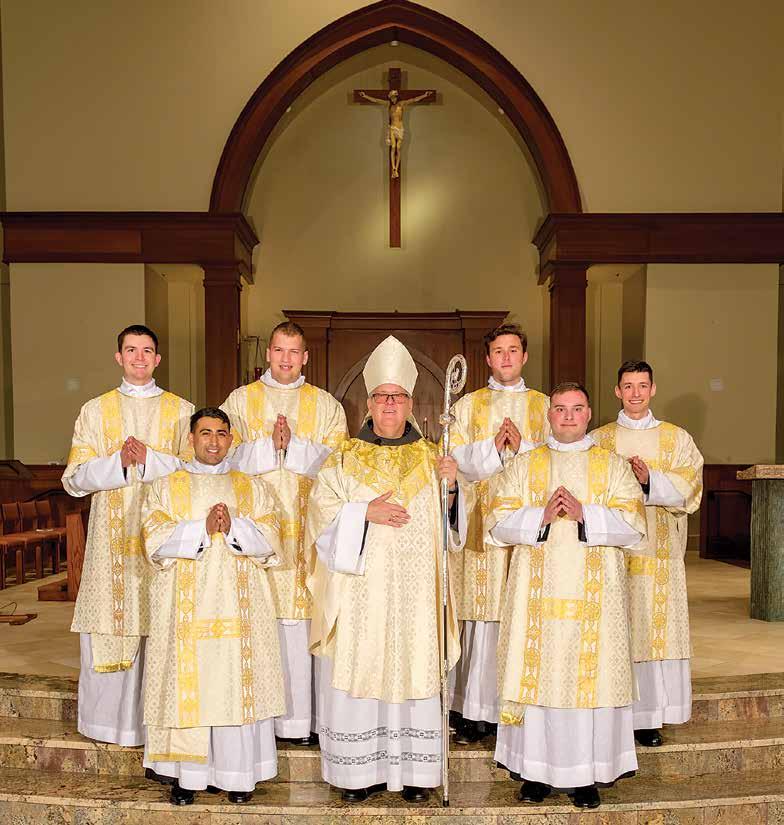
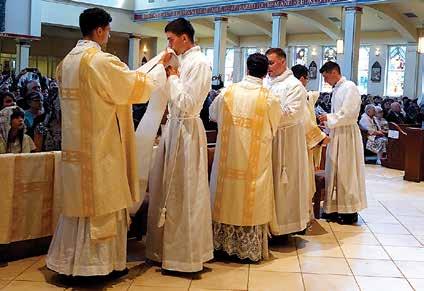
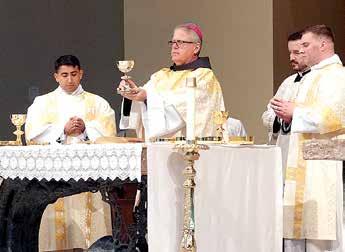
la Comunión a los fieles, administrar bautismos, oficiar matrimonios, llevar el Viático a los moribundos, dirigir funerales, instruir a creyentes y no creyentes en la doctrina de la Iglesia, presidir la oración pública y realizar obras de caridad.
Los seis son graduados del Seminario Universitario San José en Mount Holly y ahora son considerados diáconos “transicionales” en comparación con los diáconos permanentes.
Los diáconos de transición generalmente sirven un año en preparación pastoral, litúrgica y educativa antes de ser considerados para su ordenación sacerdotal.
LLAMADOS A SERVIR
Durante su homilía, el Obispo Martin enfatizó la naturaleza especial del nuevo papel que los hombres tendrán como diáconos. Les instó a dirigir todo su enfoque espiritual y mental hacia los deberes de un diácono.
“El diaconado es la base de las órdenes sagradas, no es algo de lo que te graduarás, sino algo de lo que nacerá tu sacerdocio y en lo que siempre estará arraigado”, dijo el Obispo Martin. “Estos próximos 12 meses no son una preparación para un momento futuro. Son más bien la roca firme sobre la que se asienta el sacramento del Orden Sagrado”.
Les recordó que el motivo principal de su nuevo papel es el llamado a “servir, no a ser servidos”, tal como lo hizo Cristo. El Obispo Martin también dio un consejo alegre a las familias de los diáconos.
“Digo esto especialmente para sus padres: no sirvan a estos hombres, dejen de servir a estos hombres”, dijo el Obispo Martin, provocando la risa de los diáconos, sus familias y la congregación. Estos hombres ahora están aquí para servirlos. Finalmente, es el turno de ustedes. Ayúdenlos a darse cuenta de eso desde el principio cuando regresen a casa. Pueden usar mi nombre si quieren. ‘¡Oye, levántate del sofá y ve a lavar los platos! Estás aquí para servir, no para ser servido’”.
‘DIOS ES BUENO’
Después de la Misa, los diáconos y sus familias se fotografiaron con el Obispo Martin.
Padres, hermanos, abuelos y otros familiares se tomaron el tiempo para contemplar el significado de este día especial.
“Es realmente difícil expresar con palabras cómo me siento hoy”, dijo la madre del Diácono Yellico, Lissette Yellico, de Huntersville. “Sigo diciendo una y otra vez: ‘Dios es bueno’”.
La madre del Diácono Kramer, Sarah Kramer, estuvo junto a su abuelo, Patrick Westrick, y habló sobre cómo su ordenación fue el resultado de años de trabajo y sueños.
“Nos sentimos muy bendecidos de estar aquí después de todo el trabajo que ha realizado. Ha sido muy especial ver florecer a este hombre santo”, dijo.
Más online
En www.catholicnewsherald.com : Vea más fotos y videos destacados de la Misa de ordenación de diáconos y aprenda más sobre cada uno de los hombres que fueron ordenados
The North Carolina Knights of Columbus State Council extends our congratulations to all celebrating their ordination to the Holy Priesthood. We also offer congratulations to priests, deacons and religious who are celebrating the anniversary of their continued service to the Diocese of Charlotte.

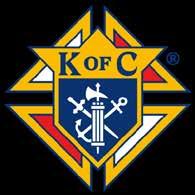
https://www.kofc.org/joinus


LIZ CHANDLER lchandler@rcdoc.org
CHARLOTTE — Monsignor Patrick Winslow carries some lofty titles.
Vicar general and chancellor of the Diocese of Charlotte. Canon lawyer. Former Promoter of Justice. And one of only 50 American priests appointed by Pope Francis to serve as a worldwide Missionary of Mercy.
He’s also a member of diocesan leadership boards that aren’t exactly household names – the Presbyteral Council, College of Consultors, Vocations Board – but help keep the Church running in western North Carolina.
Yet when you ask him which credential represents his most important work he goes to what he calls the essence of the Church: Father Winslow, parish priest.
“Seeing the impact I’ve had in the lives of people as a priest is extraordinarily fulfilling,” says Father Winslow, who is celebrating his 25th anniversary of ordination this month.
“I will run into parishioners I haven’t seen in a while, and seeing the way they look at me with such fondness and appreciation – it just never ceases to surprise me.”
A parish priest for 20 of those 25 years, he has served in Tryon, Jefferson, Sparta, Charlotte and briefly in New York, where he began his ministry in 1999.
“There isn’t a thing I do today at a diocesan level that isn’t informed by my experience as a parish priest, working directly with the People of God.”
It has been five years since Father Winslow pastored a parish. As vicar general, he now works uptown in the Diocesan Pastoral Center, which provides leadership and support for the diocese’s 92 parishes, 20 schools and more than 50 ministries. Yet, despite the passage of time, more than 200 friends and former parishioners turned out recently to celebrate his anniversary with a special Mass and party June 8 at his last parish, St. Thomas Aquinas in Charlotte.
“We love him.” “He listens.” “He’s kind,” they said standing in line to congratulate Father Winslow.
Christine Coutre drove up from Georgia to attend because, she says, “he transformed my life…during a very, very dark time” of loss.
“He impacted my life in ways words can’t express,” she says. “He sent me to Catholic Charities for counseling, and he’d talk with me…When he would give a homily I felt he was speaking to me directly. He could just speak without any script, and his reflections were just so meaningful.”
Today, his “parish,” in effect, encompasses the entire diocese, with its 530,000 Catholics in 46 counties across the western half of North Carolina.
While he’s one step removed from parish life, he says, “I see my role as serving those who serve the people. So it’s important that our diocesan procedures and methods not only help achieve that goal but also reduce the work and the pain that priests and their people might otherwise have to endure to get things done in their churches and their lives.”
As vicar general and chancellor, Father Winslow wields significant influence, working directly with the bishop and acting in place of the bishop in his absence. But the position also carries significant responsibility, a job many priests say they wouldn’t touch. Father Winslow calls his assignment a “blessing” and a “privilege” despite the grueling schedule and “hard calls” he must make, because “ultimately, I have the opportunity make it easier for our parishes to share the promise of Jesus and salvation.”
That opportunity won’t diminish now that the diocese has installed a new bishop. One of the first official actions taken by Bishop Michael Martin, OFM Conv., was to reinstate Father Winslow as his No. 2.
“A 25th anniversary is a big milestone for any priest but in particular for Monsignor Winslow, who has made such a difference in the lives of so many,” the bishop said. “His dedication to the Church of Charlotte has been a rich blessing to my predecessor Bishop Peter Jugis and to me personally. He is a trusted adviser and a holy priest who places his life at the service of the Lord every day.”
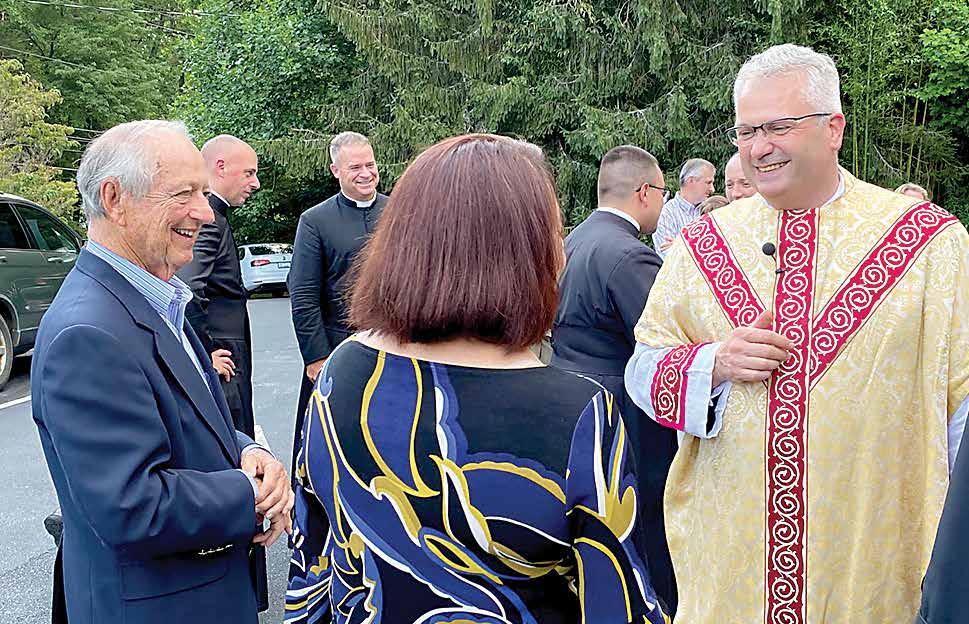
Although he wasn’t particularly pious as a boy, you can see the makings of a priest by looking back on his life.
Patrick was the baby of three boys born to Rich and Karen Winslow in the late 1960s, that is, until twin girls came along 13 years later. They didn’t have a lot when the boys were young: Dad was transitioning from the Navy to pursue a doctorate degree in chemistry, so the family lived in student housing on the University of Massachusetts’ Amherst campus.
“We were kind of on the poor side in those early years, so the dynamic was to keep things light,” Patrick’s brother Mike says. “Pat was always very funny. We would try to see who could be wittier. We played practical jokes and there was lots of sarcasm.”
Brother Rich adds: “When you don’t have a lot, you’re not taking vacations or going to camp, so you spend a lot of time together. We developed a tight-knit family that never really splintered. There’s a closeness to this day.”
The boys played sports together but Patrick didn’t latch on, probably because, his brothers admit, they stuck him in scut positions like goalie and center while they would shoot pucks at him or play the glory positions.
The Winslows went to church on Sundays and Catholic values were preached at home but their faith deepened over time, and their economic circumstances improved when Rich Winslow Sr. landed a job at General Electric and a house in suburban Albany, New York.
Patrick’s brothers were nearly grown when their sisters were born – so Patrick, age 13, helped take care of the girls, changing diapers and entertaining them, offering a glimpse of his uncommon patience and compassion.
“He was like a second father to us. He was always so kind,” says sister Debbie. She remembers fondly how he taught them to swim and took them to get their ears pierced – without their parents’ knowledge or permission. His brother Rich says: “Pat was always a good kid. He never really got in trouble. He was always just a kind and gentle kid…So it’s not a surprise, looking back, that becoming a priest has been a good fit.”
Other character traits that define him today showed up in high school.
“He was very popular – there wasn’t anyone who didn’t like him,” brother Rich says. Patrick went to more proms at his and other high schools than his brothers did combined, their father says, largely due to the vast network of friends he made working at Ponderosa Steakhouse.
Patrick took that job seriously, learning every aspect of the business – from line cook, to cleaning, to serving, to operations – and he’d eagerly take extra shifts, at times, stepping in as manager.
“He became the go-to guy at Ponderosa,” his father recalls. This may have begun Father Winslow’s tendency to dive into details, to think about things a million different ways – sometimes annoyingly, friends and family joke, but always with the intent of finding a solution to help others.
“He loves process. His brain is usually spinning like the pinwheel on your computer,” says longtime friend Father Matthew Kauth. “It is a mill that is always moving and it depends on what grist gets tossed in there to see what will come out.”
Father Christopher Gober jokes: “Playing golf with him will certainly help you grow in the virtue of patience. He stands over the ball far too long. It takes him forever to swing a golf club because he overanalyzes everything, from his swing to the surroundings. Just hit the ball!” It’s a trait, Father Winslow says, that can sometimes lead to “over-engineering.”
“The biggest challenge about being vicar general is when something comes up and there isn’t a playbook. You have the expertise but you have to figure out how to apply it in this particular case.”
At an early age, Patrick developed a deep devotion to the Virgin Mary – from his first glimpse of her in a nativity
scene, through his study of her appearance at Fatima. But it wasn’t until he’d entered the doctoral chemistry program at Georgia Tech in 1993 that he suddenly felt a call to the priesthood.
He graduated with a theology degree from Catholic University of America and was ordained in 1999, serving in two parishes and as a prison chaplain in the Diocese of Albany, before moving south in 2002. He became incardinated into the Charlotte diocese.
He served at St. Vincent de Paul in Charlotte, St. Francis of Assisi in Jefferson and its mission, St. Frances of Rome in Sparta, before becoming pastor at St. John the Baptist in Tryon and, in 2012, at St. Thomas Aquinas.
“He’s a builder rather than a caretaker, a problem solver rather than a lounger,” says Father Kauth.
Indeed, Father Winslow overhauled St. John the Baptist in 2010, and renovated the sanctuary of St. Thomas Aquinas in 2018, which included the addition of a dramatic baldachin (or canopy) over the altar.
He’s also a builder of people, say friends and parishioners: approachable, compassionate in confession, wise.
“He’s had a significant impact on me. He was my pastor and I told him I was thinking about the priesthood, and he took care of me in the sense of being a good spiritual leader,” says Father Chinonso NnebeAgumadu, who was ordained in 2023. “You could talk to him about anything, and seeing how he loved and cared for his parishioners, well, that is the type of relationship I hope to develop with my parishioners.”
Longtime friend Father Timothy Reid adds: “Father Winslow has an ability to put just about anyone at ease. He’s a deep thinker and yet imminently practical, and without a doubt is one of the most creative people I know. I love that, at one moment, he can wax poetically about chemical compounds, and at the next, dive into an informed discussion about pop culture. He has a great love for our faith and the Church, and a very particular love for Our Lady. We are blessed to have him.”
FIVE HARD YEARS
In 2019, Bishop Peter Jugis asked him to serve as vicar general and chancellor.
The five years since haven’t been easy. His first task was to produce a list of priests in the diocese who have been credibly accused of child sexual abuse since its founding in 1972. The yearlong historical records review led to publication of one of the most comprehensive accountability reports in the country.
Next came the pandemic, which brought unprecedented challenges. At one point, Father Winslow took to watching safety videos online, then demonstrating to his priests how they could safely anoint the sick and dying with a cotton ball and Q-Tip.
“There was great appreciation for how he navigated the diocese through COVID,” Father Gober says. “He always had very timely guidance that incorporated a pastoral approach and sound safety measures.”
With the diocese’s 2,000-plus employees, there are always personnel matters, mishaps and operational challenges as with any large organization. The diocese’s population growth also poses challenges. Then there are partnerships to work out, such as bringing in priests from the Diocese of Buea, Cameroon, and elsewhere.
“He has been incredible in helping find the right formula for how we could fit into this diocese,” says Father Andres Gutiérrez, a Colombia native who is helping the diocese minister to Spanish speakers. “You just see him excited about the potential that is here. It’s
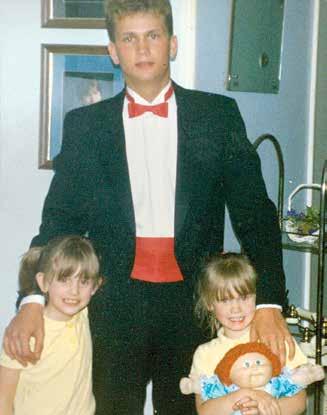
(Left) On his way to one of many high school proms he attended, Patrick Winslow was popular in school and helped out at home, becoming like a second father to his twin sisters Mary (left) and Debbie.
(Below) Monsignor Winslow elevates the Precious Blood during Mass for the 2024 Duc In Altum vocation summer camp at Belmont Abbey.
(Bottom) Known – and sometimes teased – for his deeply analytical approach to problem solving, Monsignor Winslow leads a two-day workshop to evaluate and reconstruct the way the diocese’s 92 parishes plan for their futures. “He has no problem with a hard day’s work,” says older brother Mike. “He kind of enjoys it and always has.”
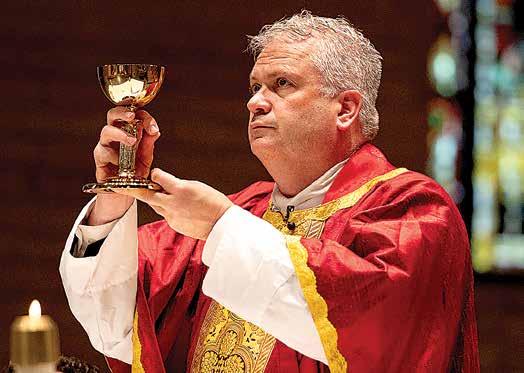
that excitement, his solid doctrine, his piety – he’s just an exemplary priest.”
By nature, he spends a lot of time building new processes and procedures to simplify life – from a diocesan intranet with policies and resources, to new parish planning, property management and church construction processes.
“Whenever you are in a position of authority or leading, you have to make decisions that you know are going to upset some people,” he says. “The hard calls usually float up. You don’t have the luxury of not deciding. I don’t like upsetting people; I don’t like being an instrument of pain for people – so that is a huge sacrifice.”
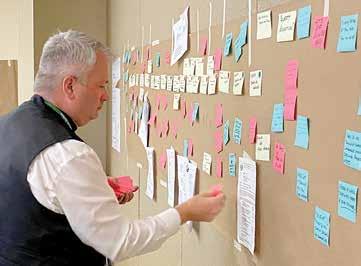
What’s your favorite…
CNH: Bible verse?
Winslow: “Today you will be with me in Paradise” (Luke 23:43).
CNH: Liturgy?
Winslow: Mass and Adoration
CNH: Holy Day?
Winslow: Easter
CNH: Saint?
Winslow: Blessed Virgin Mary CNH: Movie?
Winslow: Not limited to, but includes “Return to Me,” “The Color Purple,” “The Song of Bernadette,” “Secretariat,” and “Wit”
CNH: TV show?
Winslow: Recently, dubbed Korean television
CNH: Food?
Winslow: Steak, potato, nearly all desserts. I like ice cream, I like custard, I like cookies.
CNH: Pastimes?
Winslow: Time on the water – rivers, lakes, oceans
Favorite childhood activity? Time in the swimming pool
Favorite chemistry experiment? Baking
Last book you read? “The Fulfillment of all Desire,” by Ralph Martin; “The Body,” by Bill Bryson
Pet peeve? Hidden agendas
Nicknames? Human Snowball (from a childhood skiing wipeout my brother still laughs about)
Meanest childhood prank? My brothers woke me up at 1 a.m. saying I was late for my paper route, then mocked me mercilessly when I jumped up, got dressed and headed out the door three hours too early.
Favorite video game? Roulettist casino app
Guilty pleasure? Reality TV – I’m like a deer in headlights when it comes on. Also, any TV show that reveals people’s paranormal stories.
Specialty dish you make? Some pastas (carbonara, amatriciana, norcina) and salads
Something most people don’t know about you? I am not as I appear; I am still a kid at heart
Something most people don’t know about the diocese? The work of God happens everywhere, all the time, at the most local level
What’s an obscure talent you have? Conversing while falling asleep in a chair. I never know what I’m saying.
Most recently, he helped the diocese navigate a transition of its leadership, as Bishop Martin succeeded the retiring Bishop Jugis.
He’ll be forever indebted, he says, to Bishop Jugis for the opportunity to lead a growing and vibrant diocese, and for his
mentorship. “I have learned a great deal about patience and trust in God from him,” Father Winslow says.
Bishop Martin, he says, is a good fit for this time in our diocese. “He brings vitality and zeal, and a wonderfully human touch. I think his strengths will help us meet the moment of growth and opportunity to help people find and grow their faith. I’m looking forward to seeing what the Holy Spirit has in store.”
Favorite sport? Winter sports, all Olympic events, high-profile games
Most challenging moment as a priest? Offering advice and counsel in a second language
Your parents are…? My first and my greatest blessing!
Monsignor John McSweeney, first priest ordained for Charlotte diocese, celebrates 50th anniversaryANNIE FERGUSON arferguson@rcdoc.org
CHARLOTTE — John McSweeney was in college and engaged to a lovely young woman with dreams of one day having a family when he first sensed God calling him to a different vocation – one that would require him to forego his own family to shepherd a much larger one.
“I had to make a decision,” he says, now age 83. “I didn’t know if I wanted to continue on with the engagement. She and I are the best of friends to this day, but I just thought I needed to try to become a priest.”
Responding to that nudge from God turned into five decades as a priest filled with success while maintaining his mission to be a servant to God’s people. His vocation parallels the history of the Diocese of Charlotte, established in 1972. He was the first priest ordained for the brand-new diocese, back in 1974, and he began ministering at parishes the very next day.
A native of upstate New York, known for his direct style and wry humor, he would go on to be honored with the title “Monsignor” by then-Pope John Paul II, and would play a key role in running the diocese: serving as its administrator between bishops, then as vicar general and chancellor under two Charlotte bishops.
Monsignor McSweeney also led the diocese’s vocations program, guiding more than two dozen young men in their discernment and formation as priests – including one who would later become a bishop. And he had a heart for the hungry and the homeless, starting food banks in at least five parishes where he served.
His final assignment, spanning 18 years, was to pastor the fledgling St. Matthew Parish in booming south Charlotte. Under his leadership, St. Matthew grew from having Mass in a gym to becoming one of the largest parishes in the United States, with more than 11,500 registered families today.
“Monsignor McSweeney has played a key role in making our diocese what it is today,” says Monsignor Patrick Winslow, who now serves in the same role Monsignor McSweeney did, as the diocese’s vicar general and chancellor. “He has had a keen sense of how to marshal people to use their God-given talents to benefit the local Church. And no matter how busy he was, he was always available for people, making them feel welcomed and challenging them to grow spiritually.”
The way Judy Schindler sees it: “He builds bridges and not walls.”
She was Rabbi of Temple Beth El and recounts how Monsignor McSweeney consistently reached out to the larger community, building Habitat Homes and providing space for the Jewish community to worship for many years until their temple renovation was complete in 2008.
“We did not have a facility that could hold our congregation during the High Holy Days, so Monsignor McSweeney graciously opened St. Matthew to us,” she says. “With sensitivity and love, he made sure we were at home to celebrate our most holy of times.”
For Monsignor McSweeney – who this year celebrates 50 years as a priest – serving his Church family has been wonderful, challenging and rewarding, just the way every family is, he notes, all thanks to the promptings of the Holy Spirit.
Originally from Oneida, New York, the future Monsignor McSweeney was studying at Catholic University of America in the late 1960s when he made the decision to end his engagement and enter seminary.
Missionary life interested him, but he wasn’t so sure about living in a foreign country. He found direction when Bishop Michael Begley visited the university. Begley was the first bishop of the Diocese of Charlotte, which had only
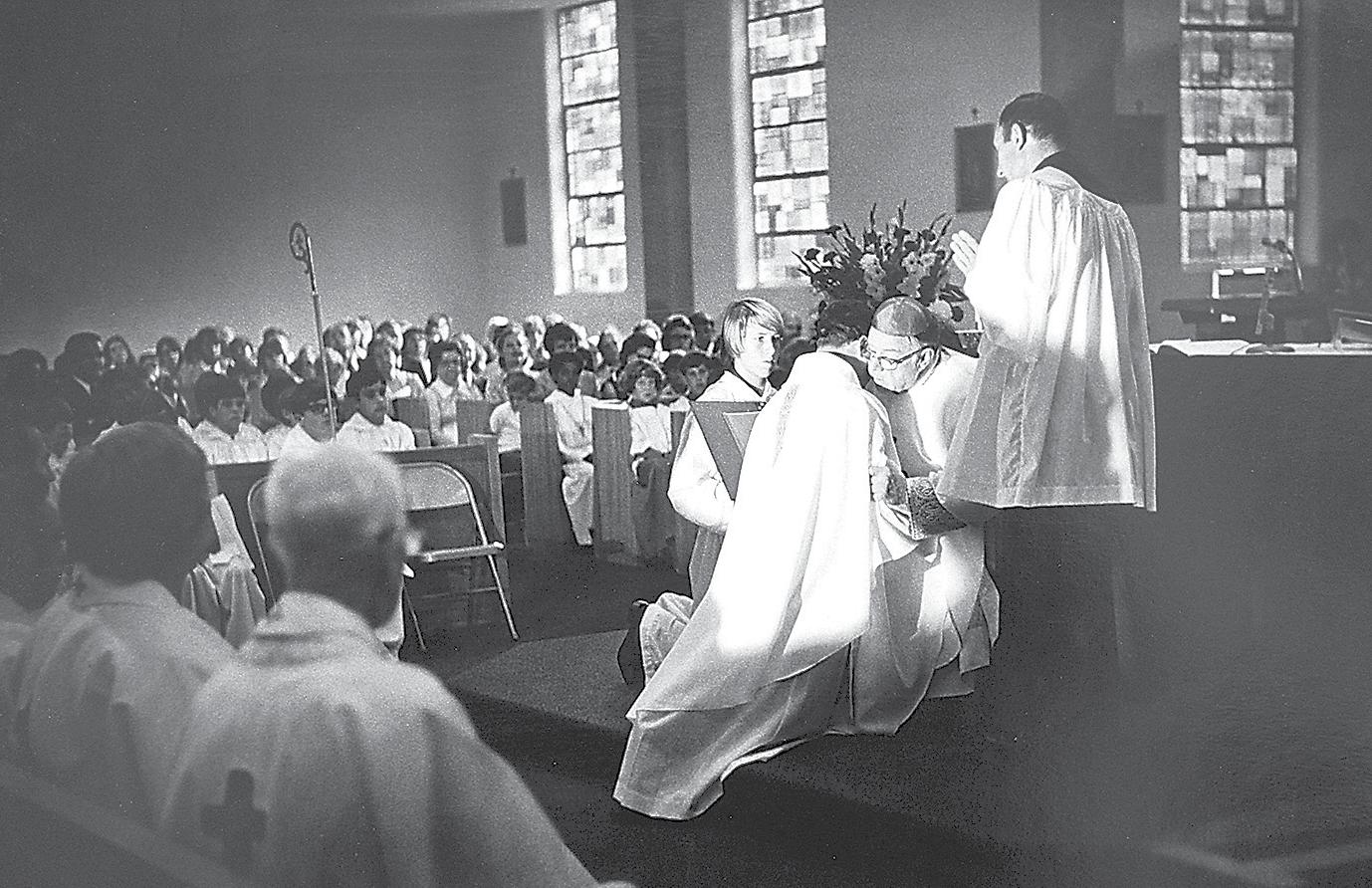
recently been carved out from the statewide Diocese of Raleigh.
“He had been a bishop for two months and was telling me about the missionary efforts of North Carolina, and I said, ‘That sounds good to me,’ so I signed up,” Monsignor McSweeney says.
He continued his studies for the priesthood at Holy Apostles Seminary in Cromwell, Connecticut, then went south to Charlotte, where he became the first priest ordained specifically for the new Charlotte diocese in 1974. Bishop Begley officiated.
His discernment experience would prove valuable in assignments throughout his priesthood, including as vocations director.
“If a young man or anyone is even thinking of the priesthood or religious life, they should try it,” he says. “Maybe they’re not called to it, but they should at least give it an attempt to satisfy their curiosity.”
Monsignor McSweeney reminisces about his own trepidation when entering seminary and says he went in with the notion of being open to whatever God was calling him to.
“I had made an internal note to myself: ‘You’re going to try it, and if you can’t do it, say so and get out of it,’” he remembers. “But I stayed.”
MOMENTOUS OCCASION
Father McSweeney’s priesthood officially began Sept. 29, 1974, auspiciously on the feast of Sts. Michael, Gabriel and Rafael, the archangels. On that day, the parish’s patronal feast day, every priest of the two-year-old diocese attended his ordination at St. Gabriel Church, the first church where he would serve as a priest.
Faithful from across the diocese filled the pews of the Charlotte church to celebrate the momentous occasion, including the Sisters of Mercy, Catholic school children, and many priests who’d been reassigned from the Raleigh diocese to Charlotte.
Monsignor McSweeney admits he was nervous.
“It was funny because the bishop didn’t really know what he was doing,” he recalls with a laugh. “He had never ordained anyone, and I had never been ordained.”
He remembers then-Father Joseph Showfety and seminarian Frank O’Rourke, both of whom would rise in the diocese.
Afterward, Monsignor McSweeney recalls a big
spaghetti-and-meatball dinner organized by women of St. Gabriel Parish.
“It was just a fun and very happy day,” he says. “Everything was so special, and then all of a sudden it hit me – I had become a priest!”
50 YEARS OF SERVICE
The newly ordained Father McSweeney began his priestly ministry the next day as parochial vicar of St. Gabriel Parish. He went on to pastor 12 different churches, earned a master’s degree in administration from Notre Dame, and served as the diocese’s director of planning and development. He also was vicar general and chancellor for eight years under Bishop John F. Donoghue.
When Bishop Donoghue was elevated to Archbishop of Atlanta, Monsignor McSweeney stepped in to guide the Charlotte diocese as administrator, then returned to the vicar general and chancellor role under the new bishop, William G. Curlin.
“I had the unique privilege of working with the bishops and seeing the different activities and ways to make the diocese available to the parishes,” he says.
He regards his years as the diocesan vocations director, 1979 to 1984, as one of the most rewarding and fruitful times of his priesthood.
“I’m very proud of seeing the many young priests that have come out of that period of time that I had something to do with,” he says. One of those priests was Father Peter Jugis, who was a seminarian during Father McSweeney’s tenure and 20 years later would become Charlotte’s fourth bishop.
In 1988, Father McSweeney received word that Pope John Paul II had bestowed upon him the title of monsignor. This rare honorary title is given for exceptional service to the Church and is granted by the pope typically based on the local bishop’s recommendation.
“That was a surprise because I was actually very young to be named a monsignor, but I always felt that was a huge honor,” he says.
In 1995, Monsignor McSweeney moved from his diocesan administrative posts to the U.S. Virgin Islands, where he spent a year serving as pastor of Saints Peter and Paul Cathedral in St. Thomas and of a parish on St. John. His experiences in the Diocese of Charlotte were especially
MCSWEENEY, SEE PAGE 29B
helpful during this assignment.
“The bishop there asked me to be responsible for the formation of three seminarians who eventually became the first priests to serve in the Diocese of St. Thomas, so I was involved with their education and formation in addition to my pastoral roles.”
During this time, he also added a little seafaring to his repertoire.
“It was a unique experience. I would have to take a boat from St. Thomas to the island of St. John’s just to get where I needed to go.”
He returned to the Diocese of Charlotte in 1996 to shepherd the historic and beautiful St. Lawrence Basilica in Asheville. Then, in July 1999, he was appointed pastor of St. Matthew Parish in Charlotte.
“As my first pastor, Monsignor McSweeney was and continues to be a mentor,” says Father Pat Cahill, who served as parochial vicar at St. Matthew from 2007 to 2009 and now is a pastor himself, at St. Eugene in Asheville.
“His ability to delegate and empower others while also being on top of things is second to none. I cherish the fact that I spent my first two years of priesthood learning from him.”
FEEDING THE HUNGRY
Over the years, Monsignor McSweeney became known for his ability to draw out the gifts of others and for the joy he has in doing so. At St. Matthew, he says, the greatest thing he saw happening was the involvement of lay people in the growth and ministry of the parish, noting the highly active parish council and a wide variety of ministries.
“I listen to many different people for consultation, and I try to always identify people of good skill and talent,” he says.
He hired Antoinette Usher as facilities director in 2003. A chemical engineer who had taken time away from work to raise children, she volunteered on St. Matthew’s building committee when they undertook a major building campaign to add 100,000 square feet for a new chapel, parish life center and school.
“He said, ‘Well you built it, now take care of it,’” Usher recalls fondly.
Now chief operating officer of St. Matthew, she says she appreciated Monsignor McSweeney’s directness and the “trust he put in staff members to do what is right.” She also notes his softer side.
“He felt no one was any more special than anyone else, but he did feel that every person carries a sacred title – whether that be mother, daughter, husband or whatever their vocation was in life,” she says. “He tried to portray himself as tough, but he really wasn’t. He had a heart of gold. He would help those in need, often from his own pocket.”
Monsignor McSweeney made special efforts to feed the hungry and started food banks, he recalls, at five parishes.
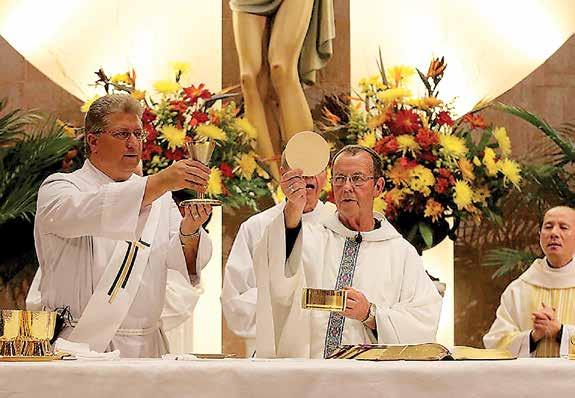
Just two months before retiring, donors honored him by establishing an endowment in his name to enshrine St. Matthew’s annual blood drive – a massive project that provides food for the hungry in Charlotte and in Haiti. The effort recently received national media attention for sending its 3 millionth meal to Haiti in 2023 and has been aptly named the Monsignor McSweeney World Hunger Drive.
“We set up a food pantry area underneath the chapel of St. Matthew. The idea was that the chapel is the ‘bread of life’ upstairs and underneath it is the ‘food for life,’” he says. “There was a spiritual idea behind why we built that particular building – it was to feed both the spiritual and material needs of the people.”
After retiring in 2017, Monsignor McSweeney has remained focused on charity, traveling on mission trips to Jamaica to assist the Missionaries of the Poor in alleviating poverty in the Kingston area. Today, he continues to serve God’s people by filling in for other priests to offer Masses at parishes. He also tends a vegetable garden, where he grows a variety of produce, giving it away to people in need.
“I’m still to this day – 50 years now – thankful for being a priest,” he says. “The greatest blessing has been being available to people in their need and letting myself be available. I like to think of myself as being a good listener, not having all the answers but at least being available for people to talk. A big part of my thinking is to be available to God’s people. As a priest, you are called to be a servant.”
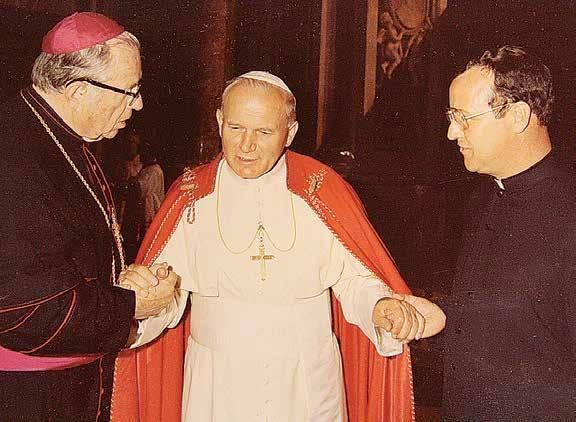
1974-1976: St. Gabriel Church, Charlotte
1976-1979: Immaculate Conception Church, Hendersonville
1979-1980: St. John the Evangelist, Waynesville
1979-1984: Diocesan director of vocations
1980-1982: Queen of the Apostles Church, Belmont
1981: Director, Office of Planning & Development
1981: Vice chancellor
1982: Full-time director of Planning & Development, continuing as director of vocations and vice chancellor
1983-1986: St. Ann Church, Charlotte
1986-1990: Chancellor, Diocese of Charlotte, and vicar general in curia 1986
1990-1991: St. James Church, Hamlet, and Sacred Heart Mission, Wadesboro
1992: National Advisory Committee board member, Catholic Relief Services
1992: Diocesan consultor
1993: Elected diocesan administrator
1994: Vicar general, Diocese of Charlotte, and pastor of St. Thomas Aquinas Church
1995: Sabbatical studies, North American Pontifical College, Vatican; diocese chancellor and vicar general
1995-1996: Missionary work in Diocese of St. Thomas in the Virgin Islands
1996-1999: St. Lawrence Basilica, Asheville
1999-2017: St. Matthew Church, Charlotte

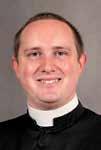
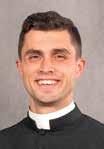

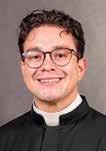


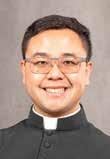
“If some of you hear the call to follow Christ more closely, to dedicate your entire hear t to Him, lik e the Apostles John and Paul...
...because you have nothing to fear when the prize that you await is God Himself, for Whom, sometimes without ever knowing it, all young people are searching.” be generous, do not be afraid,
- Saint John Paul II

Of f ice of Vocations Diocese of Charlotte
Father Christopher Gober Director of Vocations (704) 370-3353
1123 South Church Street Charlotte, NC 28203-4003 vocationsmail@rcdoc.org
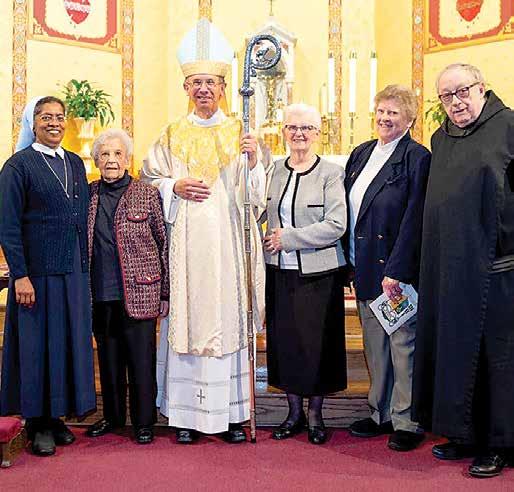
CHARLOTTE — Men and women religious who serve in the Diocese of Charlotte, including five who are celebrating milestone anniversaries in 2024, were honored earlier this year for their service during the diocese’s annual World Day for Consecrated Life Mass offered by then-Bishop Peter Jugis. Recognized were: Mercy Sister Jeanne-Margaret McNally, 75 years; Mercy Sisters Carmelita Hagan and Lillian Jordan, 60 years; Benedictine Brother Paul Shanley, 50 years; and Sister Praveena Madukkamkal of the Sisters of Charity of St. Vincent de Paul, 25 years. The annual celebration was started in 1997 by then-Pope John Paul II as a way to show gratitude for the work of consecrated men and women and highlight their ministries.
For information about establishing an endowment for seminarian education or priests’ retirement, contact Jim Kelley, diocesan director of development, at 704-3703301 or jkkelley@rcdoc.org.
Our seminarians’ education is possible thanks to the generosity of parishioners who give to the annual Diocesan Support Appeal, through Seminarian Education second collections in November and on Easter Sunday, distributions from seminarian endowments held in the diocesan foundation, and those who contribute gifts to the Seminarian Education Campaign.
The Foundation of the Roman Catholic Diocese of Charlotte also has 27 endowments designated for seminarian education, totaling over $23 million:
n Monsignor Thomas Burke Seminarian Endowment Fund
n Conklin Endowment Fund
n A. Loraine Cox and C. Richard Cox Seminarians
Education Endowment Fund
n Doris and Walter Dietrich Endowment Fund
n A. Steven and Dr. Donna S. Ellington Endowment Fund
n Fabrey Endowment Fund
n FFHL Vocation and Seminarian Support Endowment Fund
n James and Elizabeth Hedgecock Seminarian Endowment Fund
n Dick Kelly Endowment Fund
n Seminarian Michael G. Kitson Memorial Endowment Fund
n Lee Endowment Fund
n Don and Teresa Meanor Endowment Fund
n William E. Sr. and Rosalie Daye Rabil Family Endowment Fund
n Reverend Timothy S. Reid Endowment Fund
n Eugene and Carmen Rossitch Seminarian Fund
n Matthew Scheible Endowment Fund
n Dr. Marvin L. Schrum and Paula B. Schrum
Education Endowment Fund
n Seminarian Education Endowment Fund
n Seminarian Support Endowment Fund
n The Abdou J. and Edna S. Showfety
Seminarian Education Endowment Fund
n Stephen D. Showfety Endowment Fund
n Judith and Michael Simac Endowment Fund
n St. Lawrence Council (#1695) RSVP Endowment Fund
n St. Lucien Catholic Church Seminarian Scholarship Endowment Fund
n Father Wilbur Thomas Memorial Endowment Fund
n Valentine Family Seminarian Eucation Endowment Fund
n Vocations Endowment Fund
Each year, people also have the opportunity to celebrate the faithful service of our retired diocesan priests, as well as show gratitude to the priests currently serving in the diocese, by contributing to the diocese’s Priests’ Retirement and Benefits second collection.
— Catholic News Herald


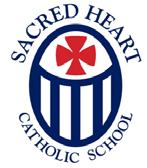


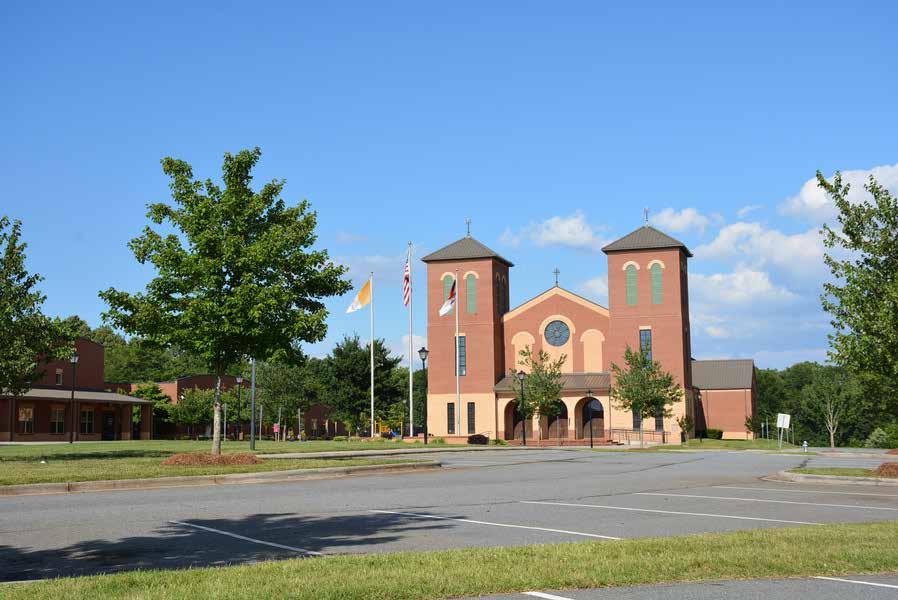
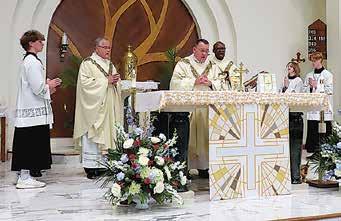
STATESVILLE — Parishioners, family and friends filled St. Philip the Apostle Church in May to celebrate the 40th anniversary of Father Thomas Kessler’s ordination to the priesthood. Father Bernard Oleru, pastor, invited Father Kessler to celebrate Mass in honor of the occasion at the Statesville church because of his close ties to the parish.
Before his 2023 transfer to St. Matthew Parish in Charlotte, Father Kessler served as pastor of St. Philip the Apostle for 10 years, his longest tenure at any parish. Concelebrants of the Mass included Father Oleru and Father Paul Gary of St. Luke Parish in Mint Hill, a longtime friend of Father Kessler. A festive reception followed in the new social hall that was completed during Father Kessler’s time as pastor.
After studying at St. Charles Borromeo Seminary in Philadelphia and Mount St. Mary’s Seminary in Emmitsburg, Maryland, he was ordained a priest in 1984 for the Diocese of Allentown, Pennsylvania. Father Kessler began his ministry in that diocese, including five years of missionary work in Bolivia. When he returned from Bolivia, he served as an administrator at Notre Dame High School in Easton, Pennsylvania. Then he was named director of pastor formation at Saint Paul Seminary, a major seminary in St. Paul, Minnesota. He later transferred to the Diocese of Charlotte, where he served in several parishes before his 10-year tenure at St. Philip the Apostle. — Catholic News Herald
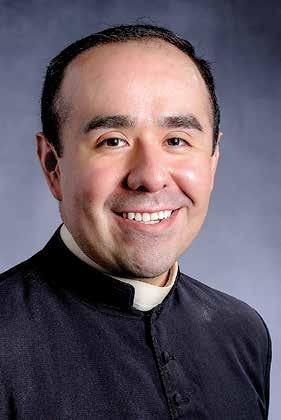
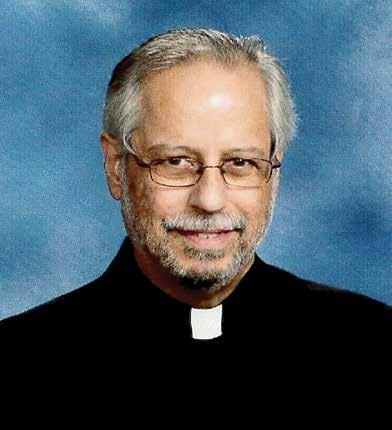
May God grant you many more blessed years in His service. on 10 years of fruitful service in the Lord’s Vineyard.
From the clergy, staff and parishioners of St. Vincent De Paul Catholic Church
10 YEARS
Father Paul Buchanan
Father Noah Carter
Father Elias Correa-Torres, OSB
Father Paul McNulty
25 YEARS
Father José Cárdenas-Bonilla
Father Ricardo Sanchez (not pictured)
Father Timothy Stephens, SJ
Monsignor Patrick Winslow, V.G.
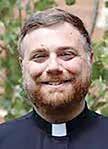
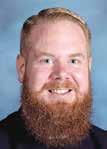
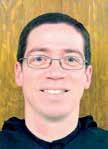
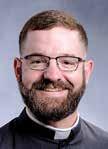
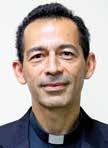
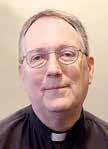

50 YEARS
Monsignor John McSweeney
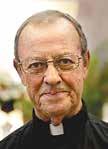
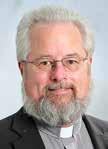
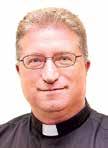
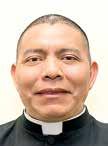
Deacon Guillermo Anzola
Deacon James Bozik
Deacon John Clarke
Deacon Sigfrido Della Valle
Deacon Joseph Diaz
Deacon Michael Goad
Deacon John Harrison
Deacon Thomas McGahey
Deacon Marcos Mejias
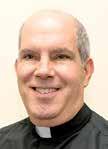
30 YEARS
Deacon Richard McCarron
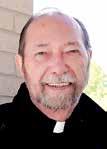
15 YEARS
Father Benjamin Roberts
Father Richard Sutter
35 YEARS
Father Joseph Mack Bishop Michael T. Martin, OFM Conv.
10 YEARS
Deacon Daniel Pyles
Deacon Thomas Sanctis
Deacon C. William Schreiber
Deacon Gary Schrieber
Deacon Miguel Sebastian
Deacon Jack Staub
Deacon Ruben Tamayo
Deacon James Trombley
Deacon Emmanuel Ukattah
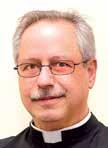
45 YEARS
Deacon John Sims
Deacon William Shaw
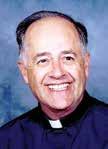

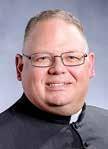
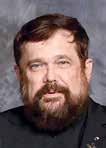
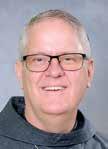
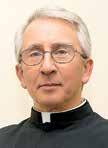
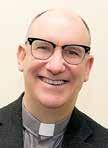

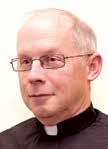
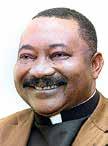
20 YEARS
CONSECRATED RELIGIOUS
75 YEARS
Sister Jeanne-Margaret McNally, RSM
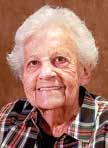 Deacon Daniel Hoffert
Deacon Webster James
Deacon Robert Morris
Deacon James Witulski
Deacon James Toner
Deacon Daniel Hoffert
Deacon Webster James
Deacon Robert Morris
Deacon James Witulski
Deacon James Toner

Father Robert Conway
Father José García Rubio, CM
Father Jean Pierre Swamunu Lhoposo
Father Timothy Reid, V.E.
Father John Starczewski, V.F.
Father Nohé Torres
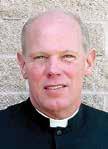
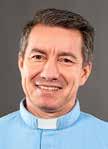
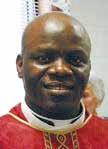
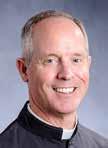

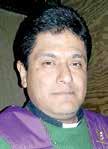
40 YEARS
Father Peter Fitzgibbons, V.F.
Father Paul Gary
Father Thomas Kessler
Father Philip Kollithanath
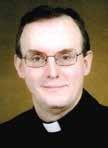
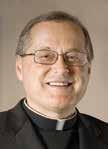
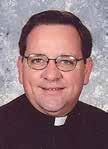
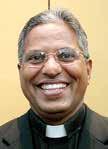
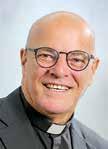
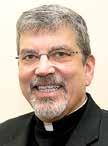
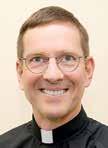
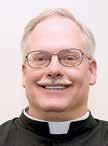
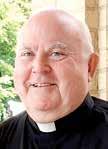
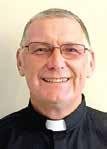
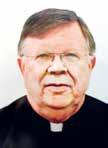
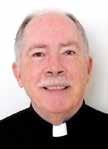
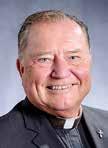

60 YEARS
Sister Carmelita Hagan, RSM
Sister Lillian Jordan, RSM
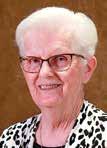
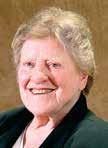
45 YEARS
Father Carl Kaltreider
Father John Timlin, CM
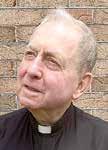
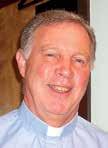
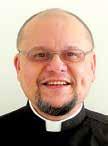
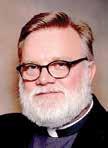
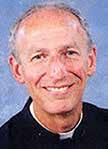
25 YEARS
Deacon Bernardino Velez
Deacon William Griffin
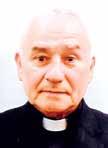
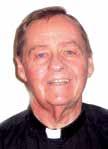
50 YEARS
Brother Paul Shanley, OSB
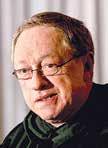
Sister
25 YEARS
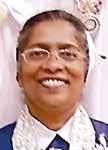
CHRISTINA LEE KNAUSS clknauss@rcdoc.org
MINT HILL — As he celebrates the 40th anniversary of his ordination, Father Paul Gary can’t remember a time in his life when he didn’t dream of the priesthood.
“I always wanted to be a priest – the dream goes back as far as I can remember,” he said. “I could not imagine doing anything else with my life. I remember telling my mom as she sat by her dressing table, and she was not surprised.”
Father Gary has spent the past 16 years as pastor of St. Luke Parish in Mint Hill, where he marked his anniversary during Masses last February, speaking about his priesthood in his homilies and then gathering with parishioners for refreshments.
Father Gary grew up on Long Island in the town of Manhasset, N.Y. A cradle Catholic, he attended Catholic schools and remembers the guidance of the Immaculate Heart of Mary sisters in elementary school and Marist brothers in high school. He has four brothers, including his identical twin, Peter Gary, who is also a parishioner at St. Luke. His family eventually moved to Charlotte, and the young Gary found a supportive and welcoming environment that nurtured
his vocation. Bishop Michael J. Begley had attended Mount St. Mary’s Seminary in Emmitsburg, Md., and decided to send Gary there for his formation. He entered the seminary in August 1980, completed his formation, and was ordained by Bishop Begley at St. Patrick Cathedral on Feb. 11, 1984.
Forty years later, Father Gary’s happiness at a life of serving God fills his voice when he talks about the landmark anniversary.
“It’s a milestone for sure – 40 seems like a big number,” Father Gary said. “Overall it feels great because I think everything about the priesthood is wonderful.”
His ministry has taken him all across the diocese – serving as parochial vicar at Immaculate Conception Parish in Hendersonville and St. John Neumann Parish in Charlotte, and then as pastor at St. Leo the Great Parish in Winston-Salem and St. Philip the Apostle Parish in Statesville. He was rector at St. Patrick Cathedral in Charlotte from 1996 until July 2008, when he was assigned to become St. Luke’s pastor.
He says it’s hard to single out one accomplishment in a life he loves so much but describes the building and dedication of a new church for the Mint Hill parish as his biggest success. Plans for the new church were just starting to get under way when he arrived there in 2008.
“It took all of my years here to do it – from finding and buying the land, to planning the church design and running the capital campaigns,” Father Gary said. “Building a church takes a lot of work, a lot of prayer and a lot of time, and when the project is completed it’s like a dream come true.”
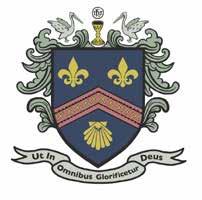
Offers prayers and thanksgiving to Msgr. Patrick Winslow our former pastor on the 25th Anniversary of his ordination to the priesthood.
Deacon Kolbe Murrey our native son on his ordination to the diaconate.
May you both continue to be blessed in your ministry. www.stjohntryon.com
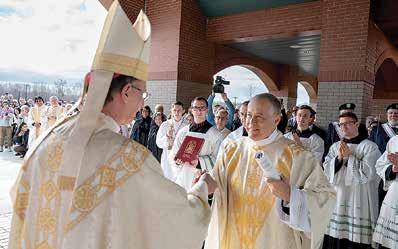
St. Luke’s new 21,000-square-foot church building was dedicated by then-Bishop Peter Jugis on Feb. 19, 2023. It wasn’t the first time Father Gary helped guide a parish through a building campaign. He was pastor at St. Philip the Apostle in Statesville when a new church was built there and dedicated in 1995, and he helped oversee the construction of a new family life center at St. Patrick Cathedral, completed in 2008.
Father Gary marvels at the growth of the Catholic population in the western half of North Carolina since his ordination four decades ago, and he’s especially happy to see the strength and growth of the Catholic school system in the diocese.
Through his decades of service to Our Lord, it is his devotion to many saints and
Father Paul Gary is celebrating his 40th anniversary of ordination this year.
In his four decades of ministry, one of his favorite moments has been
the Blessed Virgin Mary that has guided him throughout his priesthood, he said.
“I pray the rosary every day because it brings me closer to God,” he said. “It is special to set aside part of my day for the rosary. It gives me confidence knowing God will bless me throughout the day.”
Knowing since childhood that God was calling him to priesthood has helped Father Gary rely on God’s guidance in everything he does.
“It’s not so much about my abilities but about what God allows me to do and helps me to do,” he said. “I would say that trusting God has helped me to accomplish what I’ve accomplished. If you allow Him to work through you, you can accomplish great things.”
Fr. Paul Gary and Fr. Thomas Kessler who celebrated their 40th Anniversary of Priesthood this Spring.


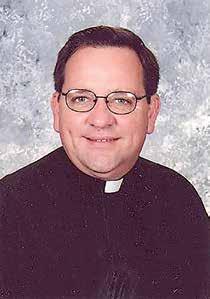
We are so blessed to have them both with us at St. Luke Church and thank them for their years of dedicated service to our Parish and to so many others as well.
We would also like to recognize Deacon Guillermo Anzola "Deacon G" who celebrated 10 years of service in May. We are very grateful for his continued assistance, generosity, and kindness.
May God Bless them all.
CHRISTINA
LEE KNAUSS clknauss@rcdoc.orgCHARLOTTE — Hundreds of people recently turned out to St. Ann Church to celebrate the 20th anniversary of the ordination of their pastor, Father Timothy Reid.
Originally from Indiana, Father Reid was raised in the Methodist faith but started a journey of conversion while in college. His study of Christian history led him to the Catholic faith – where he took the further step of becoming a priest in 2004. Seventeen of his 20 years of priesthood have been spent as pastor at St. Ann Parish.
Over those years, he’s developed a close relationship with his parishioners and others who have known him as a priest, evident in the numbers of people who turned out for the celebration. Most were parishioners, but others drove from far corners of the diocese to wish him well.
After an evening Mass at the church, so many people lined up to speak to Father Reid that it took almost half an hour for him to be able to change out of his vestments and head into the adjacent Allen Center where a huge, joyful reception was in full swing.
Father Reid’s mother, Sharon ReidCarlson, came from Indiana for the milestone occasion. At 84, she still works as a religion education teacher.
“His whole priesthood has been such a blessing to him and our family,” she
said. “When he first became a priest I was worried because he would be far from his family, but I see such a beautiful family he has around him at St. Ann – and as a mother that’s the biggest blessing you could have.”
Debbie Mack and husband Tim live in Rock Hill, S.C., but travel each week to St. Ann Church for Mass. They knew Father Reid before he became a priest and attended his first Mass after ordination. He has presided at the weddings of two of their sons and baptized all six of their grandchildren.
“My heart is overflowing with happiness for him,” Debbie Mack said. “It’s so beautiful to see what he has done for this church. He teaches the beauty of the faith.”
Patricia Hartung of Charlotte said Father Reid lives out the true meaning of the priesthood.
“He truly is a spiritual father to each person he meets,” she said. “Your heart can’t help but be drawn to love the faith when you know Father Reid.”
After Mass, more than 450 people filled the parish hall for a lavish buffet spread, with much of the food prepared and provided by parishioners. Father Reid sat with his mother and other friends and family and talked to a steady stream of well-wishers.
“It’s invigorating to have been able to serve the Lord for 20 years,” Father Reid said. “I realize God has used me to help a lot of people, and I love the people I serve. And I realize there’s still a lot more work to do.”
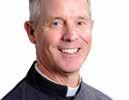
Twenty years of priestly service has taught me that priesthood is one of the greatest privileges a man can experience.
Offering Mass and celebrating the sacraments is as marvelous as it is mysterious, while witnessing God’s grace transform people – seeing them draw closer to Our Lord – daily deepens and enriches my faith. I’ve learned that no one is beyond God’s mercy, that God desires all of us to be saved, and that God’s grace is infinitely more powerful than our sinfulness. The challenge for us priests is to be constantly generous and humble so that God may use us as His instruments of grace, healing and mercy. There are certainly days that are challenging and exhausting, and situations that seem impossible and beyond my own capabilities to handle. Yet, if I persevere in trying to do God’s will, our Lord always steps in to do the heavy lifting. If I am generous with my time and willing to sacrifice for the people of God, then God never leaves me bereft of the grace necessary to accomplish what He asks.
If we just say yes to God, He works through us!
Priestly service has shown me that charity is paramount. God must be loved vigorously and above all else, which entails

loving my fellow man as myself. In loving others, I’ve learned that most people have better intentions than their outward behavior often shows. I’ve learned that true charity consists in bearing with others’ faults and looking for the good in them, while also being mindful of my own sins and weaknesses.
Truly, the heart of a priest must be like our Lord’s own Sacred Heart: humble, constantly open to all, burning with love and willing to sacrifice for others.
Lastly, I’ve learned to speak the truth always but to do it with charity, that patience obtains all things, and that going the extra mile for others is its own reward. It’s been my honor to serve in parishes, in our seminary and in our Catholic schools these past 20 years. I’m particularly grateful to my brother priests for their good example and to all the wonderful people it’s been my privilege to serve.
As I continue working in our Lord’s vineyard, I pray that I may do so in a way that pleases Him, renders Him honor and helps brings salvation to souls – for that’s all that really matters.
FATHER TIMOTHY REID is the vicar of education for the diocese’s Catholic schools and pastor of St. Ann Parish in Charlotte.
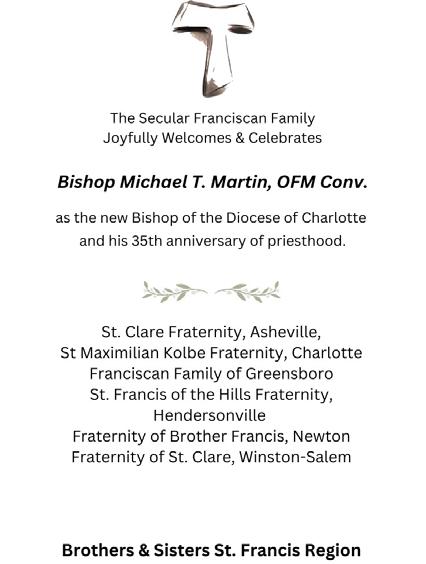
On June 6, 2024, I celebrated my 15th anniversary as a priest, my “quinceañero de sacerdocio.” As I recall, I celebrated a wedding on my fifth anniversary, and my doctorate in preaching was granted just before my 10th. At 15 years, I am reflecting more and more on the spirituality of the diocesan priest.
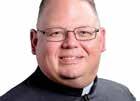
The diocesan priest does not have any specific spirituality. We do not have a rule of life or constitutions like the Benedictines, Dominicans, Franciscans or Jesuits.
Our lives, particularly our spiritual lives, are nourished by the celebration of the Mass, the prayer of the Liturgy of the Hours, the administration of the sacraments, and whatever other food we select from the endless buffet of spiritual wisdom. Each of us is allowed to fill our own plate at the pilgrim feast.
Yet after 15 years, and almost 12 of those as a pastor, I think two selections on the buffet are worthy of a double portion and perhaps a return trip with a fresh plate. The first is presence or, put another way, “and Father was there.” From the baptism to the burial and everything in between, Father was there.
My mom was in the hospital, and Father was there. I was leaving for college and wanted a blessing, and Father was there.
My family was celebrating, or mourning, or scared, or doubting, and Father was there.
I needed Good News, and Father was there.
From the baptism to the burial and everything in between, Father was there.
The parish priest is blessed to walk the pilgrim road
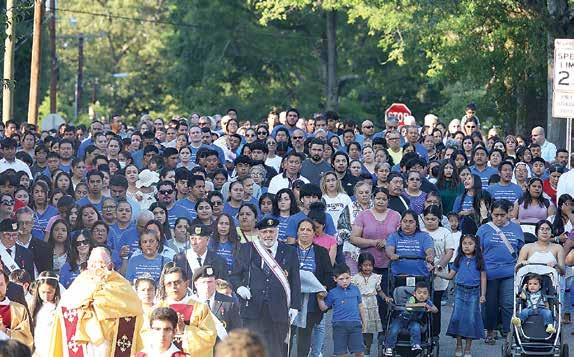
and accompany the lives of the faithful as a welcome and hopeful presence.
The second dish, which flows and folds like swirled ice cream, is vision. I do not mean this as a vision for the future or a vision for programs. I mean that the diocesan priest, specifically the parish priest, possesses the vision to see the Heart of Christ beating in the hearts of his people. It is the vision of St. Barnabas to look around and see the grace of God at work. It is the vision of the kingdom that sees the great multitude of every language, race and nation standing before the Lamb, as St. John saw from

Hundreds of Our Lady of Lourdes parishioners took part earlier this month in a “Eucharistic Triduum” – three days of Eucharistic Adoration and prayer that culminated with an outdoor Eucharistic procession through the streets of Monroe.
Patmos. It is the vision that sees the mustard seed sprout and grow and flourish.
After 15 years, vision and presence surround and support this priestly spiritual life. But, of course, these are gifts from Christ the High Priest, who shares with His priests, unworthy as we are, the privilege to live and serve and love his priestly people in His name.
FATHER BENJAMIN ROBERTS is the pastor of Our Lady of Lourdes Parish in Monroe.




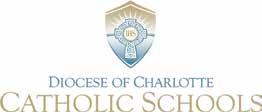


‘Well done, my good and faithful servant.’



MATTHEW 25:21

Congratulations to our beloved seminarians on your recent diaconal and priestly ordinations! We are overjoyed to have played an integral role in your formation as Charlotte’s deacons and priests.
We celebrate with you and look forward to experiencing His strength, wisdom, and inspiration in your faithful and pastoral care.
MAY GOD BLESS YOU AND YOUR MINISTRY TO THE CHARLOTTE DIOCESE!

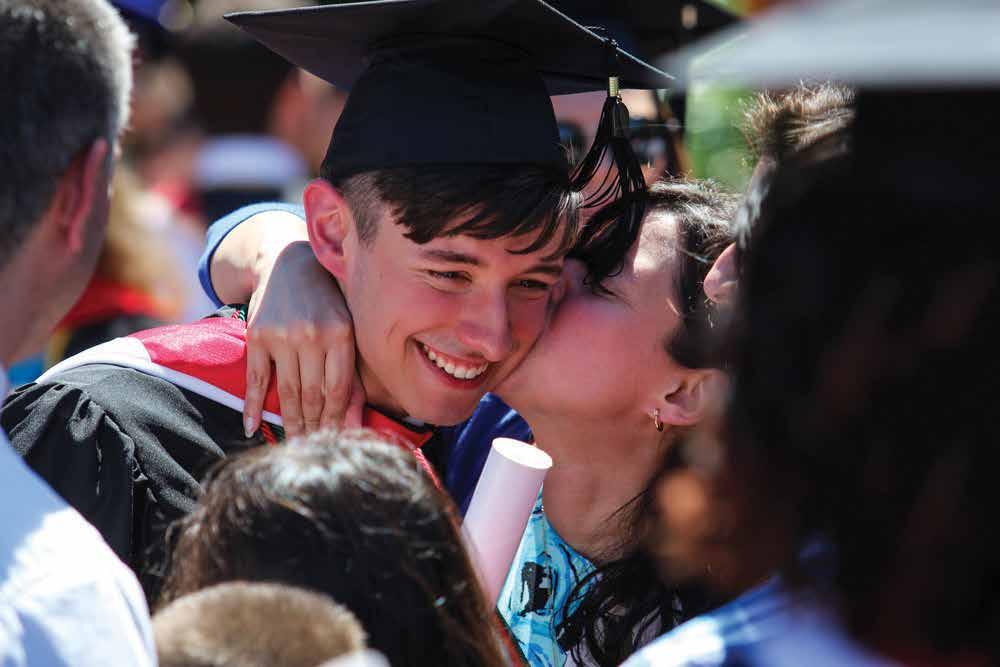
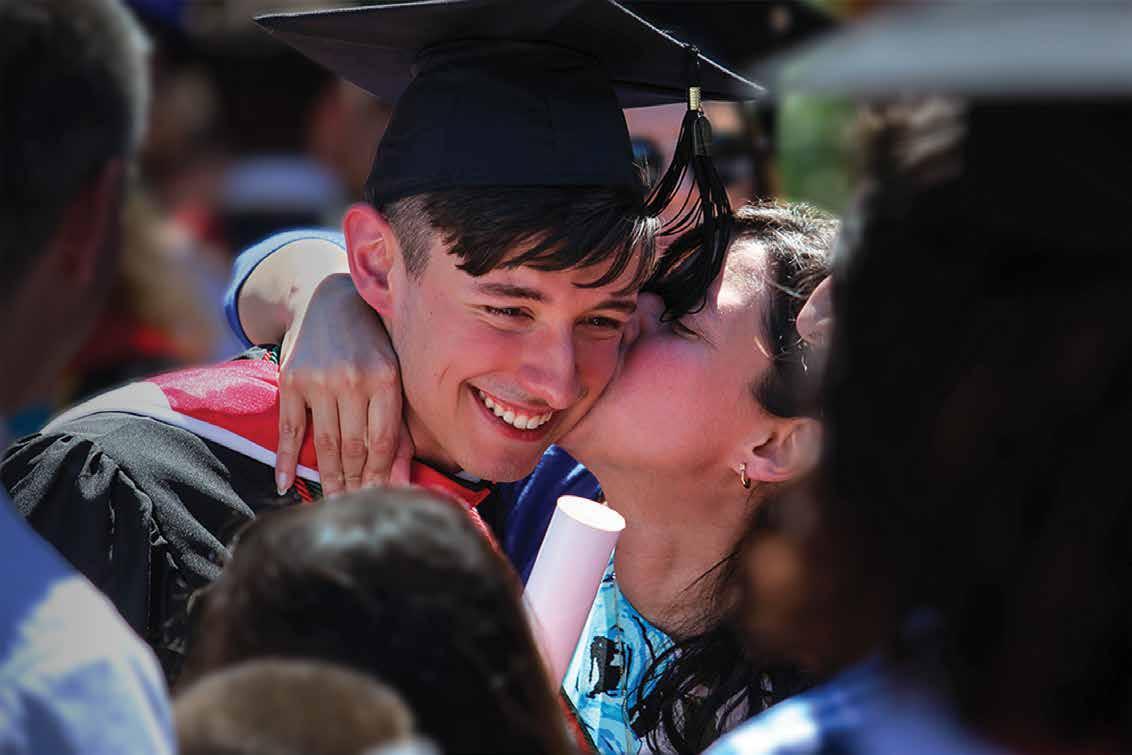
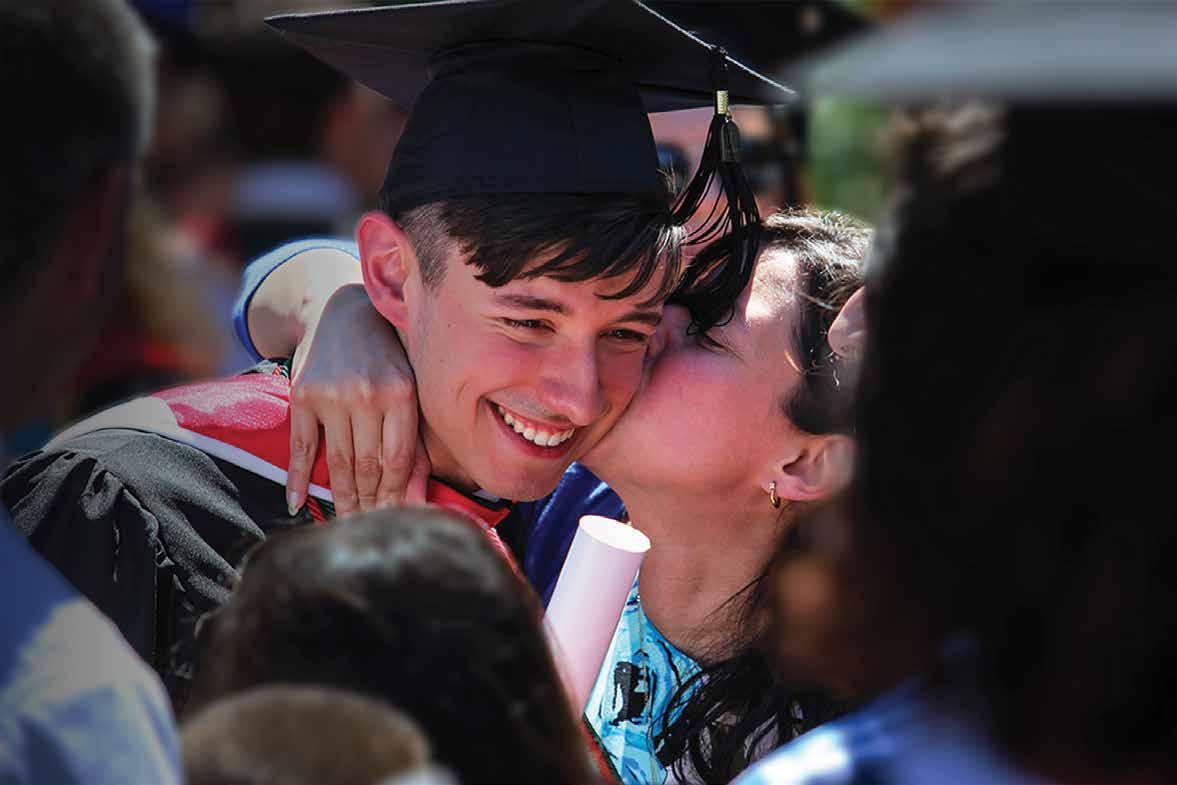
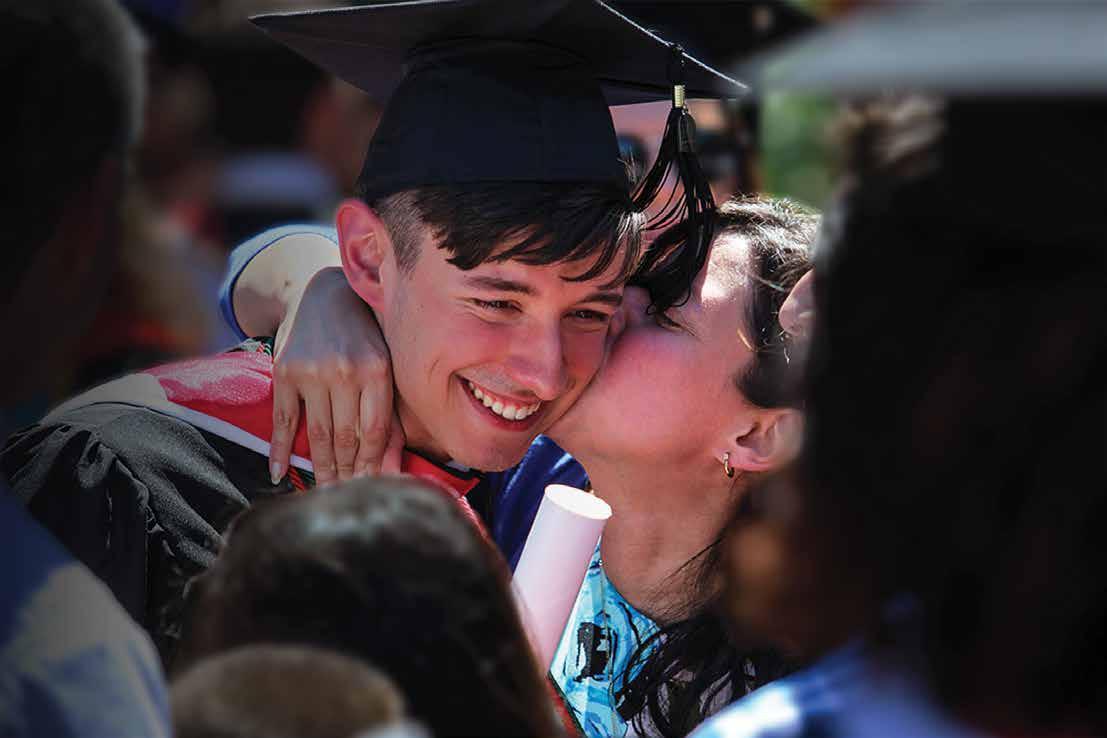
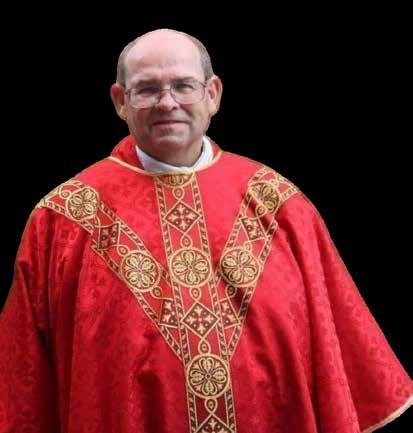
Please pray for the repose of the souls of these clergy and religious who have died since June 2023:
n Father Francis Xavier Arockiasamy: The former administrator of churches in Highlands and Sapphire, as well as chaplain of Bishop McGuinness High School in Kernersville, passed away in Tiruchirappalli, Tamil Nadu, India, aged 58.
n Monsignor Richard Bellow: The former pastor of St. Mark Church in Huntersville, known for his love of the Eucharist, passed away peacefully Nov. 13, 2023. He was 80 years old and had served in priestly ministry for 53 years. As St. Mark’s pastor for nine years, he helped guide the construction of a new church building in 2009 and inaugurated Perpetual Eucharistic Adoration in 2011. The Adoration Chapel was later renamed in his honor. He was also known for staying active long after he retired in 2013, serving at St. Mark School, visiting the sick, and offering Mass at senior living communities.
n Father Brian Cook: The retired pastor of St. Leo the Great Parish in Winston-Salem died peacefully Nov. 18, 2023. He was 67 and had served as a priest for nearly 38 years. He devoted much of his life to working with the sick, first in healthcare and later as a priest. Inspired to a priestly vocation by Bishop William Curlin, he came to the Diocese of Charlotte in 2002 at thenBishop Curlin’s invitation. He also served at Holy Family Parish in Clemmons and on the Board of Directors for Catholic Charities Diocese of Charlotte.
n Sister Eileen McLoughlin, MSBT: The retired drug/alcohol counselor who was professed with the Missionary Servants of the Most Blessed Trinity, passed away peacefully Nov. 12, 2023, at the age of 94. For more than 30 years, she counseled people in need – alcoholics, addicts, people grieving the loss of a loved one, and many others desperately searching for help – sharing the healing power of hope and the message that God loves them.
n Deacon Guy A. Piché: The Diocese of Charlotte’s longtime properties director and deacon of St. Helen Mission in Spencer Mountain passed away peacefully April 14, 2024, at his home. He worked as an accounting professional and later served as director of the Catholic Conference Center in Hickory and as diocesan properties director, retiring in 2014. He also served as a volunteer for a variety of organizations, including the Knights of Columbus and the Belmont Rescue Squad. He was 76.
n Mercy Sister Rosalind Picot: The education leader and former principal of Charlotte Catholic High School passed away at Sacred Heart Convent on May 25, 2024. She was 90. A Sister of Mercy for 69 years, Sister Rosalind was an outstanding administrator and leader who empowered people to grow and expand their vision of life and service.
n Father James M. Turner, OSFS: The beloved former pastor of Our Lady of the Highways Parish in Thomasville passed away at the age of 72 on April 16, 2024, after a long battle with ALS. He was a professed member of the Oblates of St. Francis de Sales for 51 years and a priest for 43 years.
— Catholic News Herald
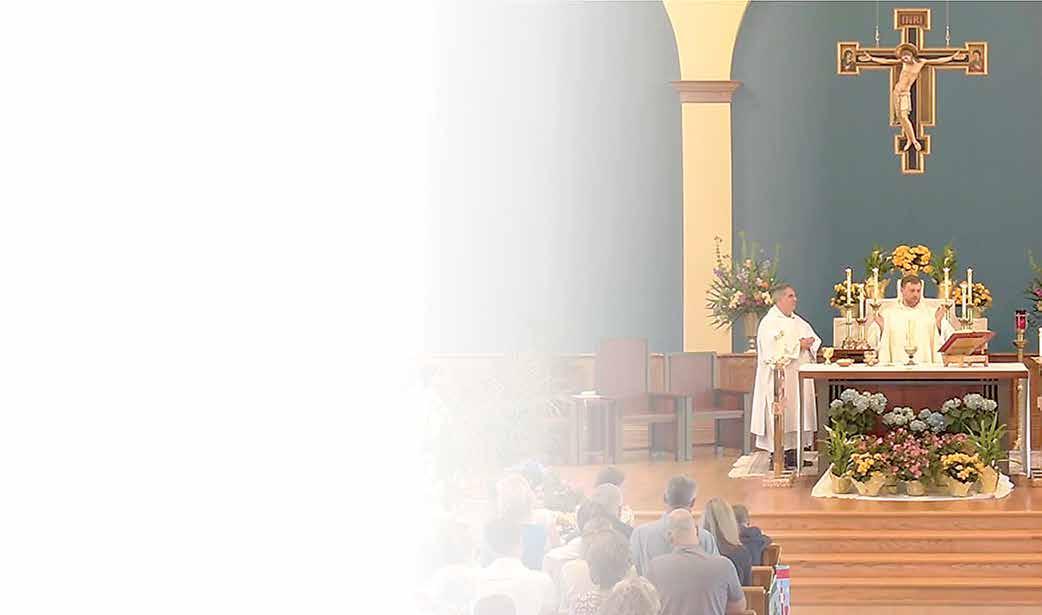
10TH ORDINATION ANNIVERSARY OF
FRIDAY, JUNE 28, 2024
The parishioners of Queen of the Apostles with gratitude and thanksgiving to God for the 10th Anniversary of Rev. Paul Buchanan to the sacred Priesthood!
Congratulations from the parish and your fellow Knights of Council 11076 members to our Worthy Chaplain!
The parish will be celebrating Father Paul’s Anniversary after the 11:15am Mass on June 30, 2024!
~ For many more years! ~
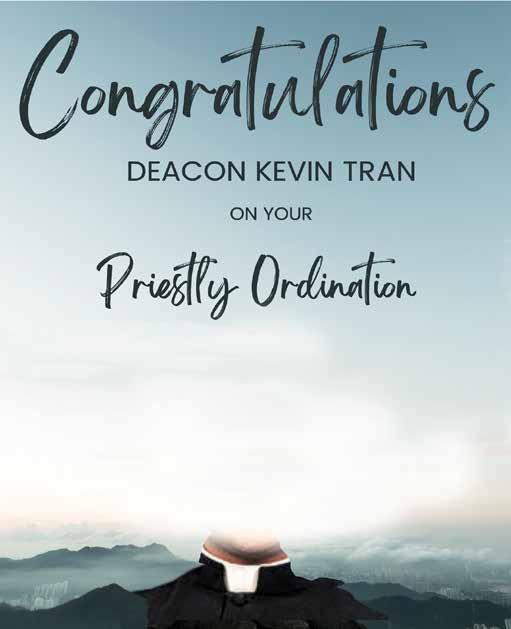

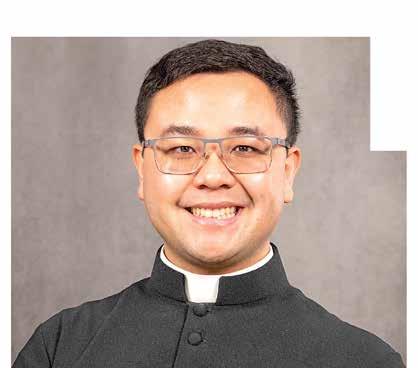

THE PARISH OF ST. ANN FATHER TIMOTHY S. REID OUR PASTOR ON HIS 20TH ANNIVERSARY OF ORDINATION TO THE PRIESTHOOD.
OFFERS WITH JOYFUL GRATITUDE CONGRATULATIONS TO
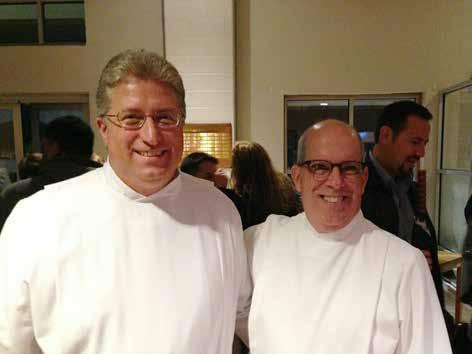

Deacon Jack Staub and Deacon Gary Schrieber on the ten year anniversary of their ordination to the deaconate. God bless you both! TO ON HIS 10TH ANNIVERSARY OF ORDINATION TO THE DEACONATE.
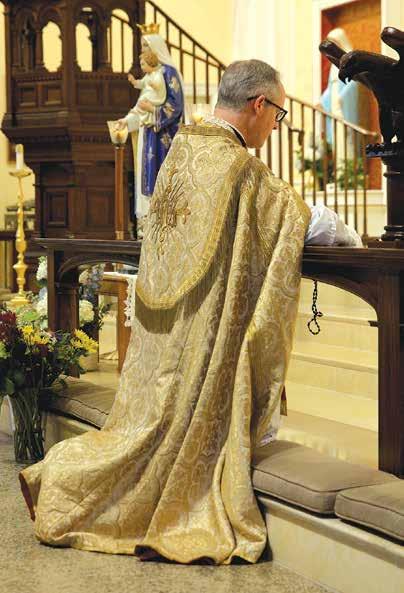
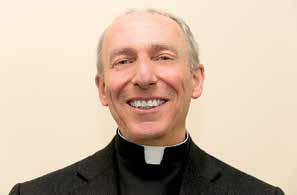

WITH BEST WISHES AND PRAYERS FROM THE PARISHIONERS AND STAFF.
